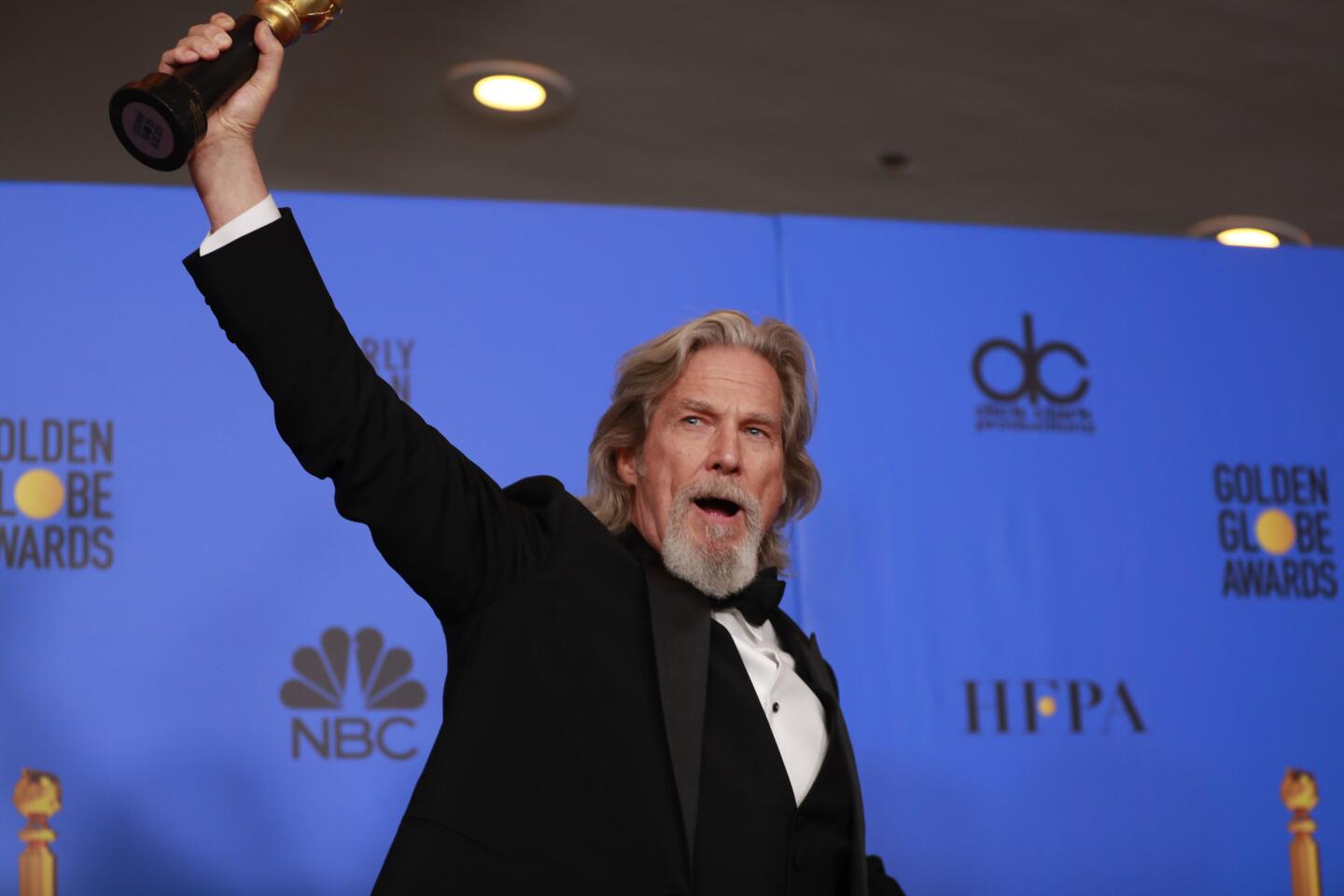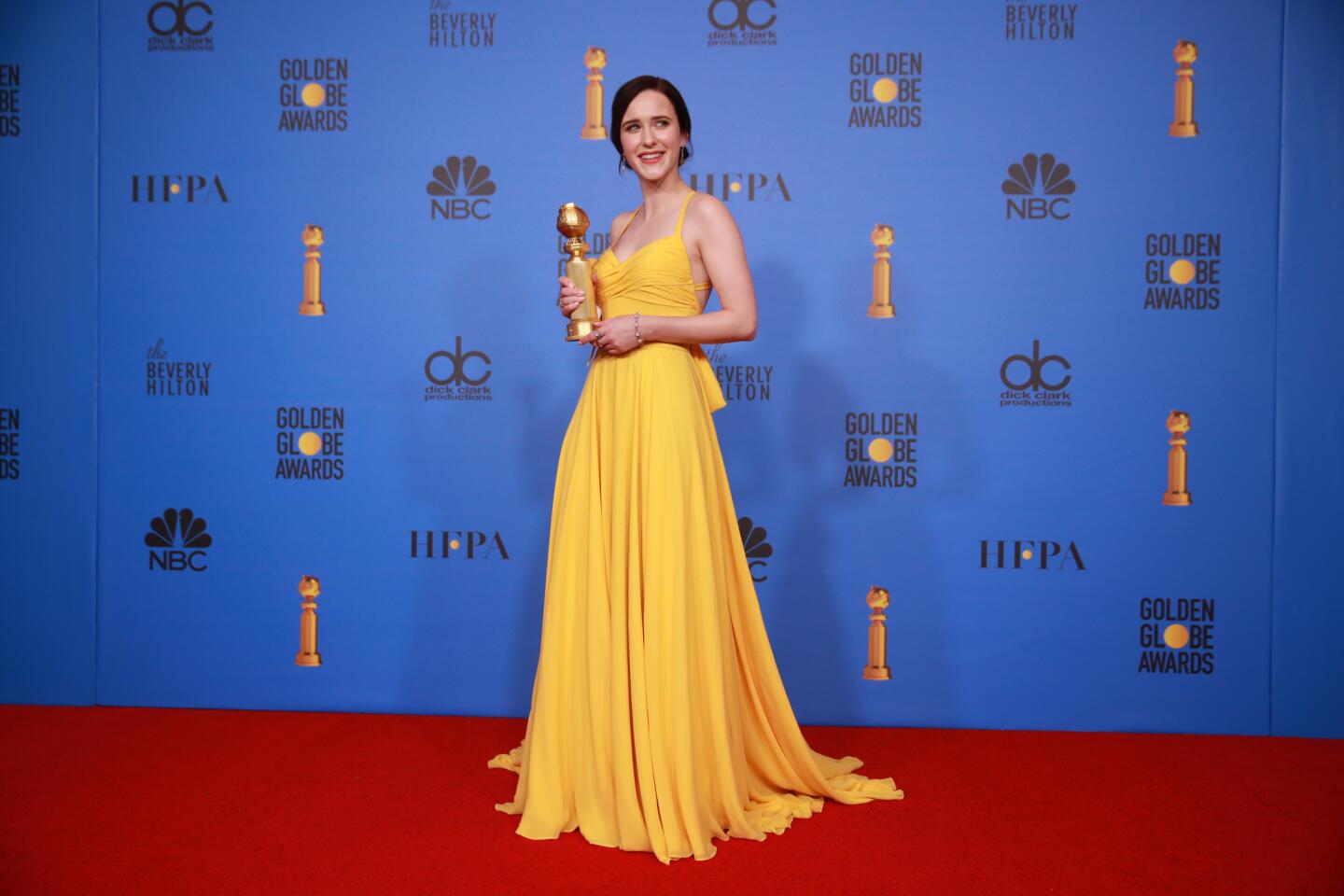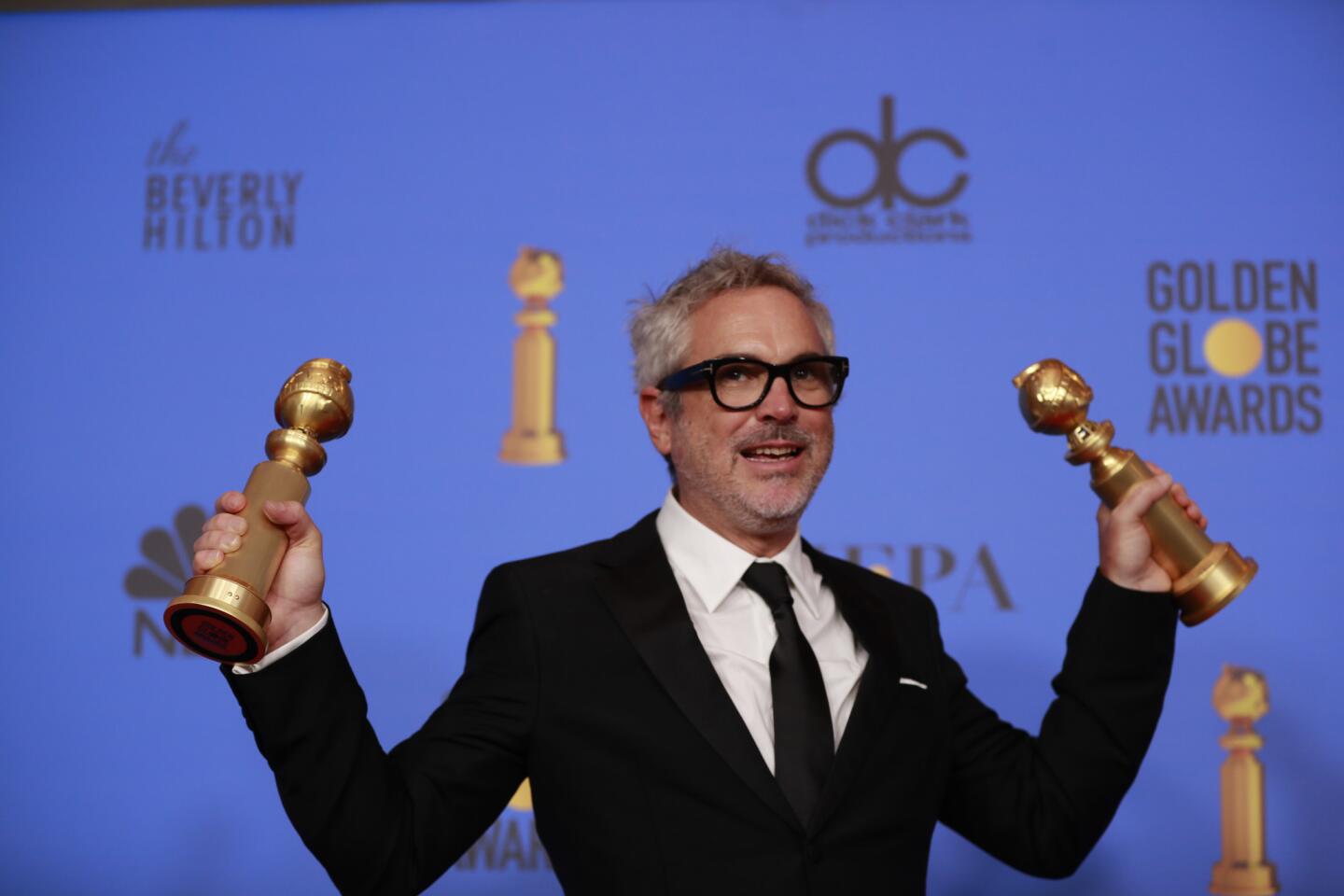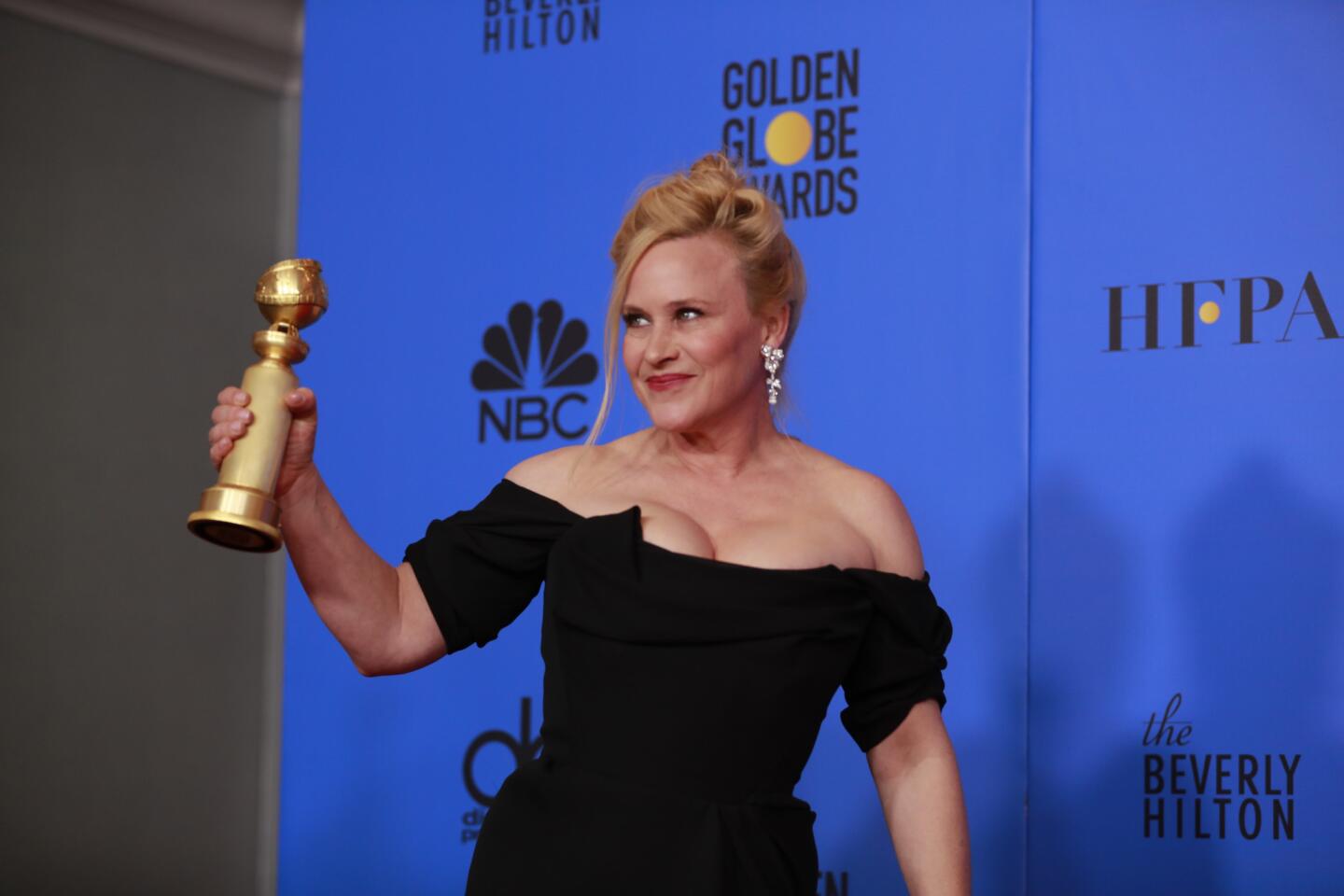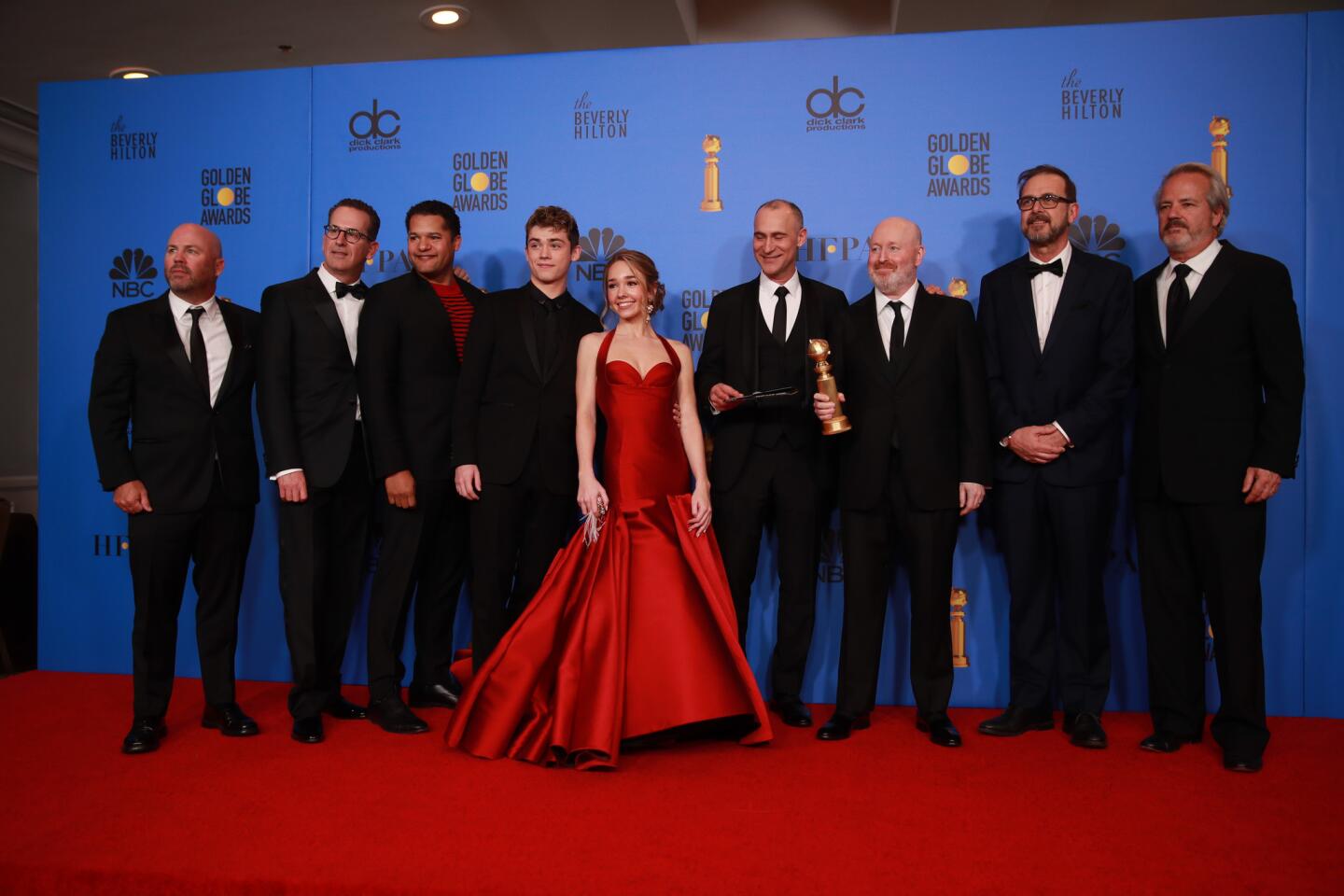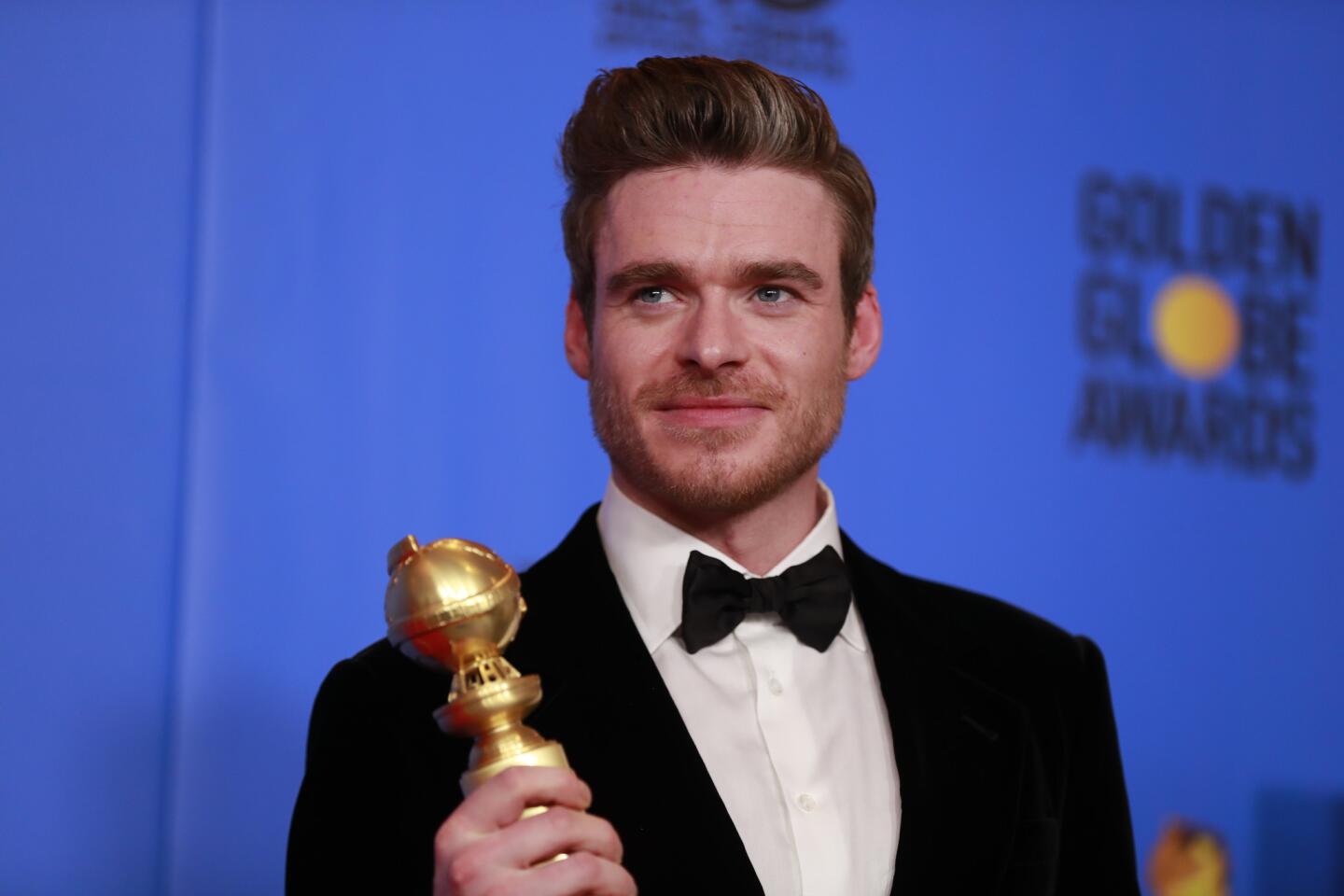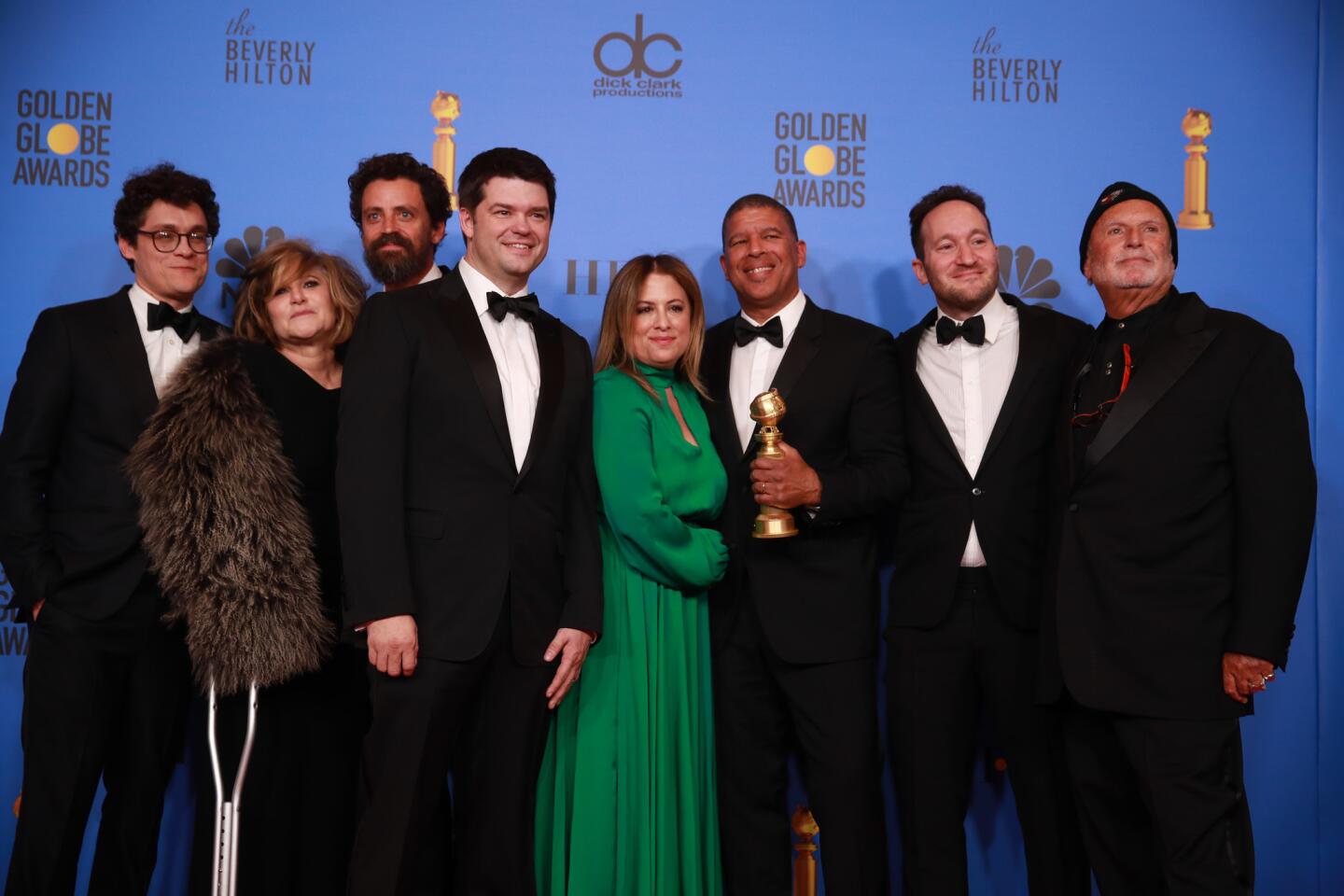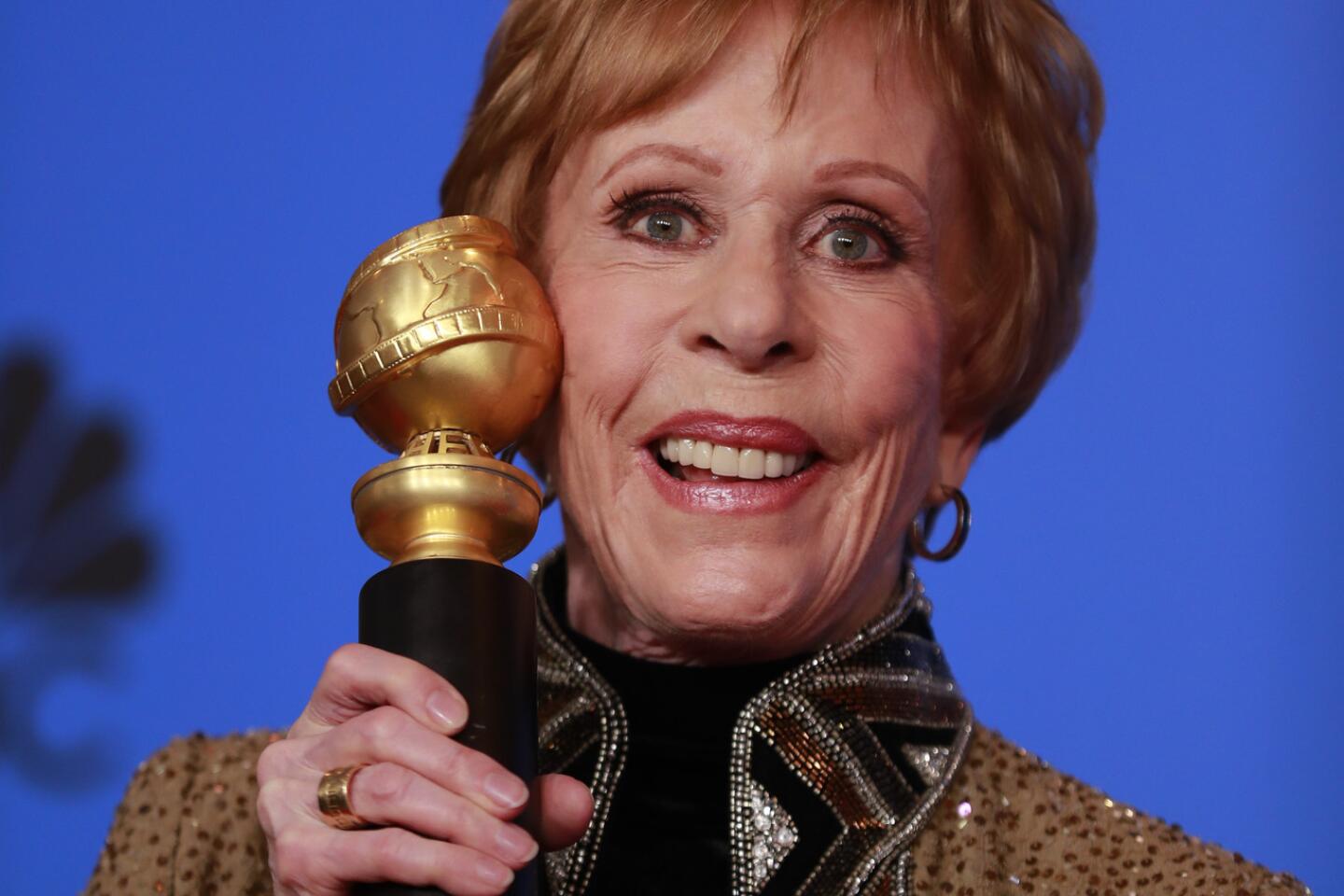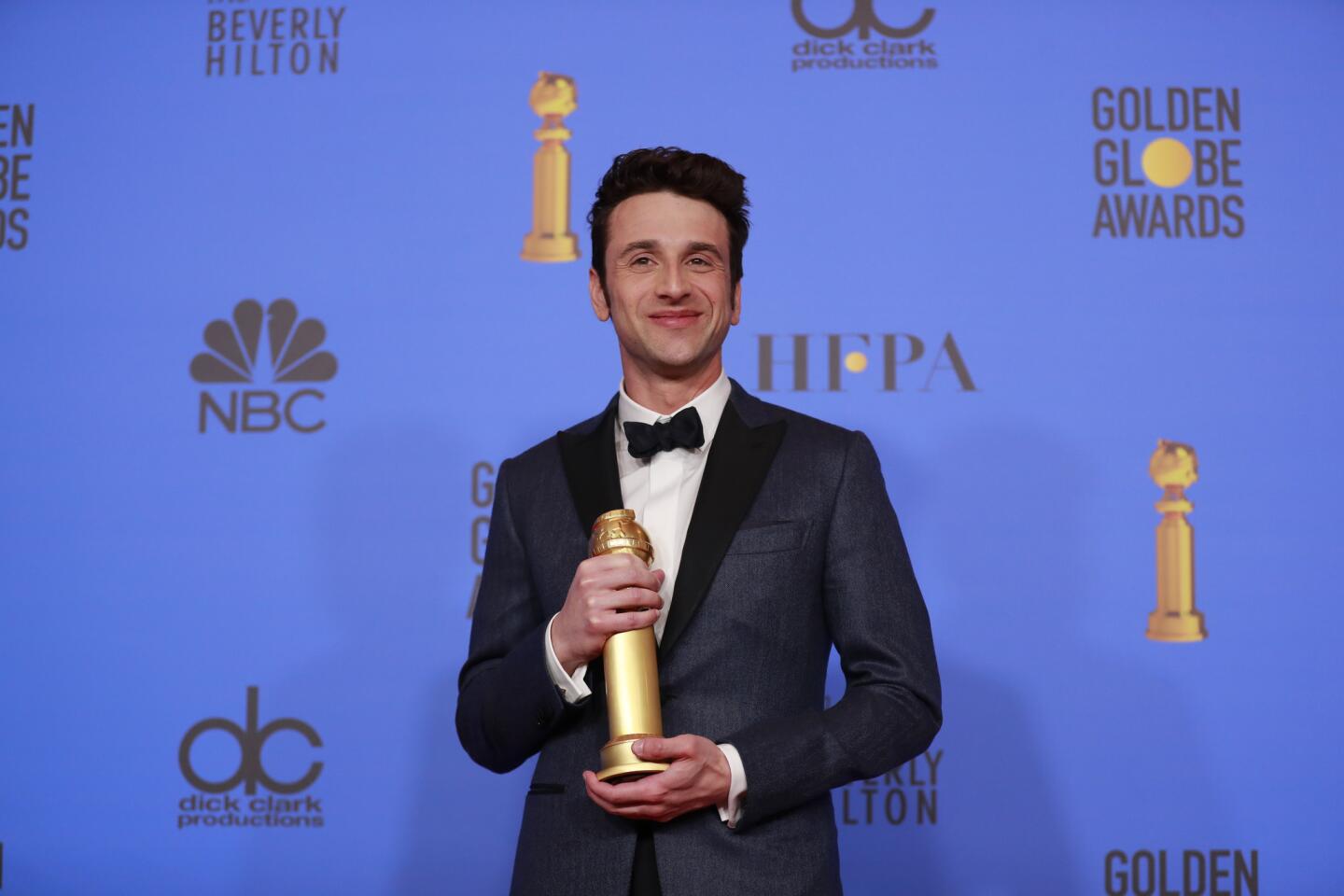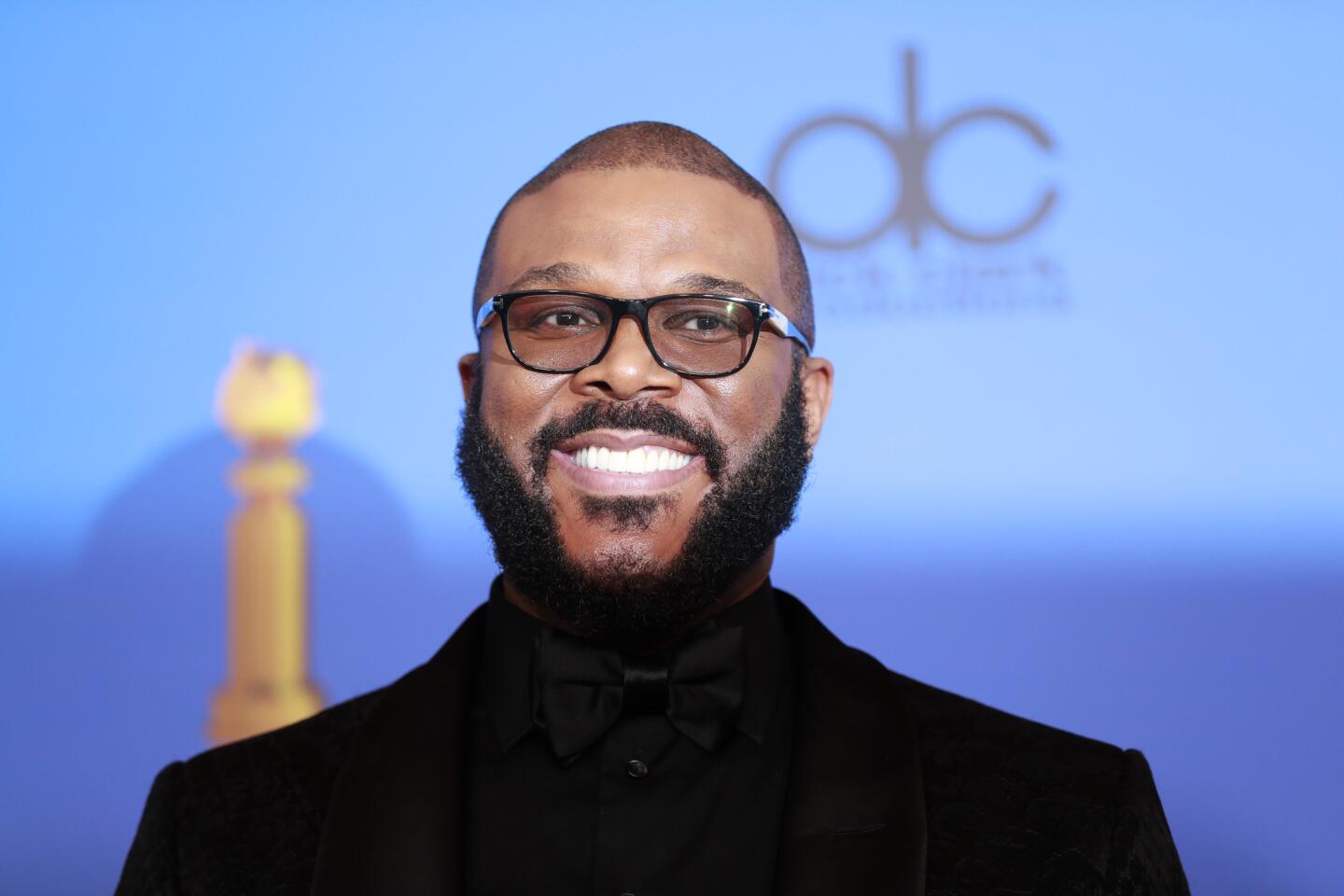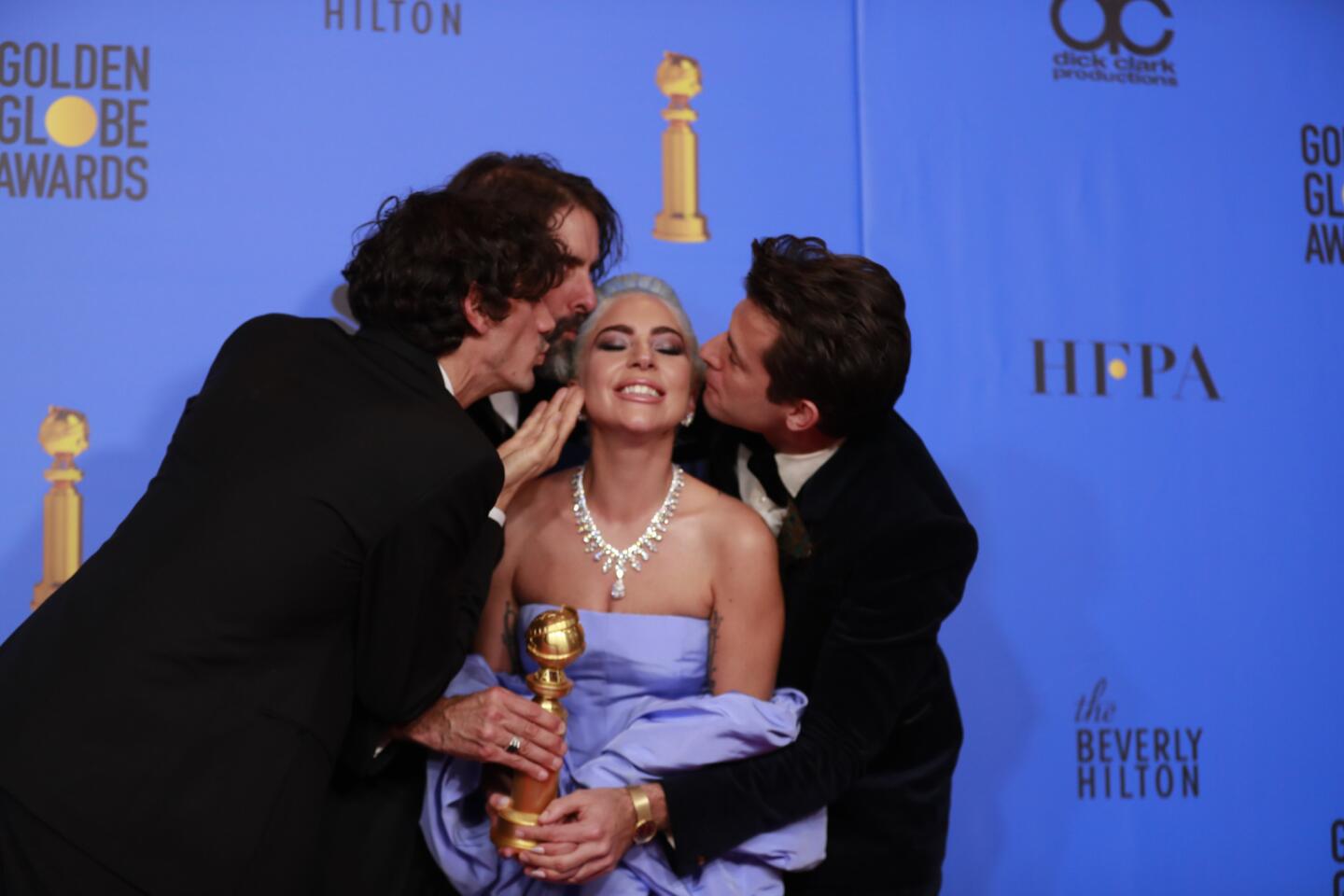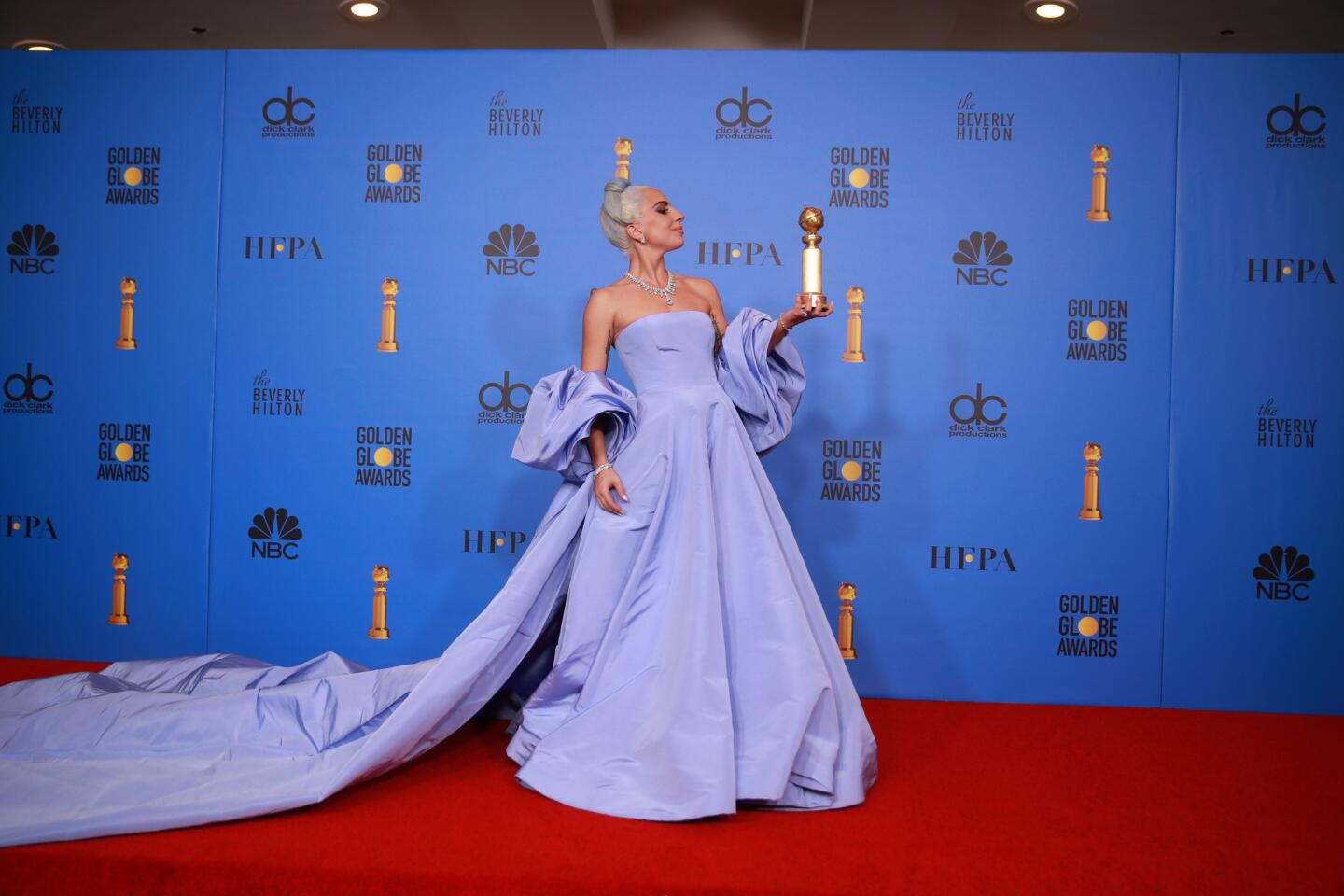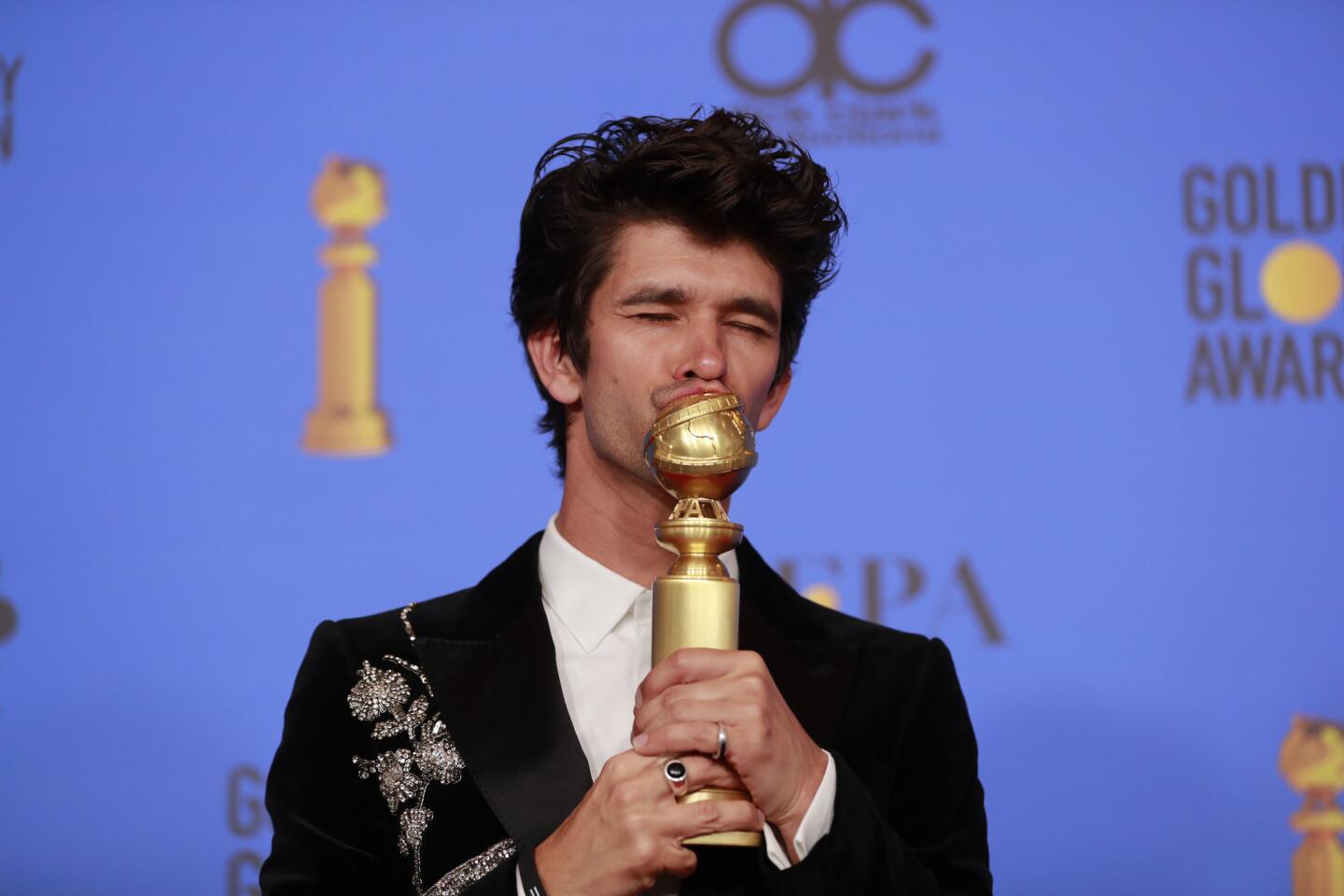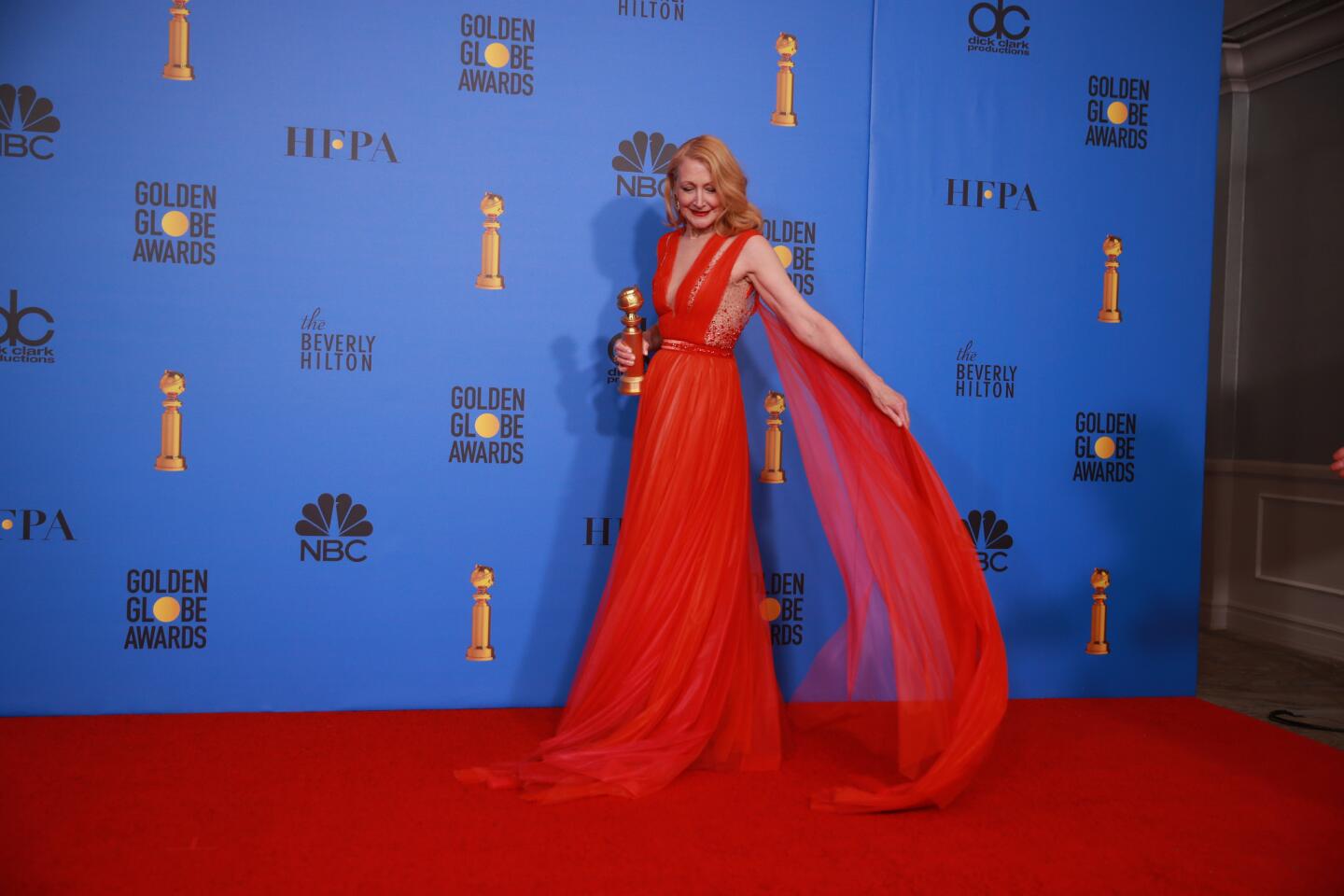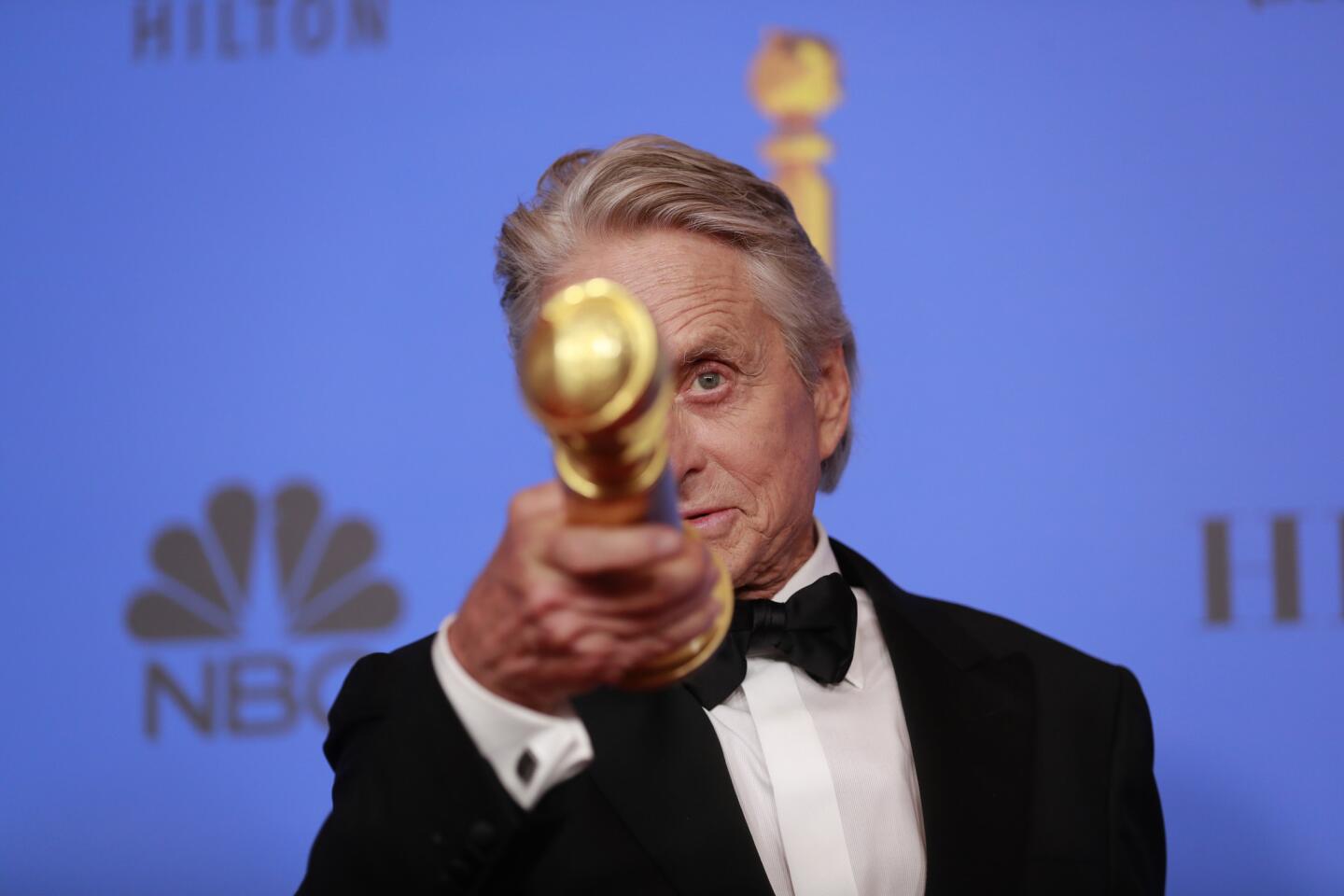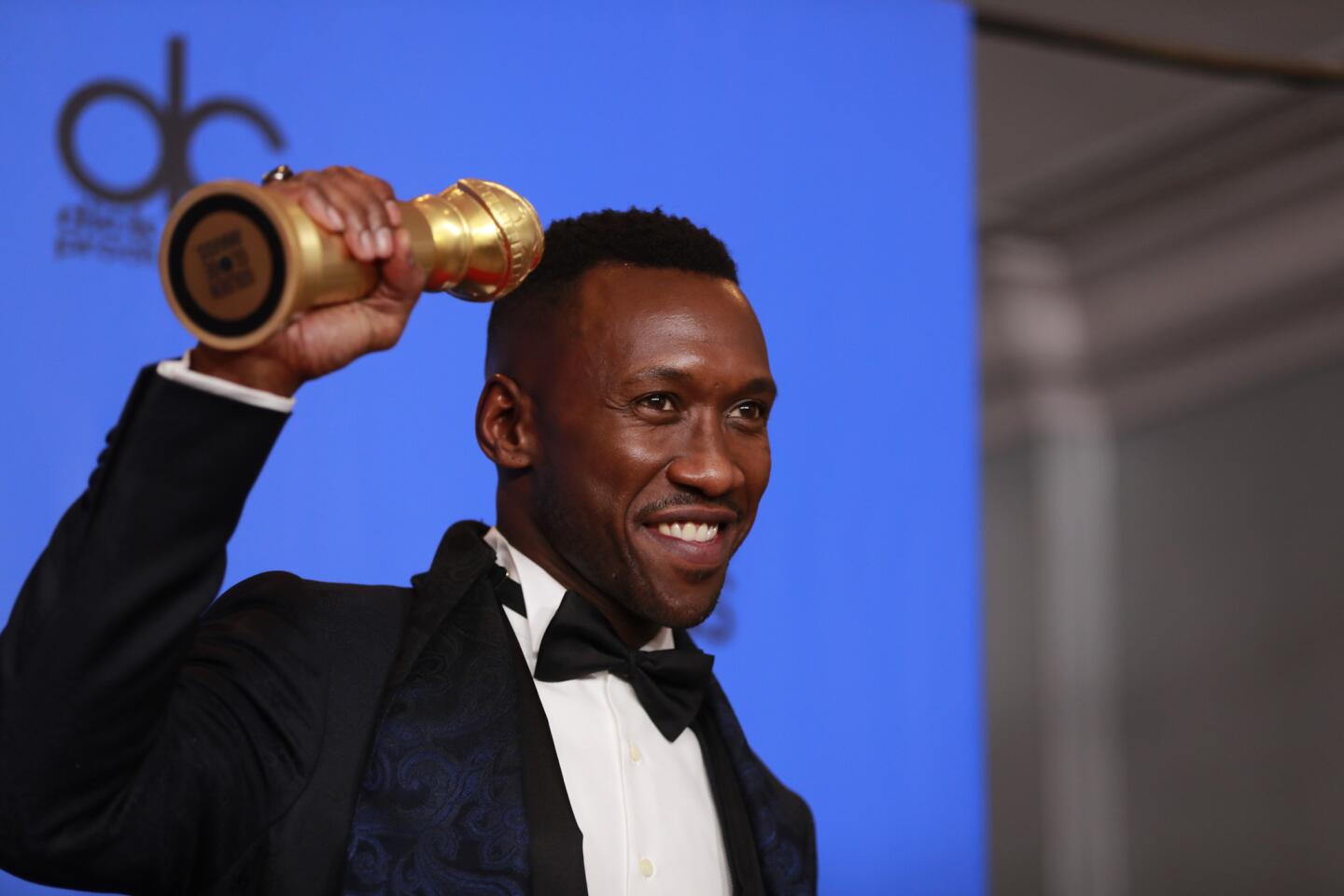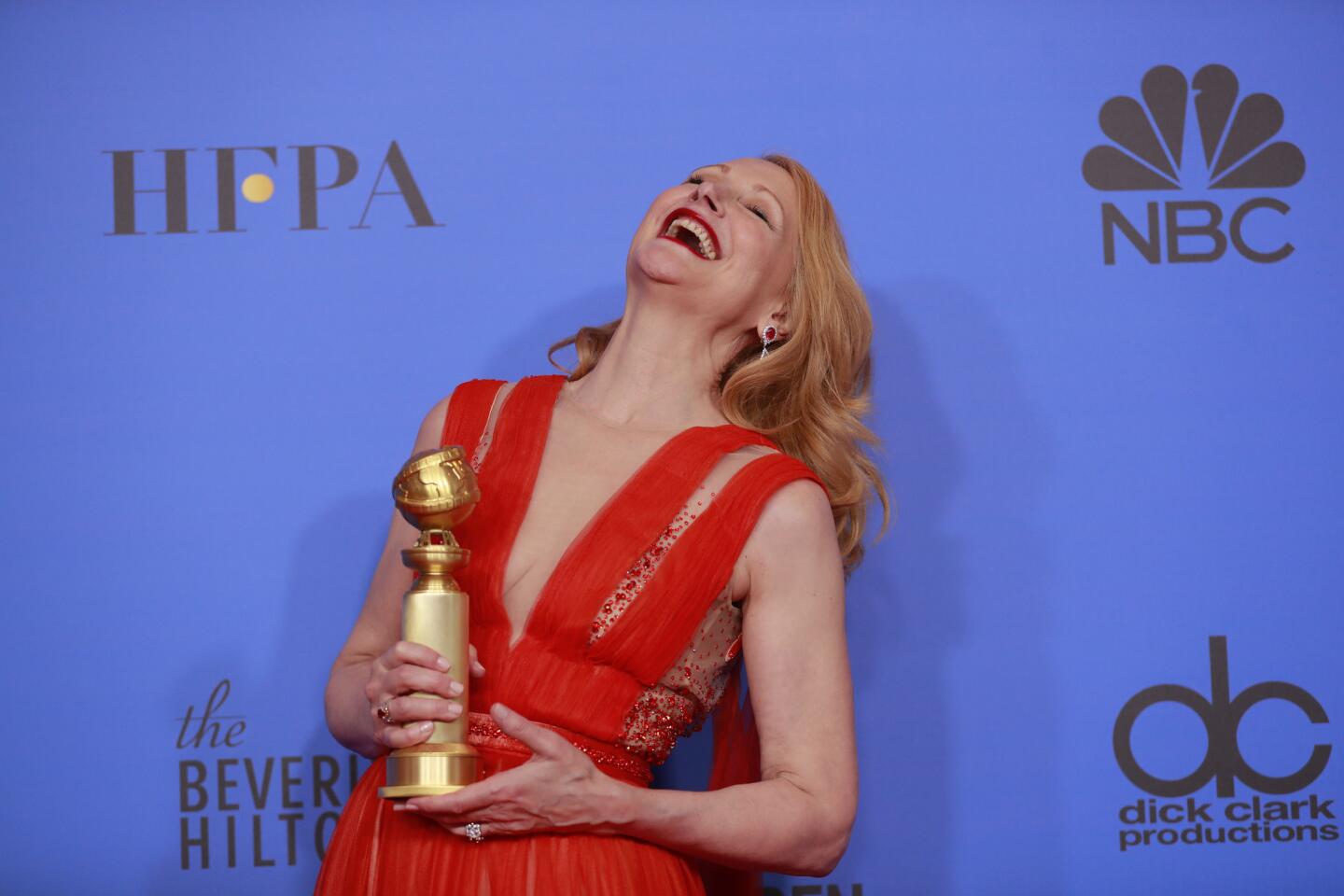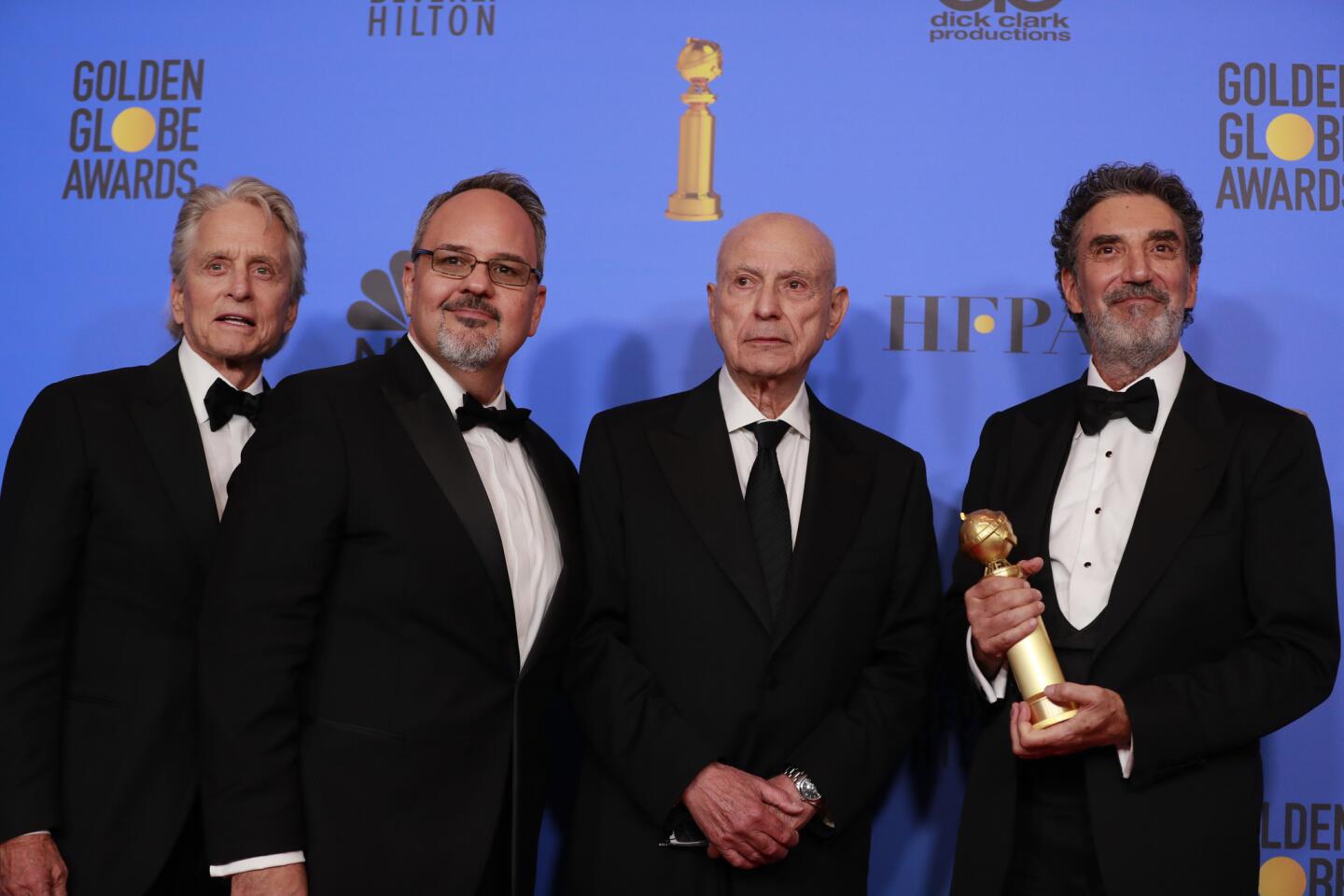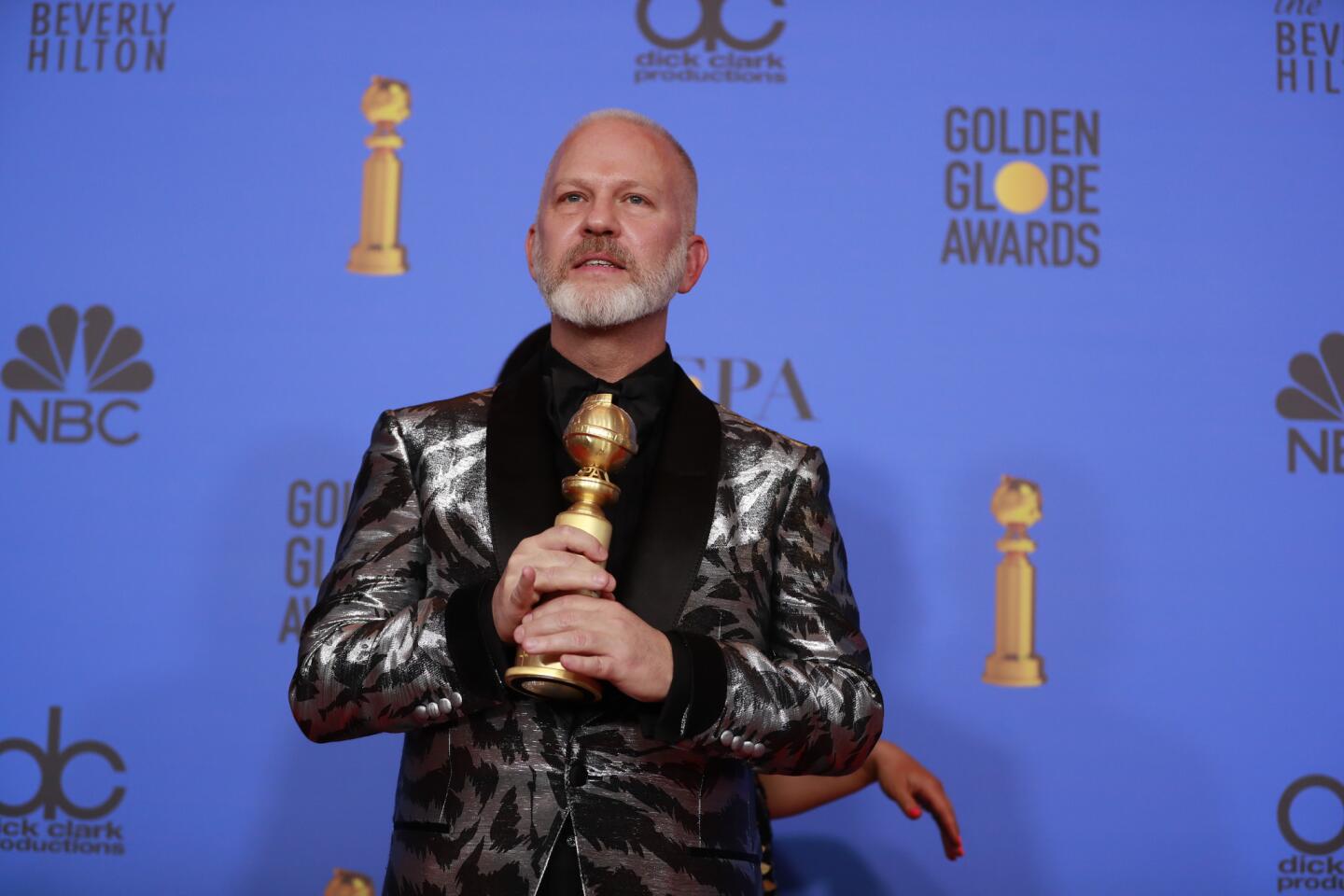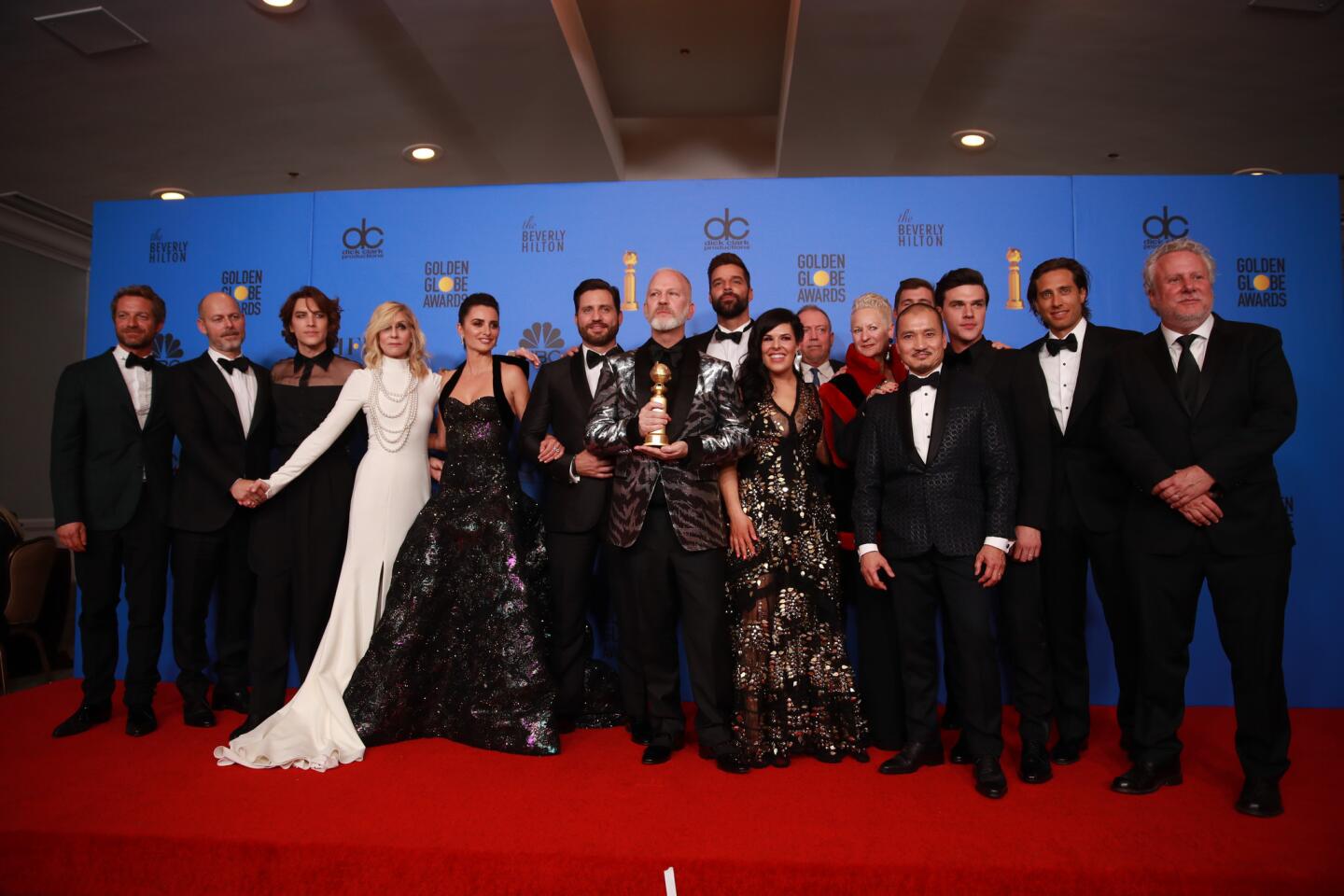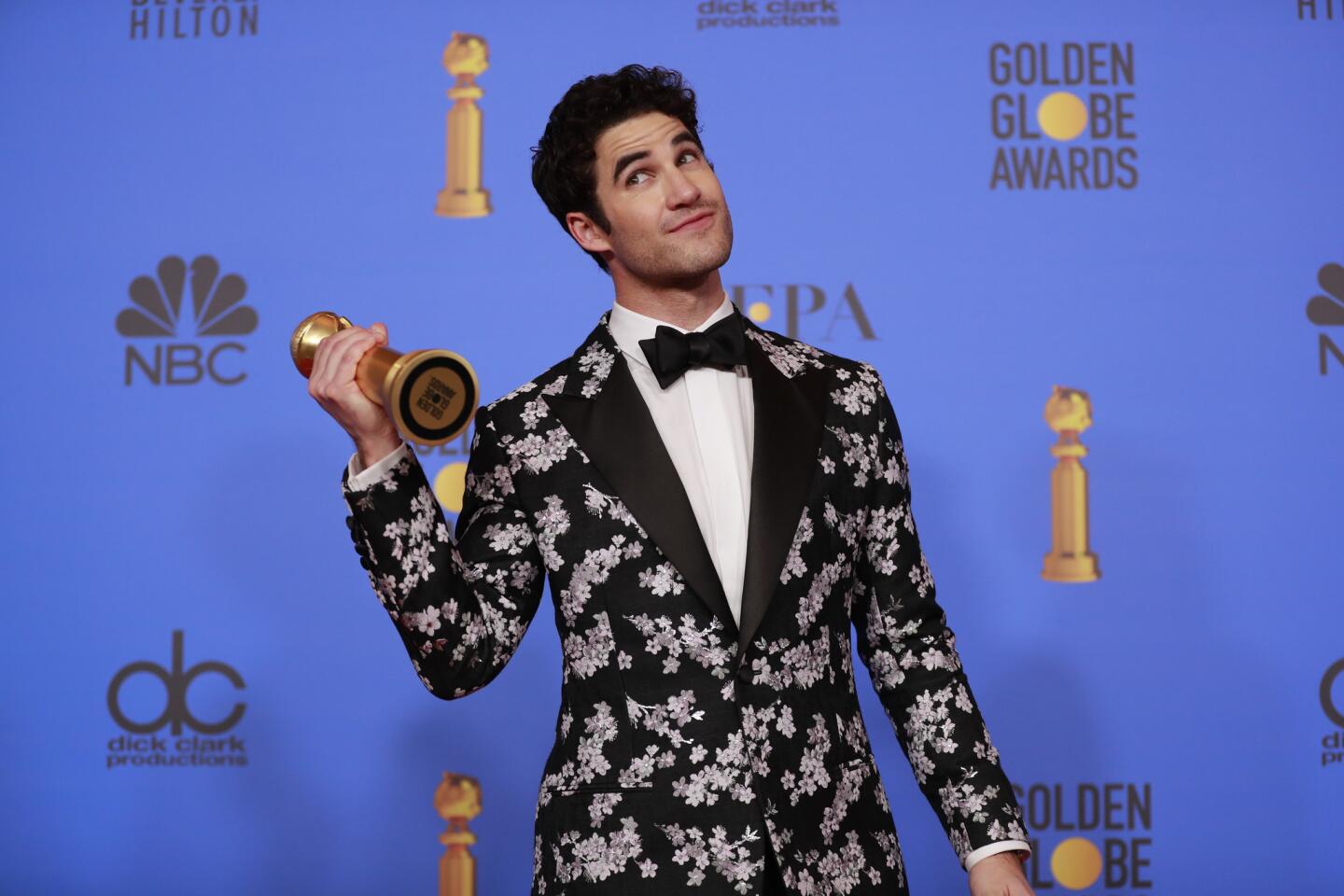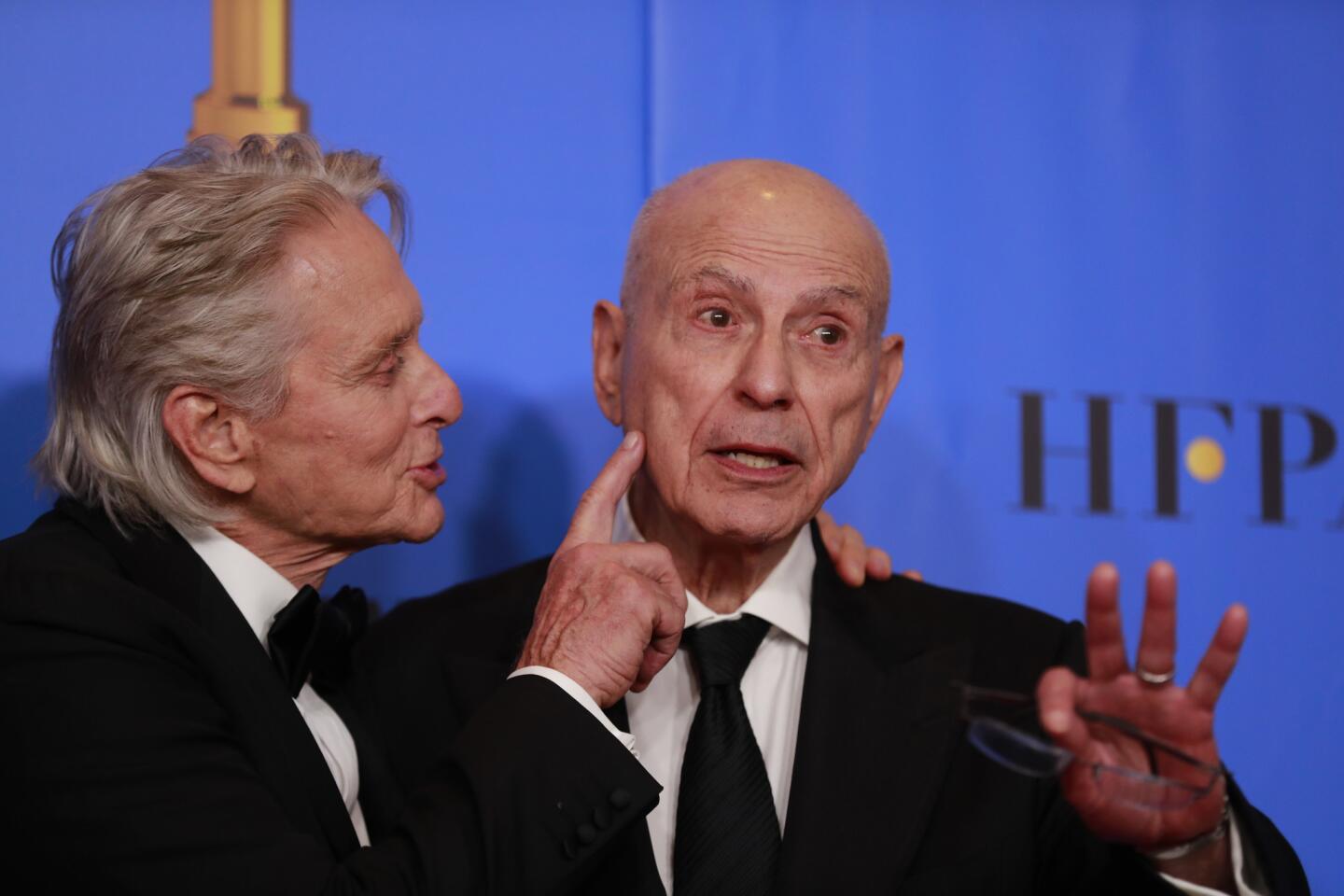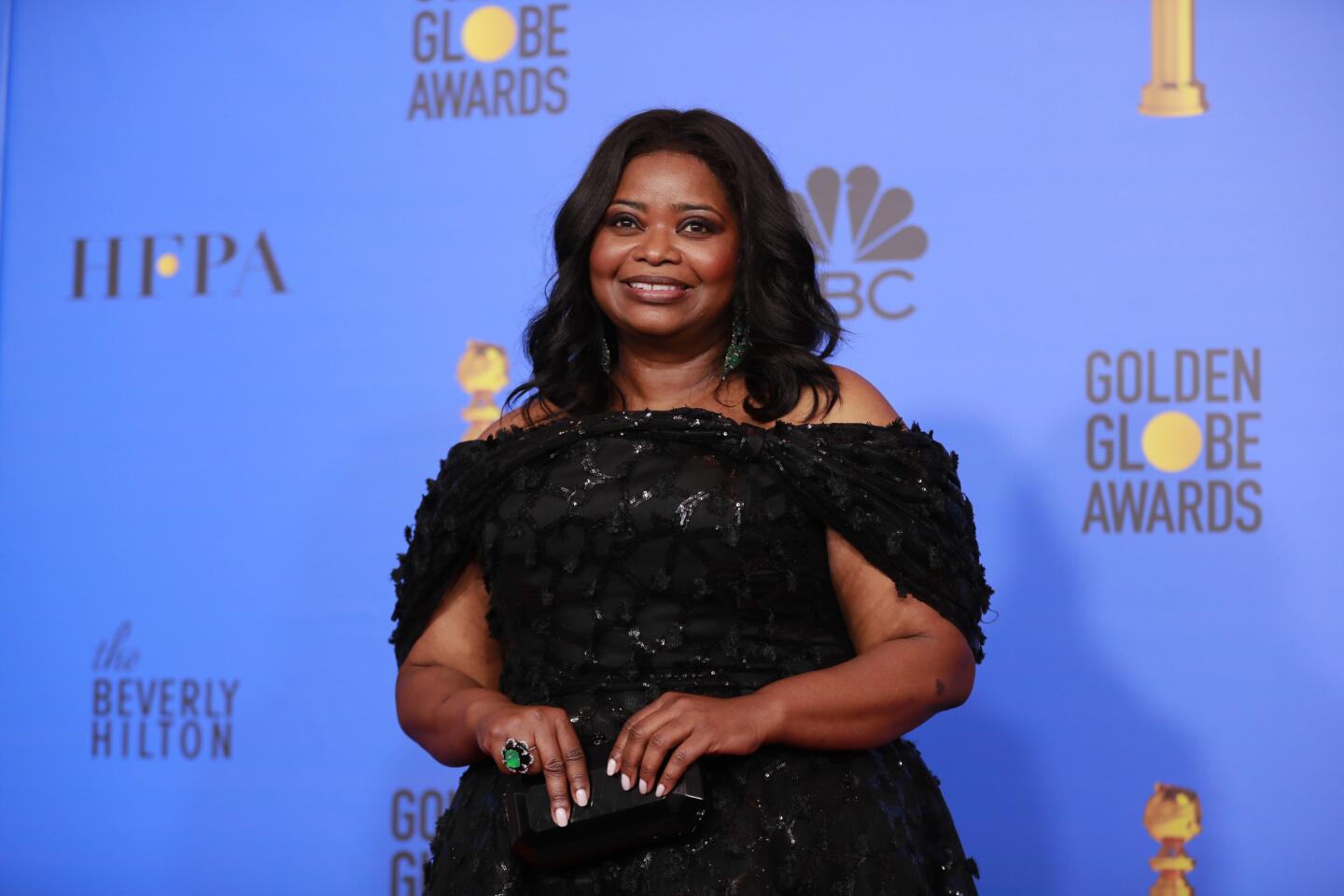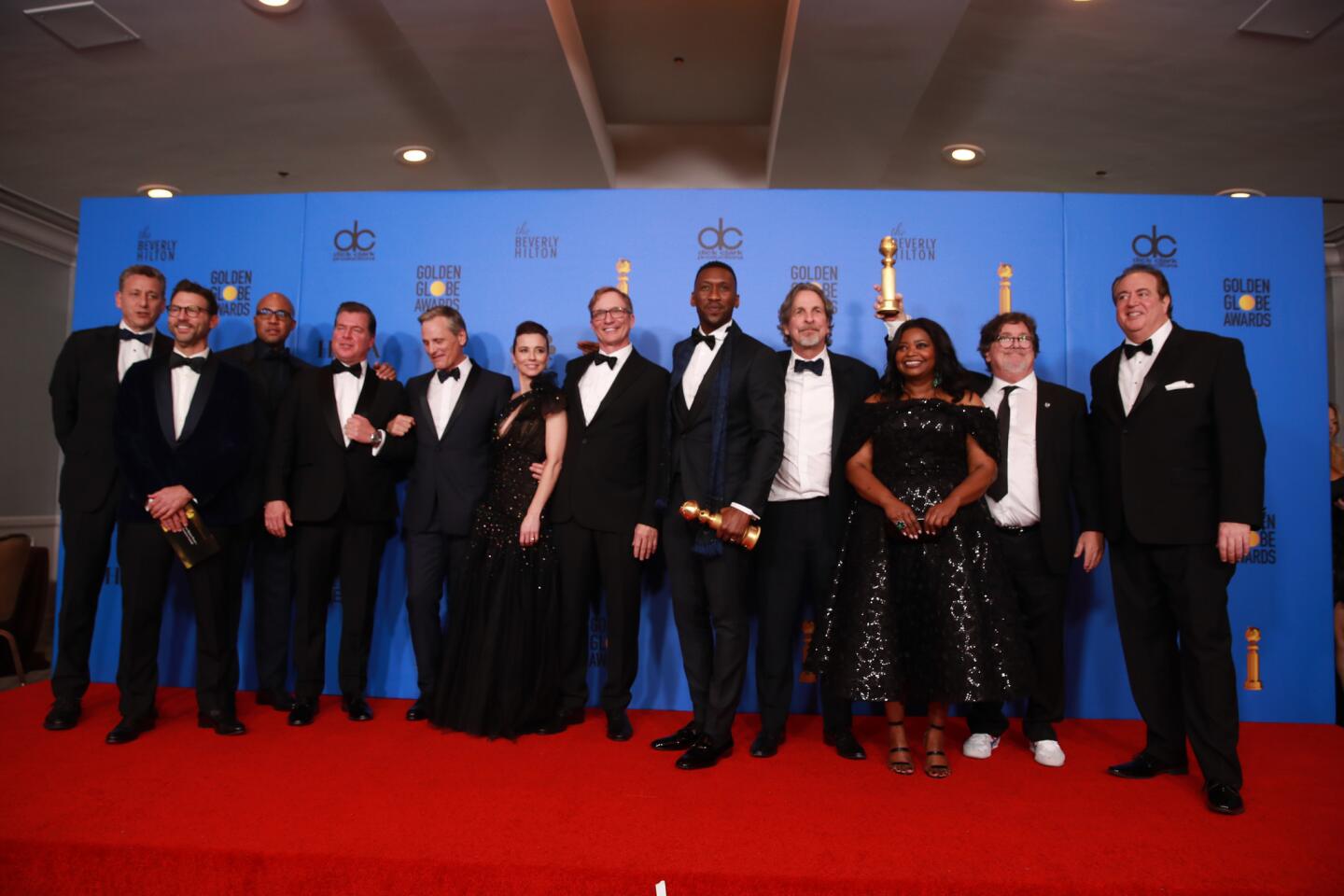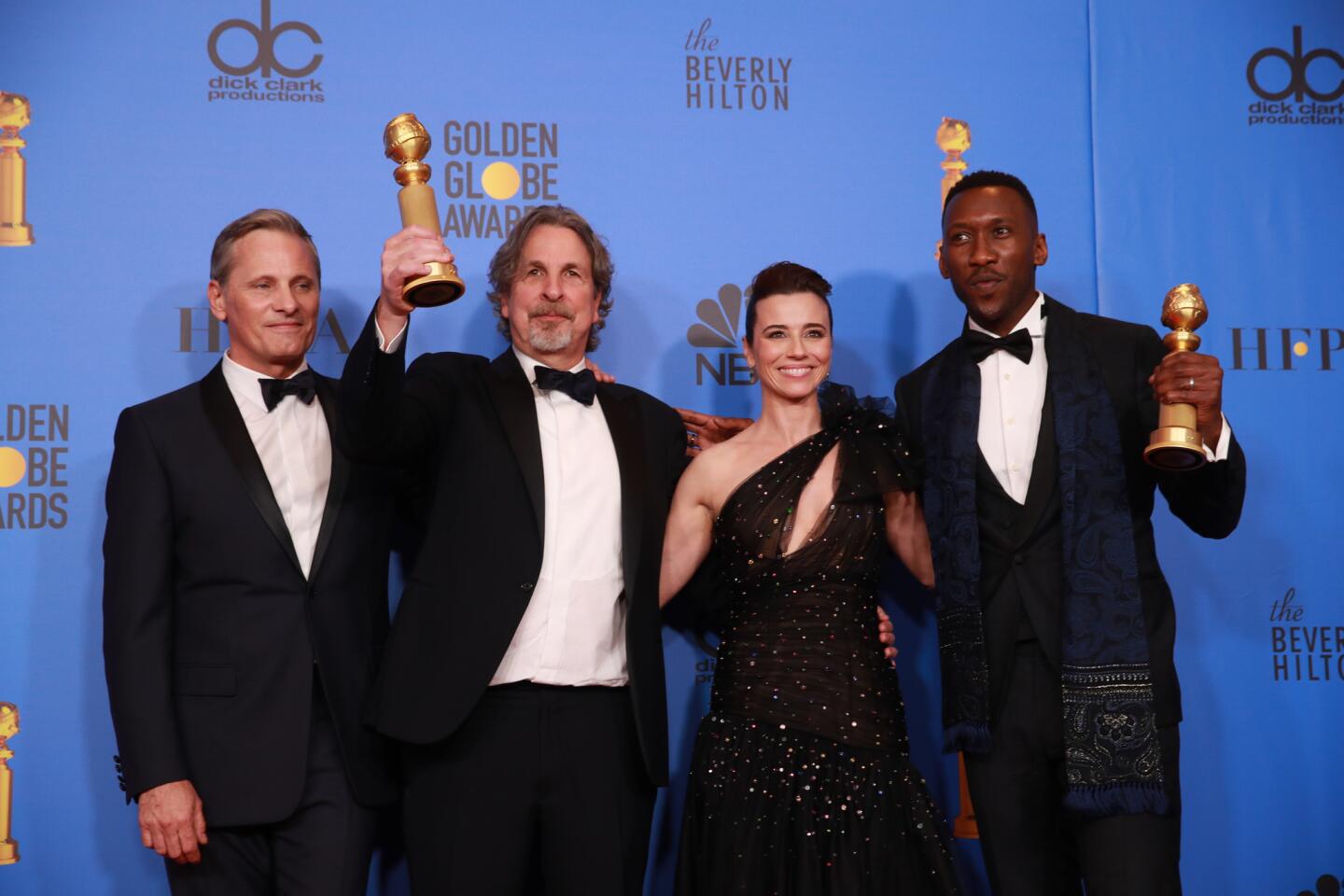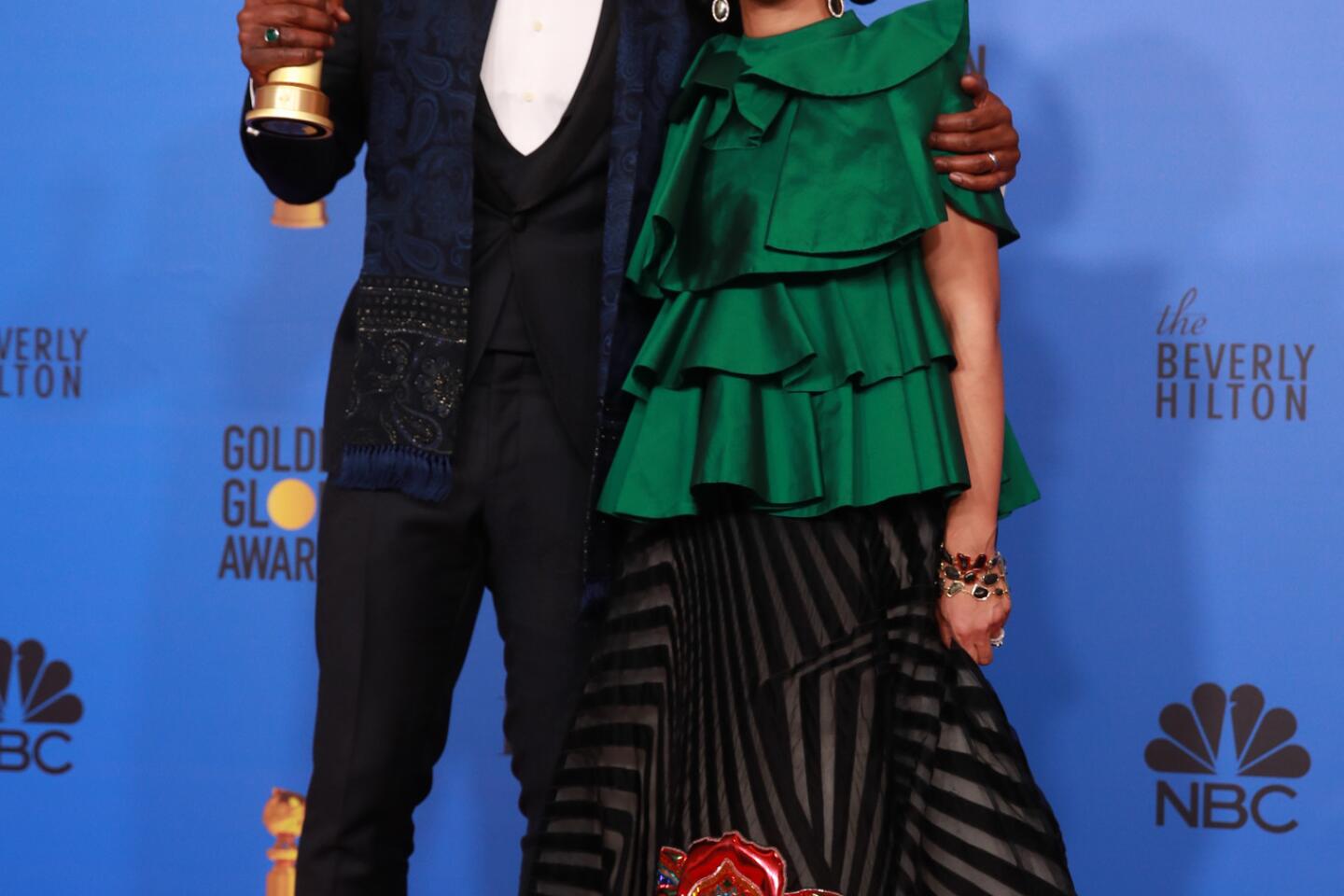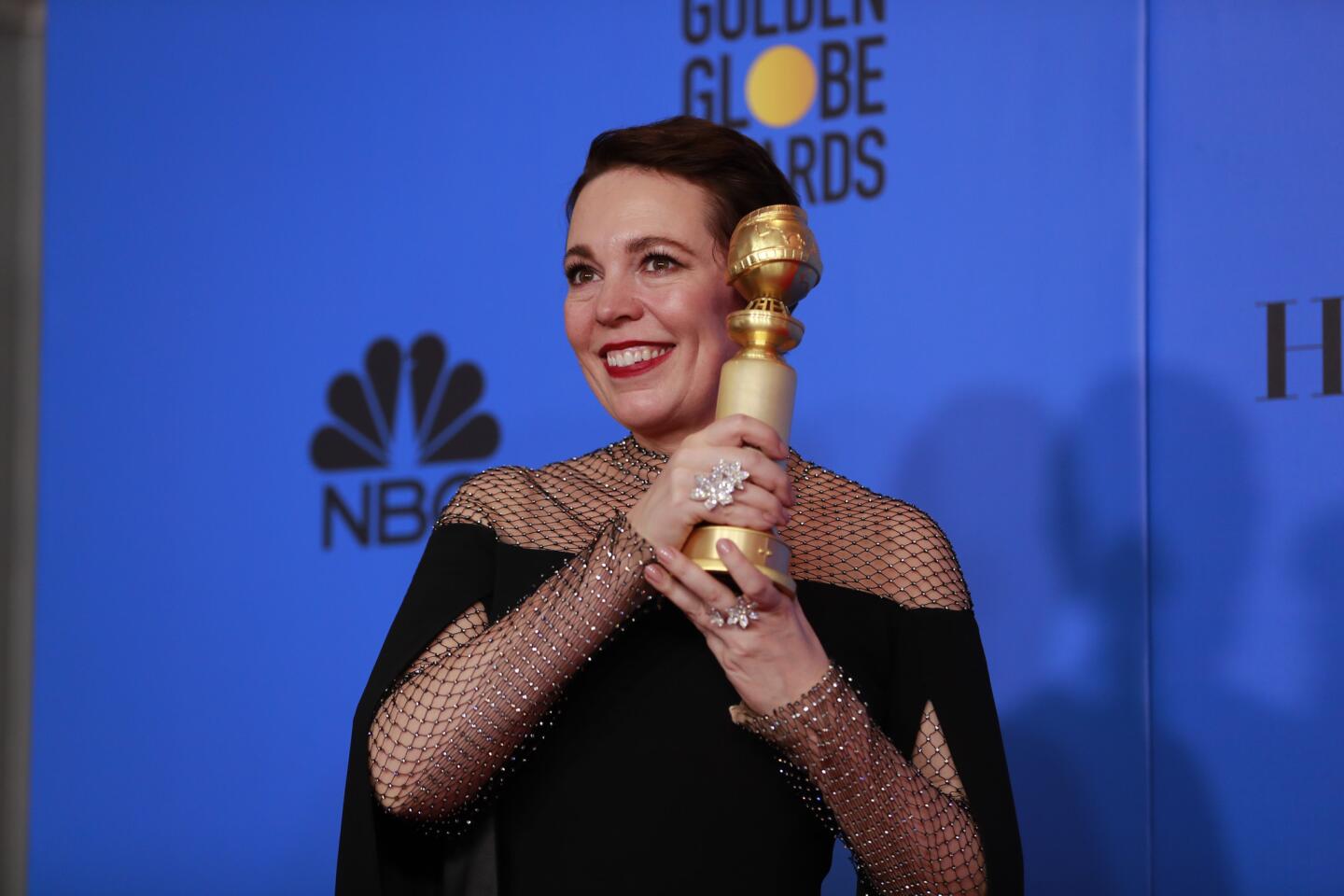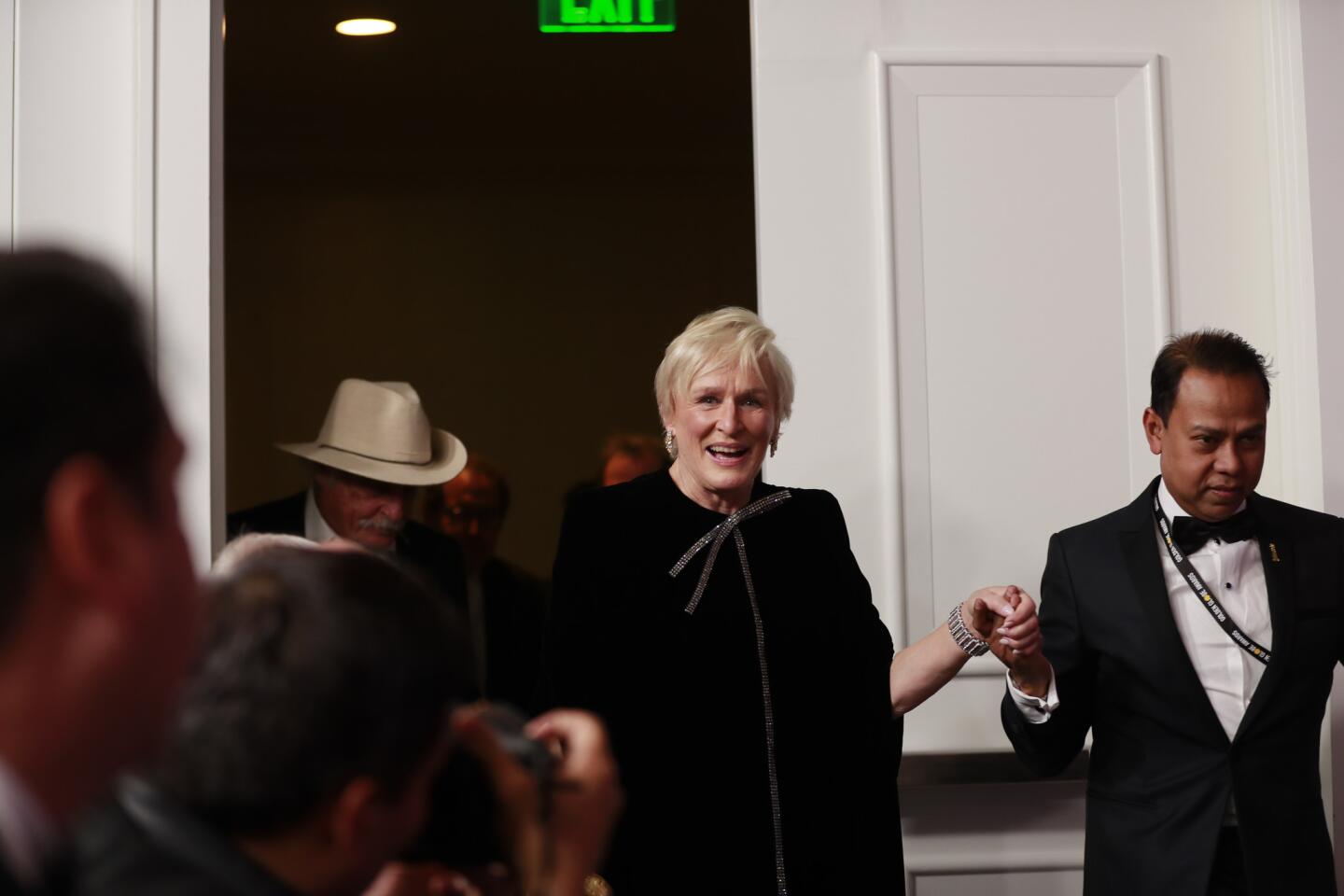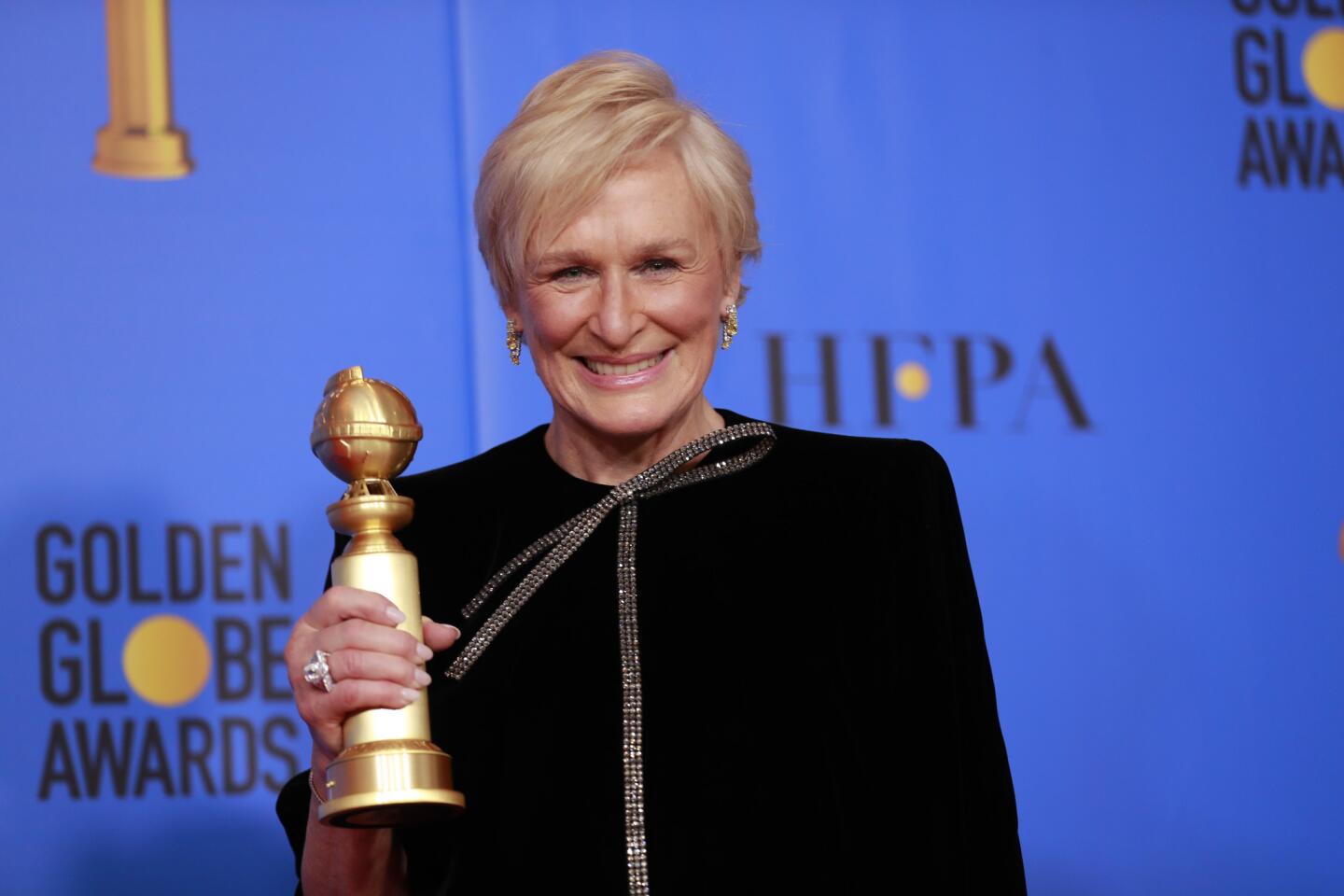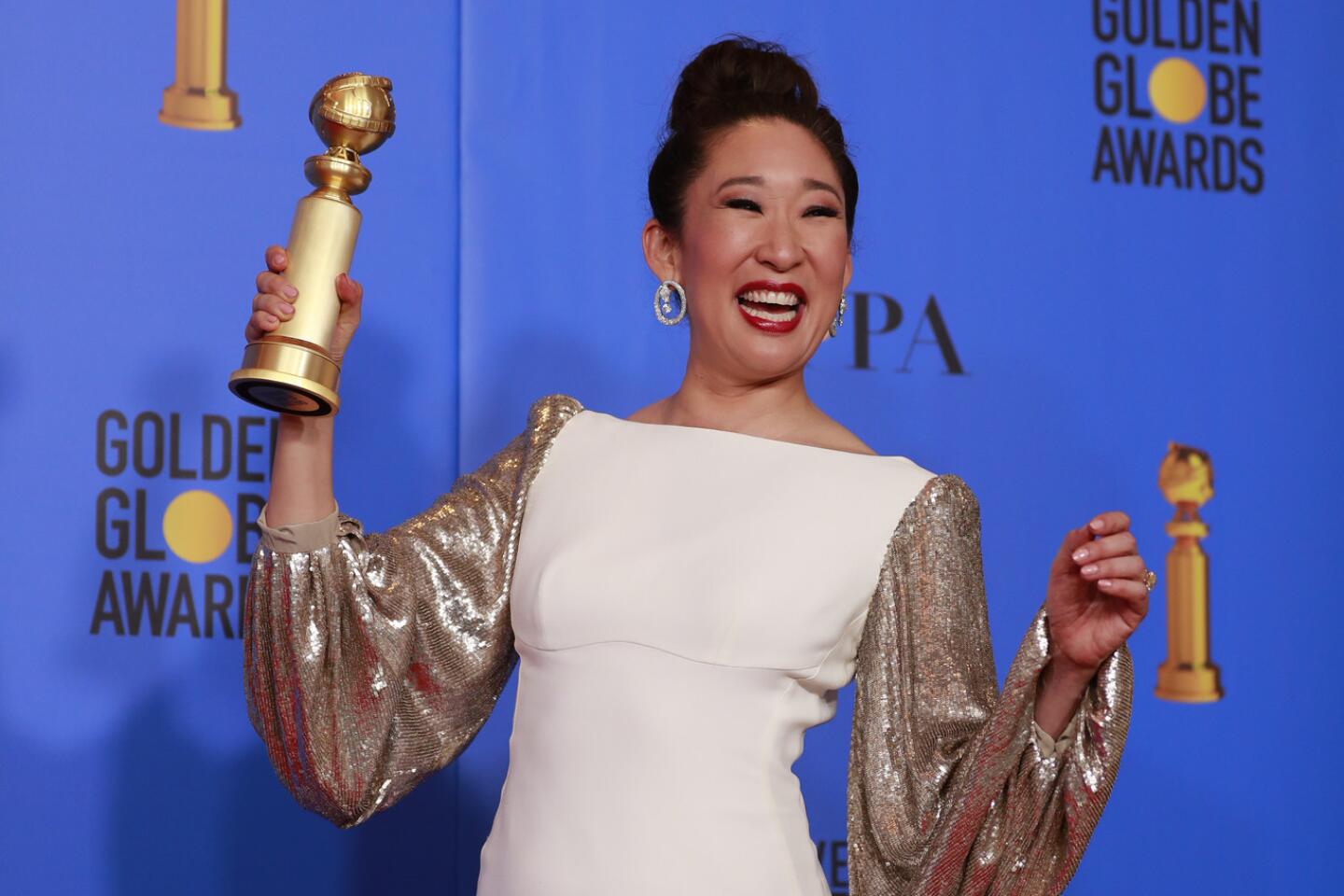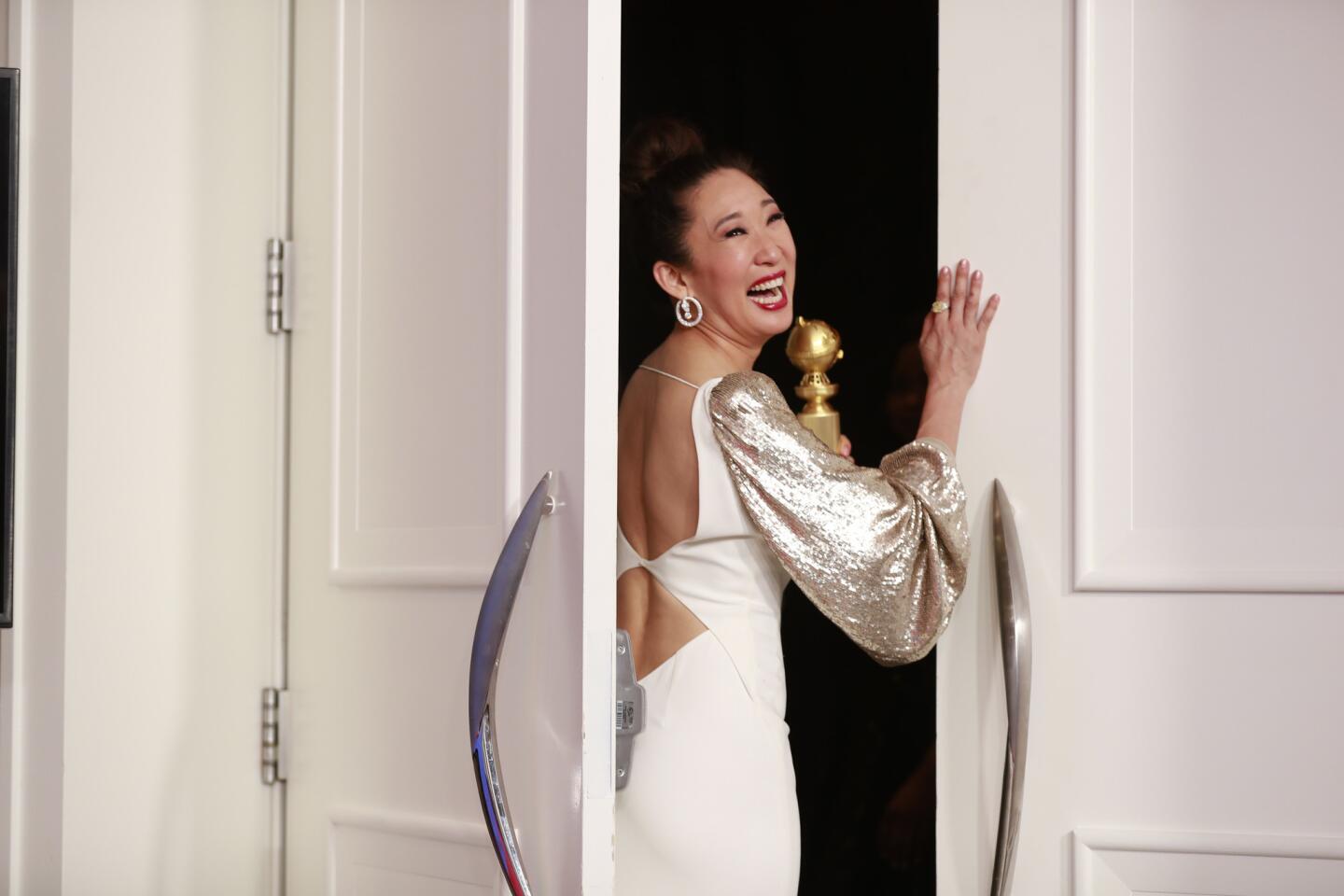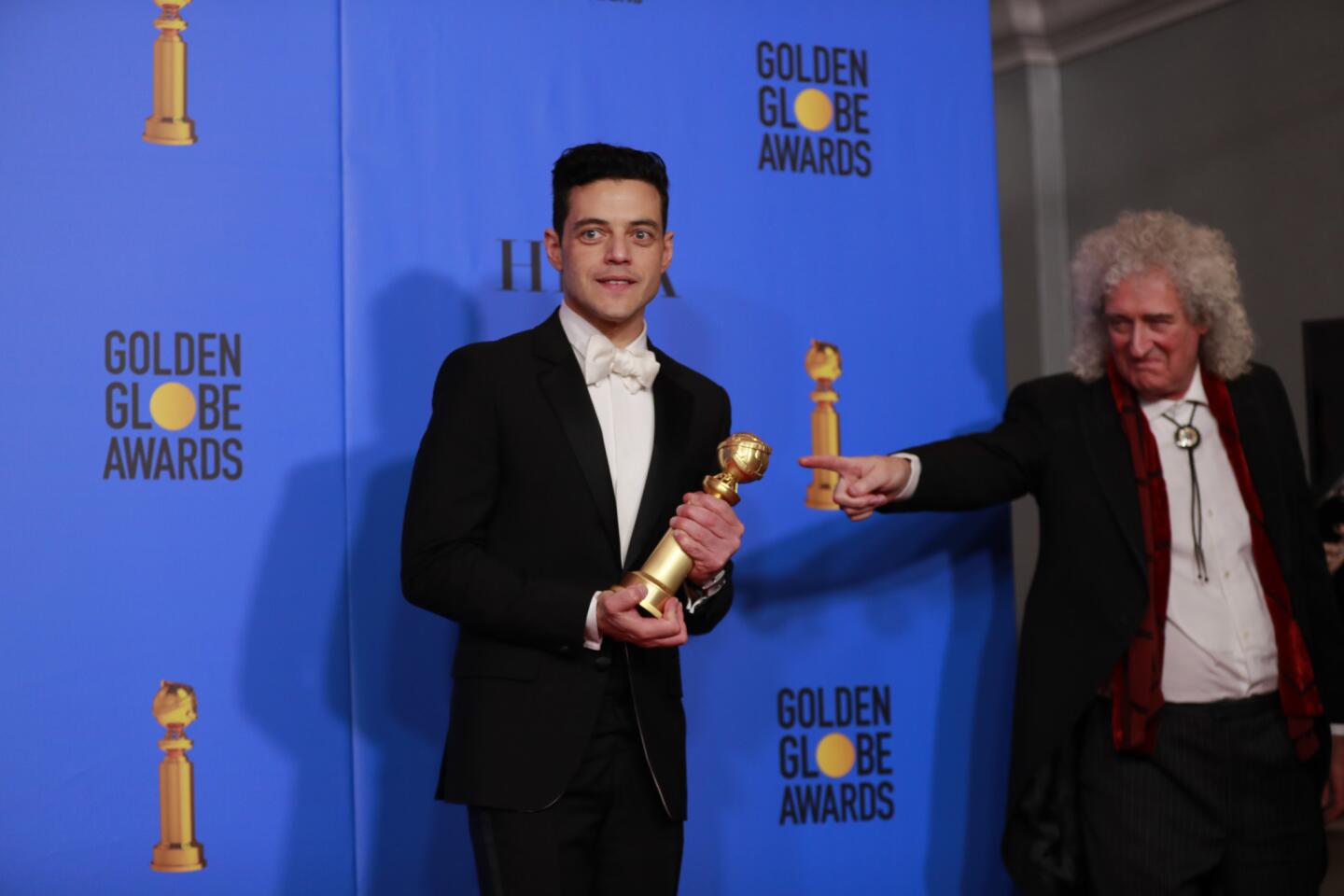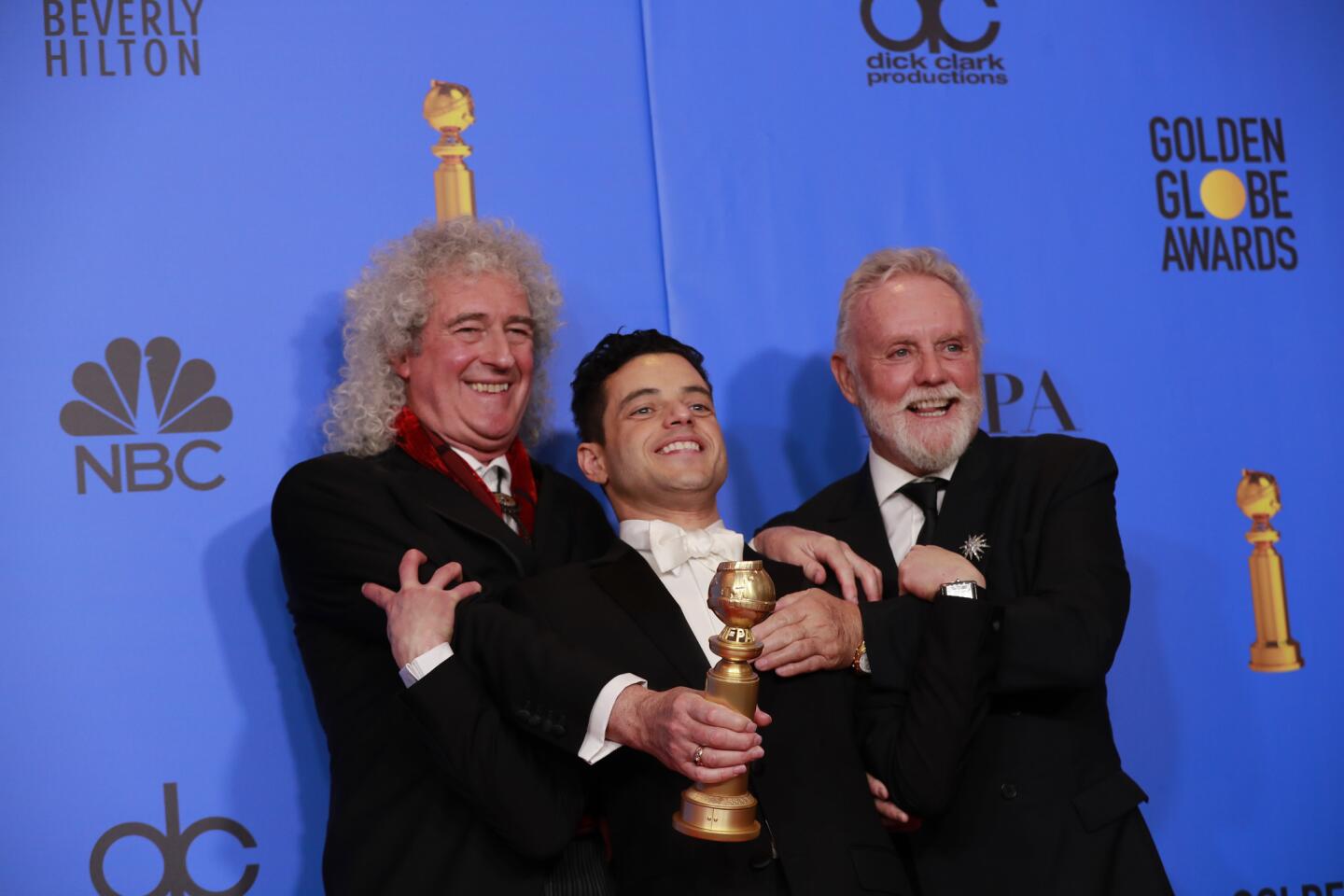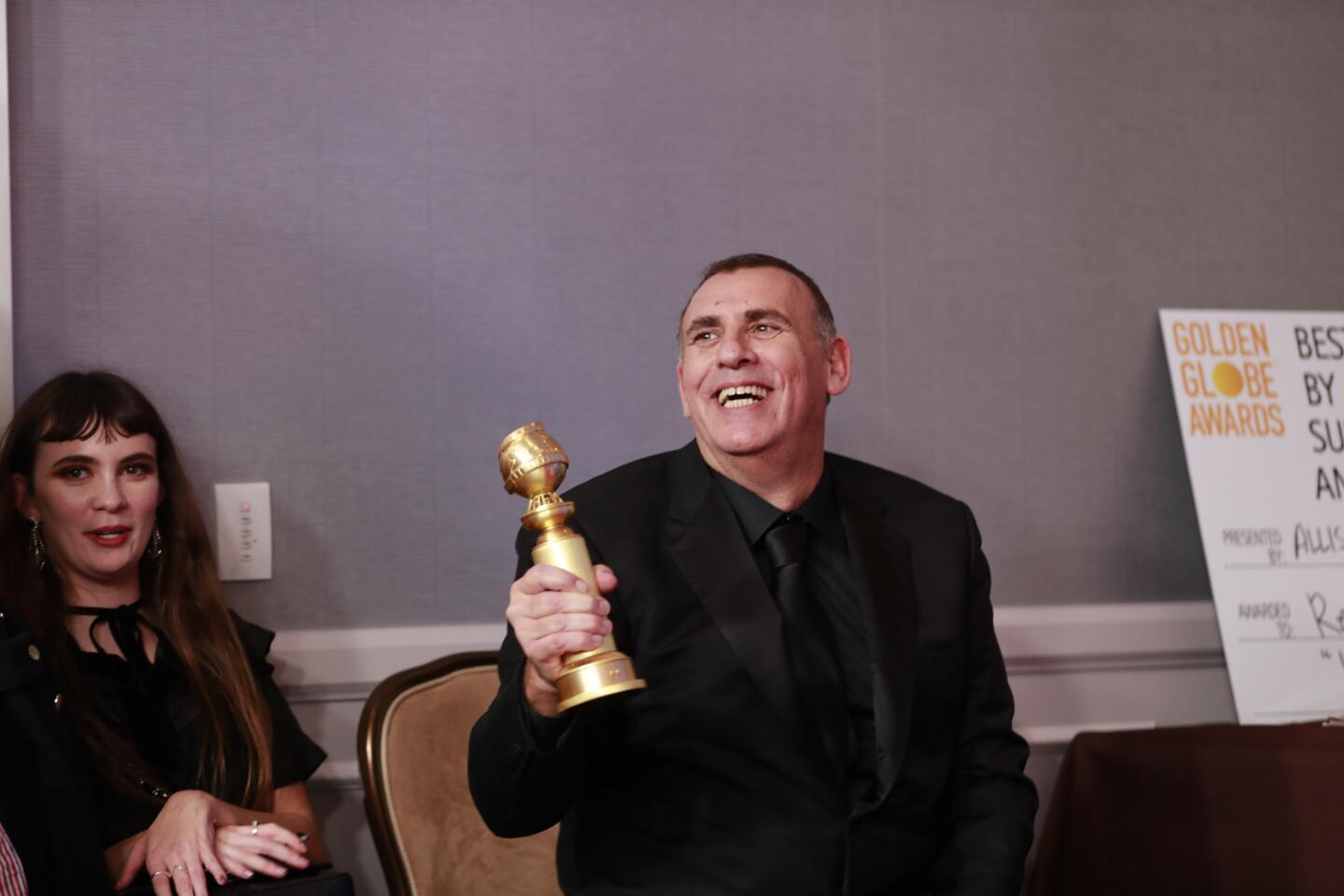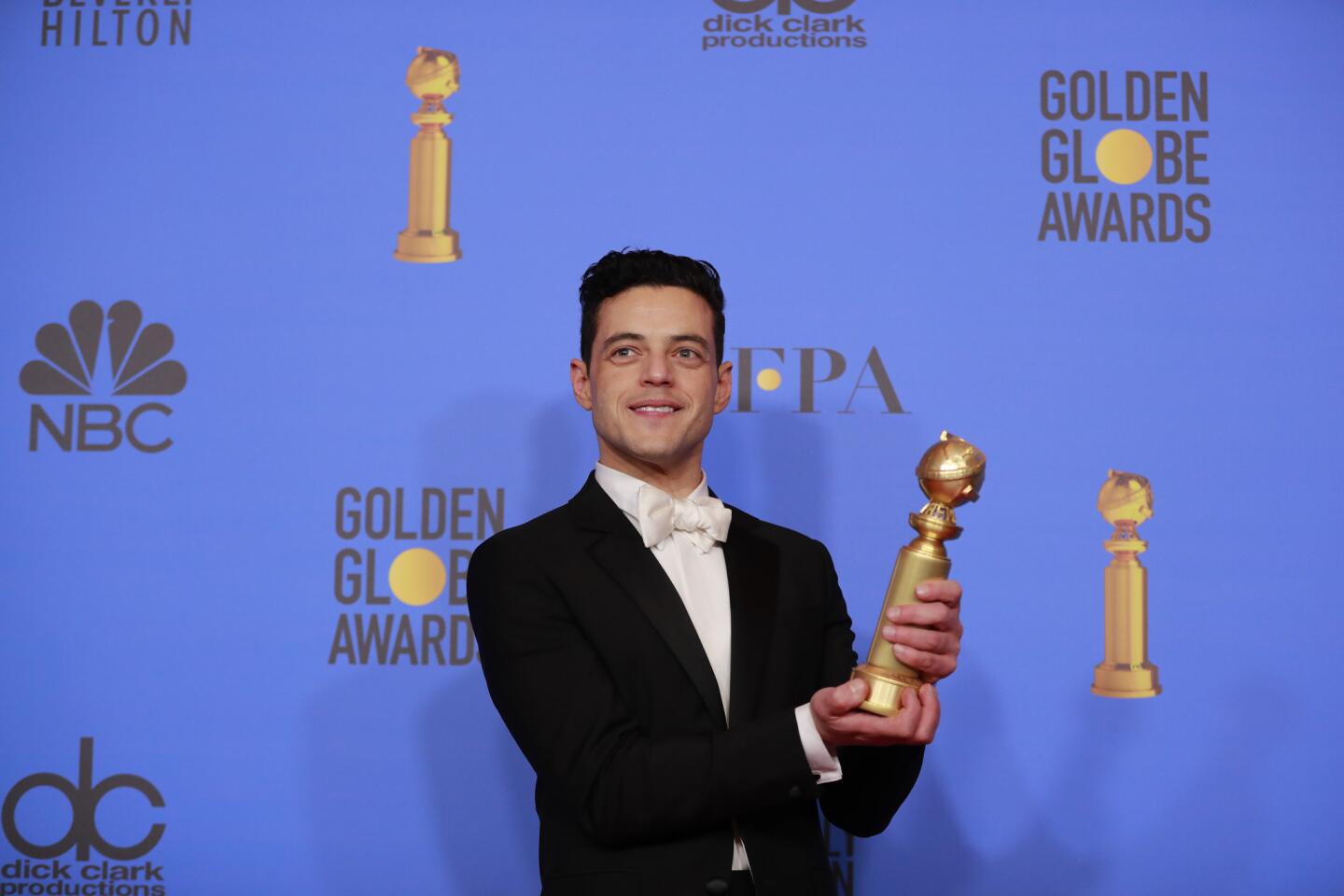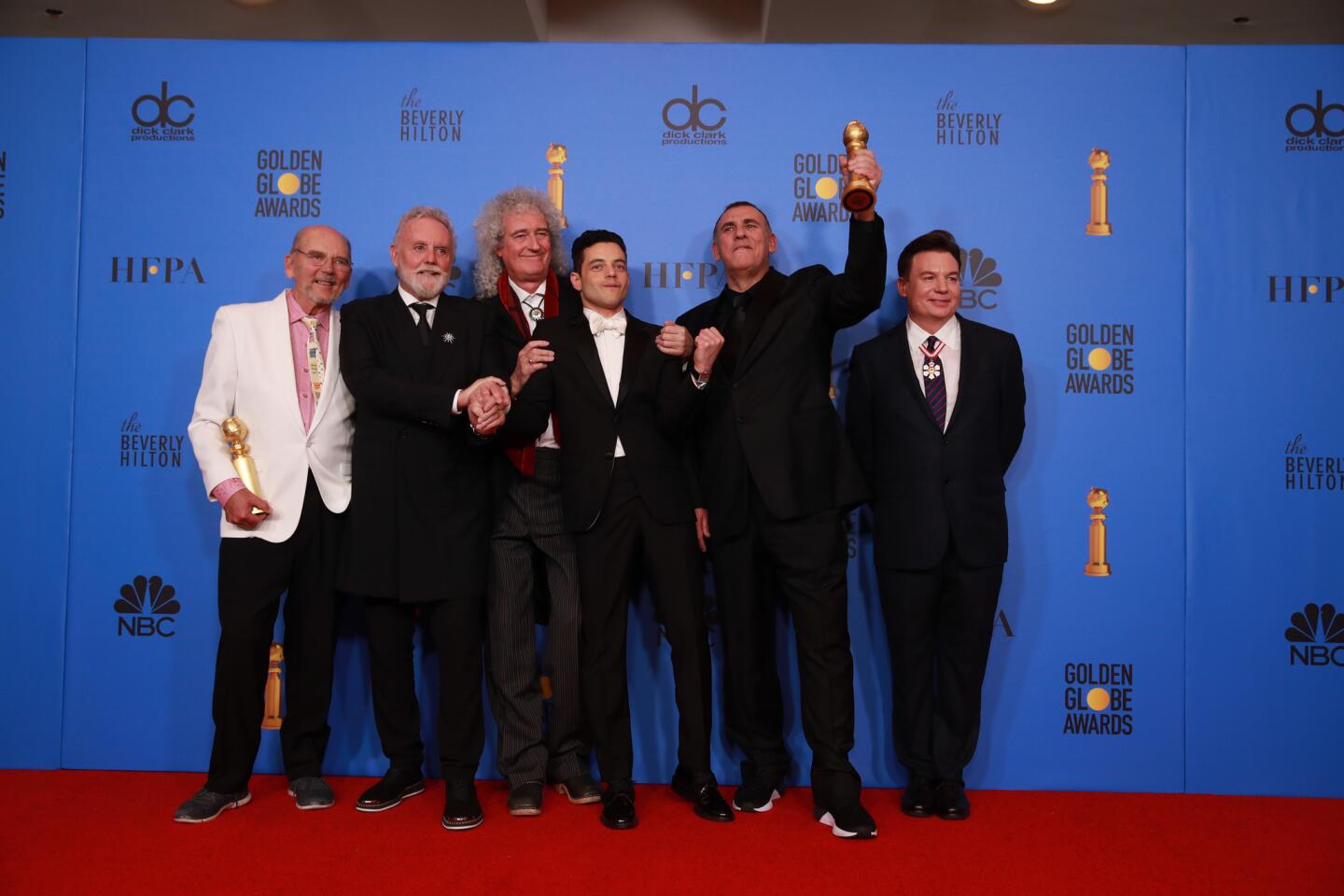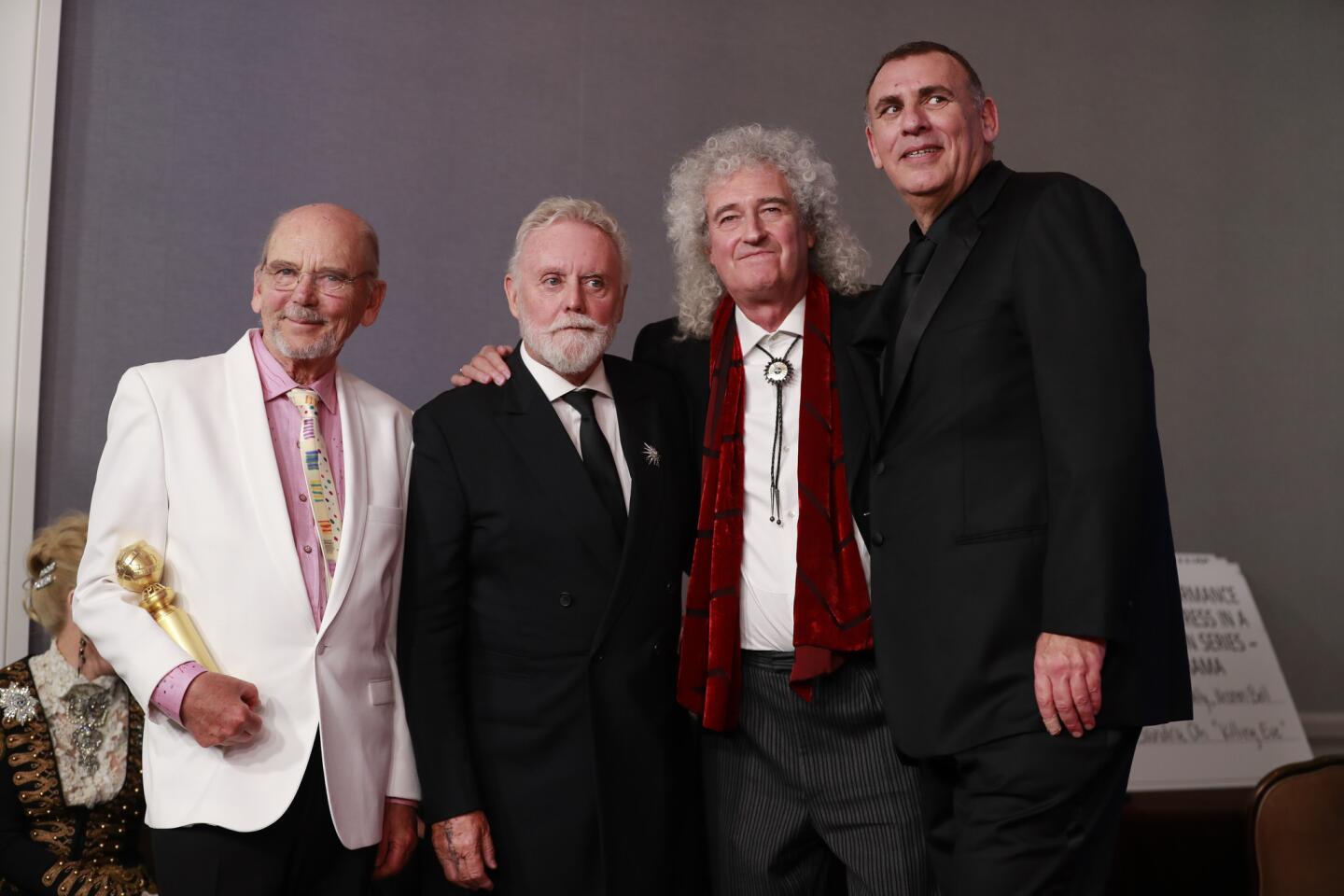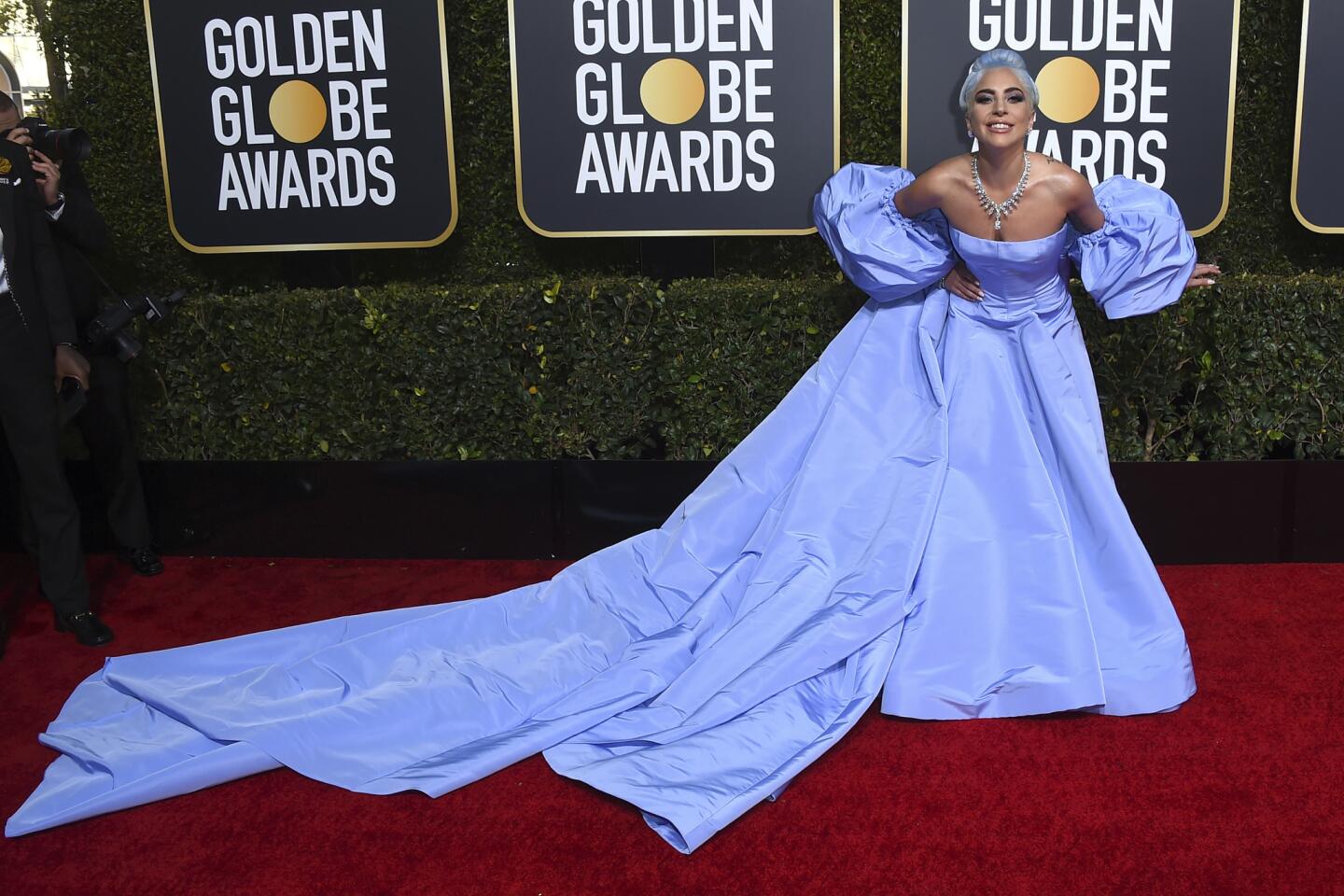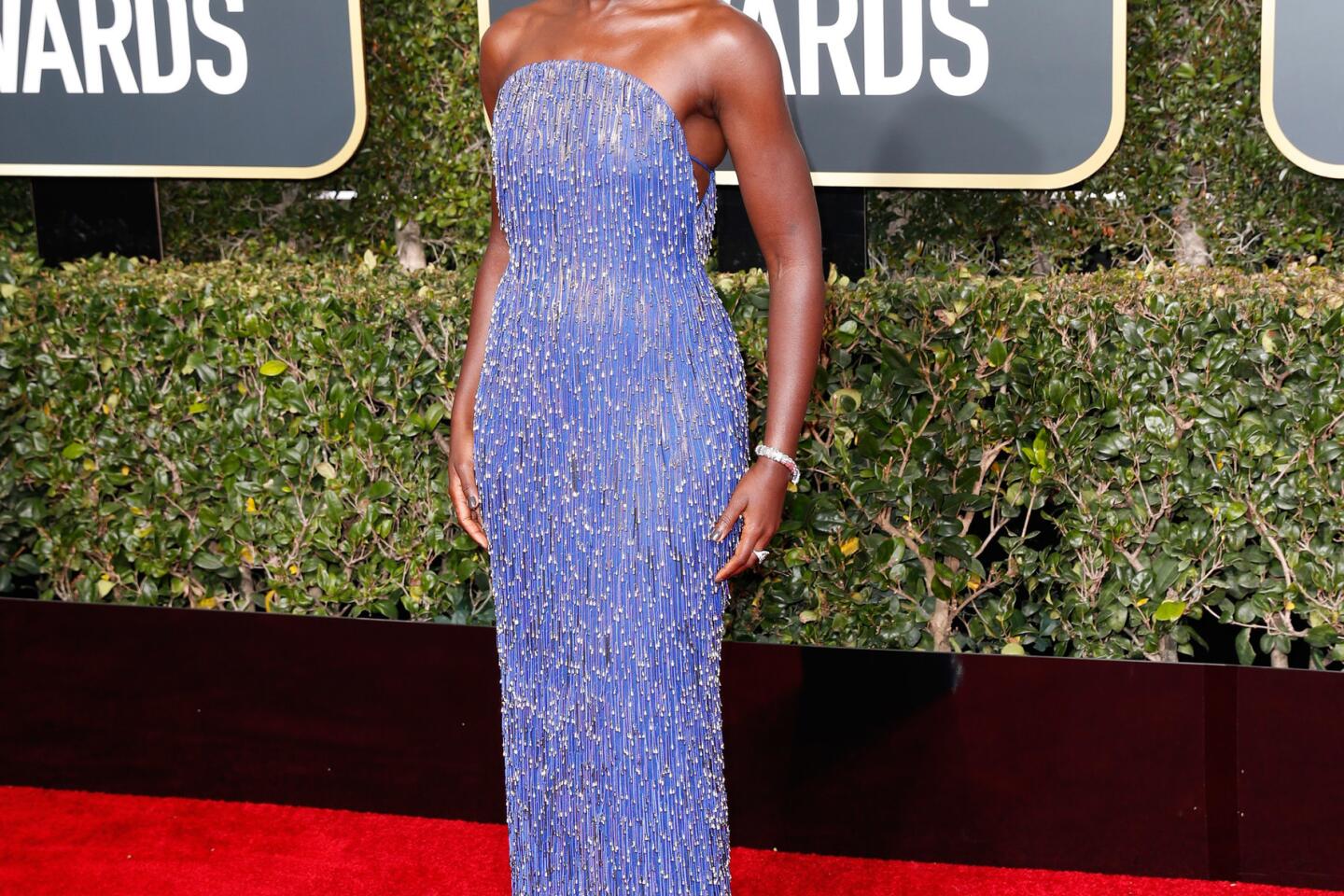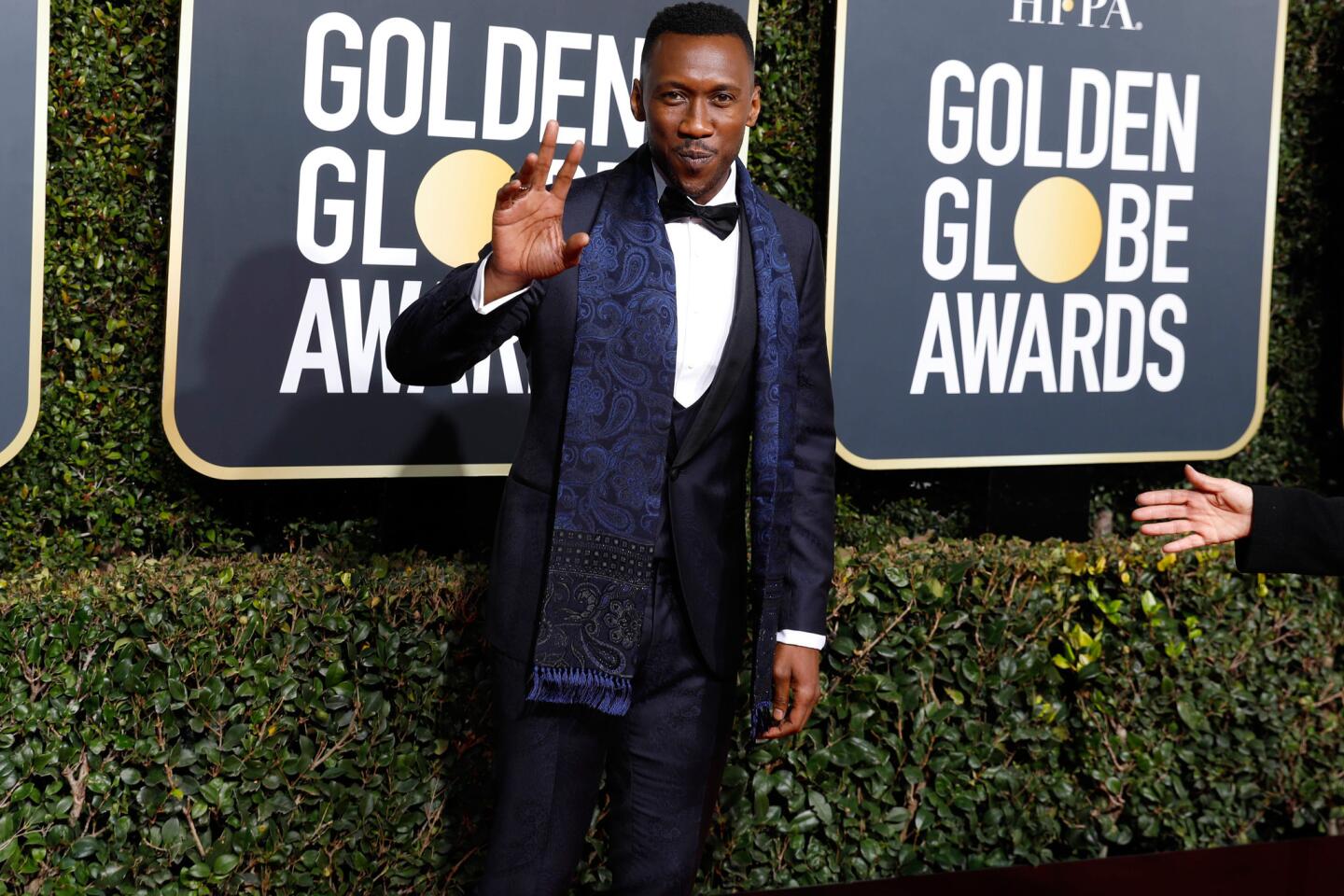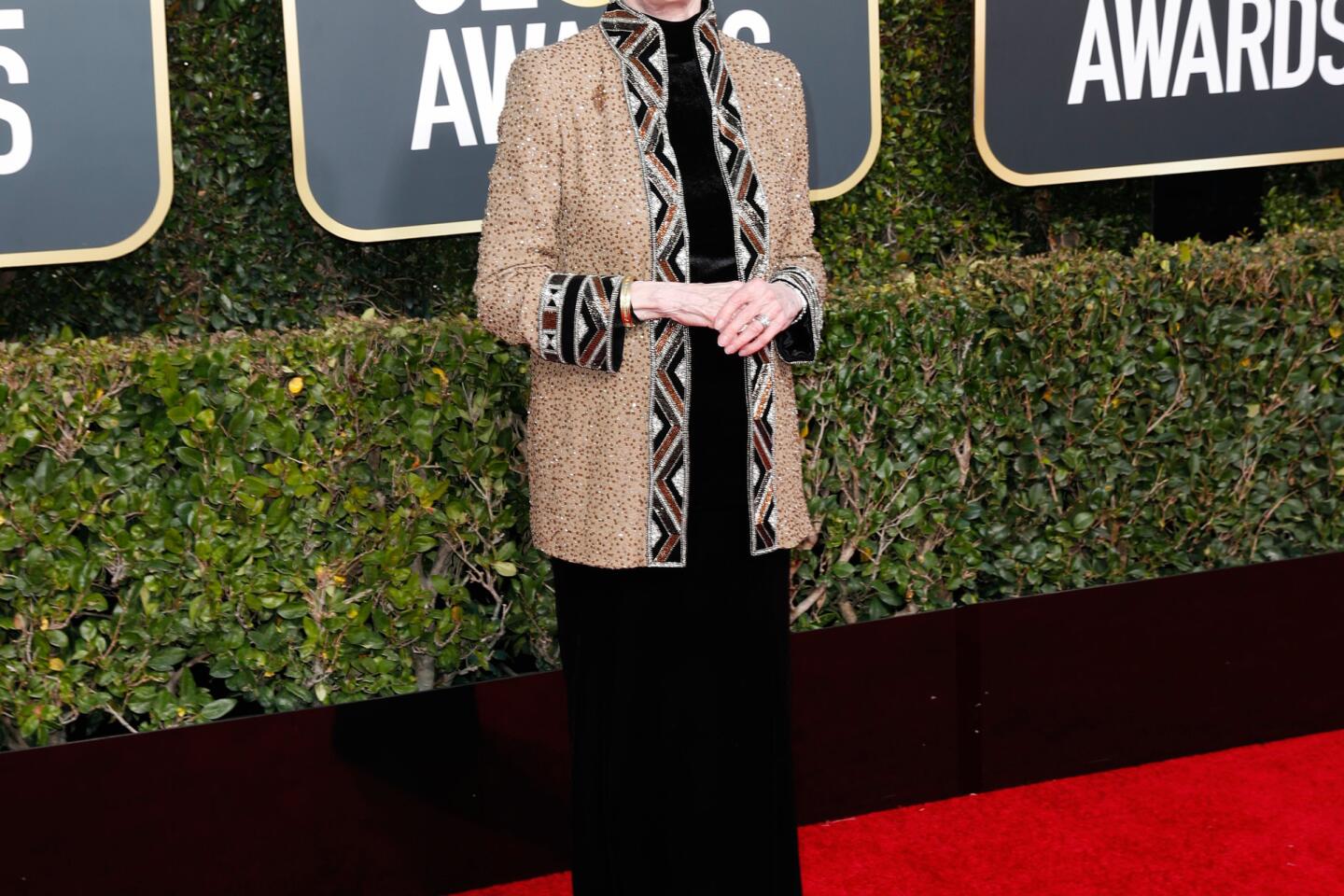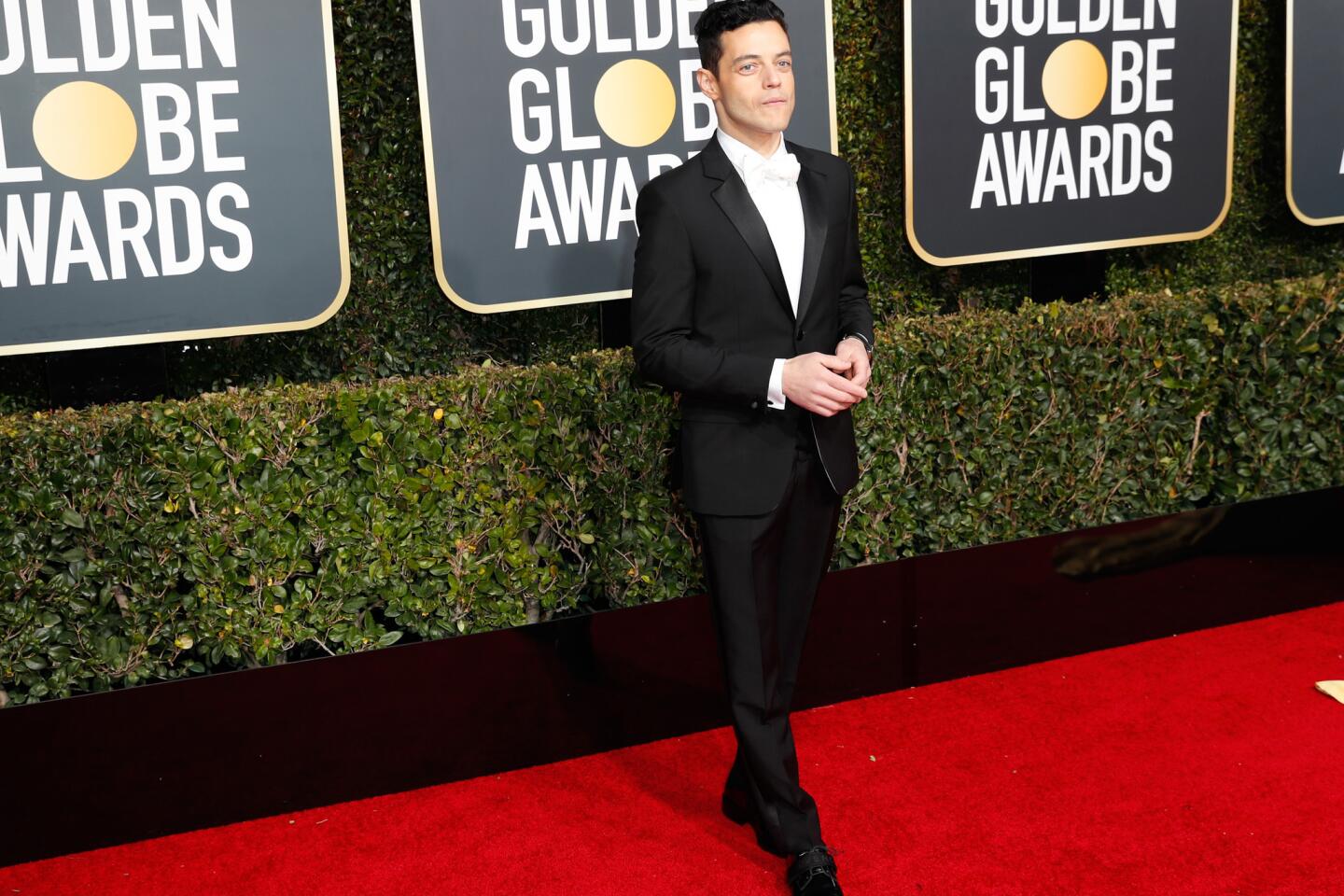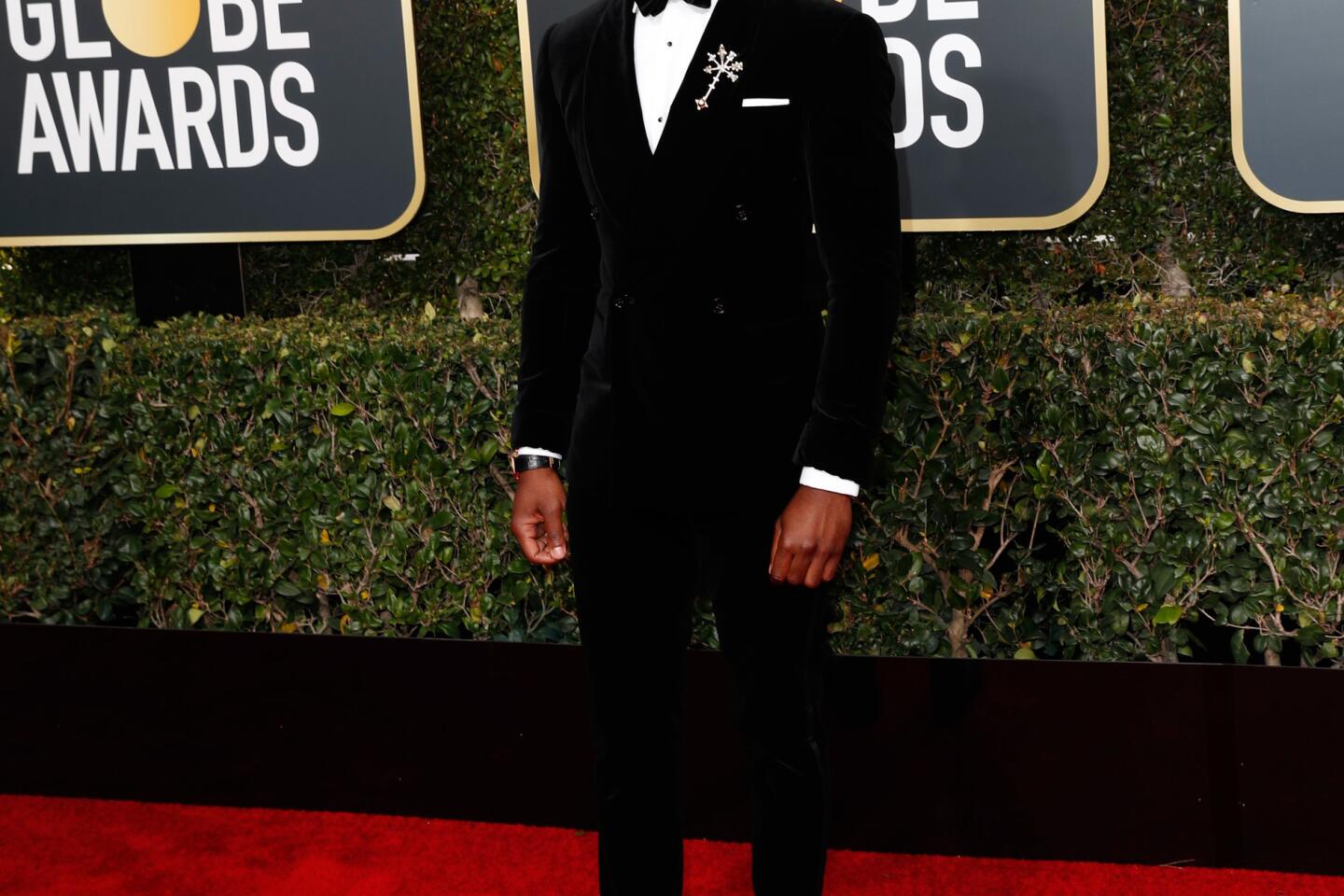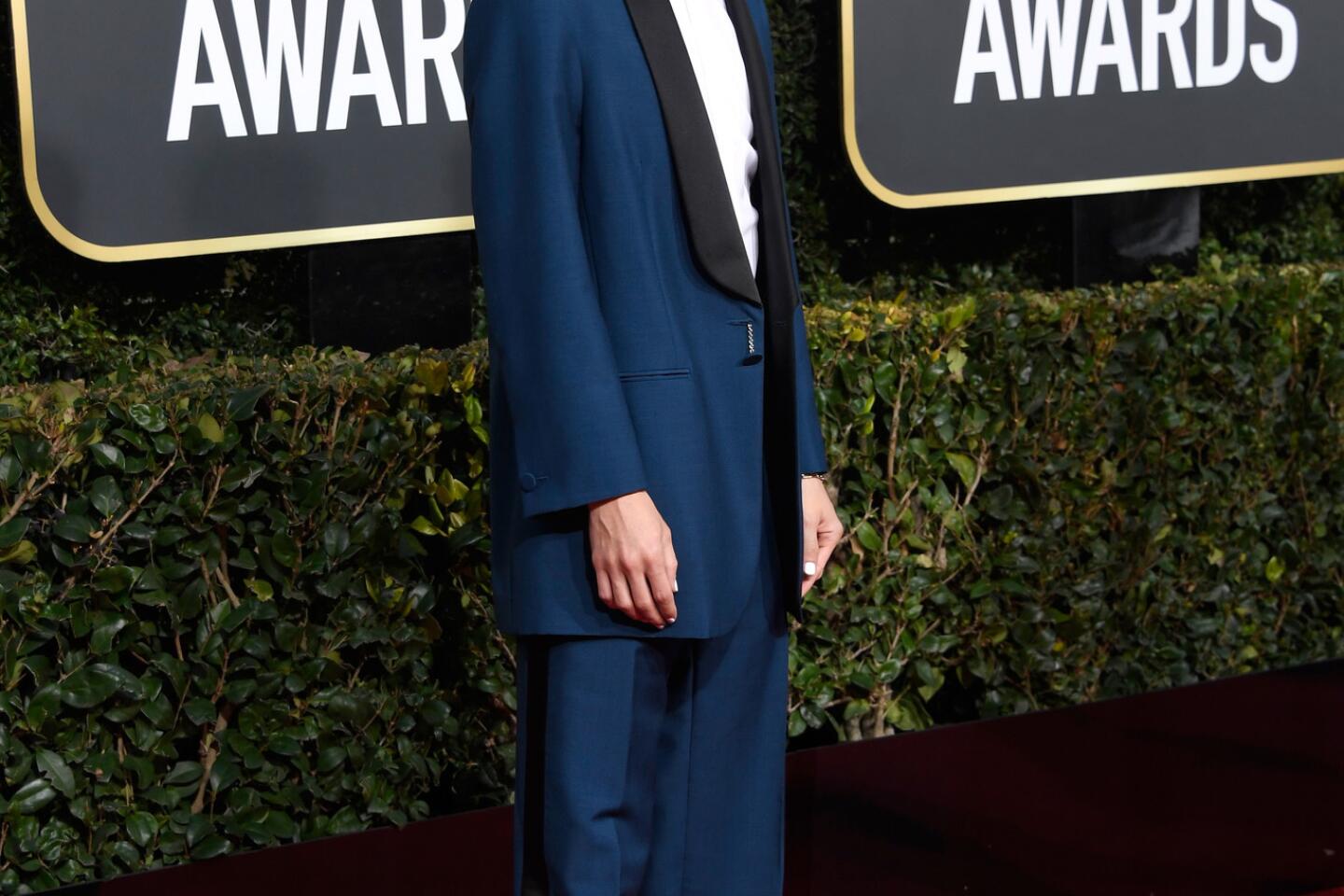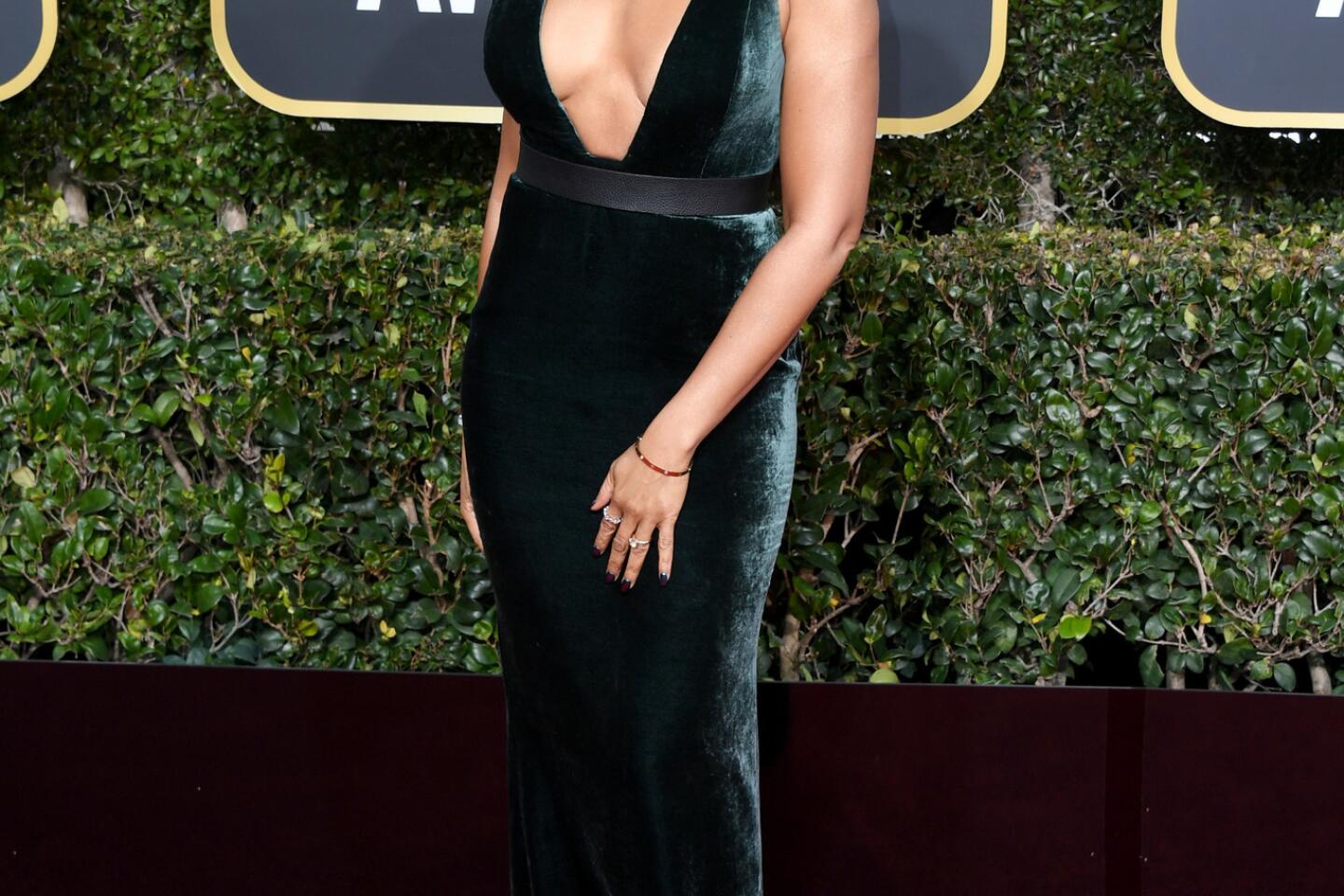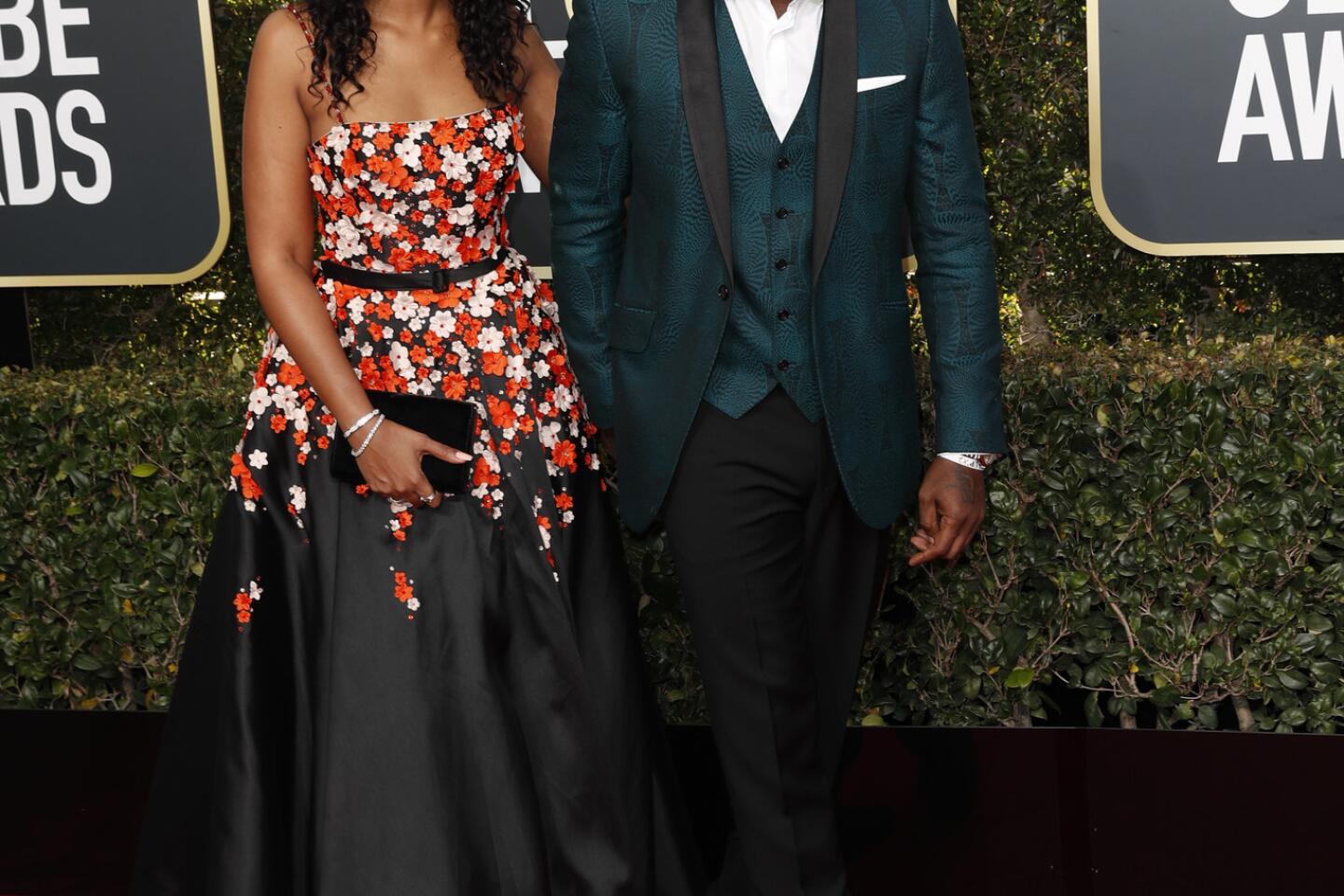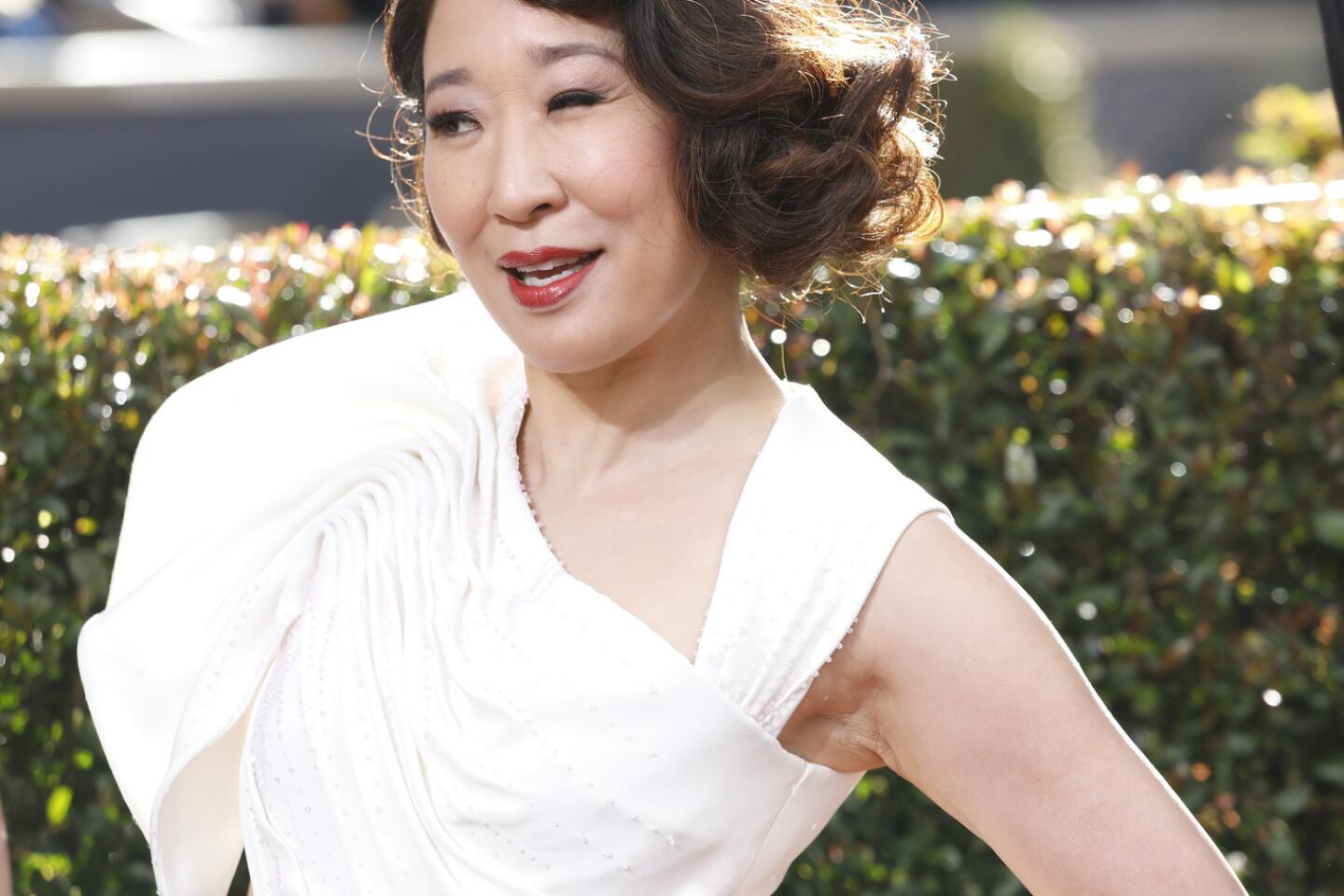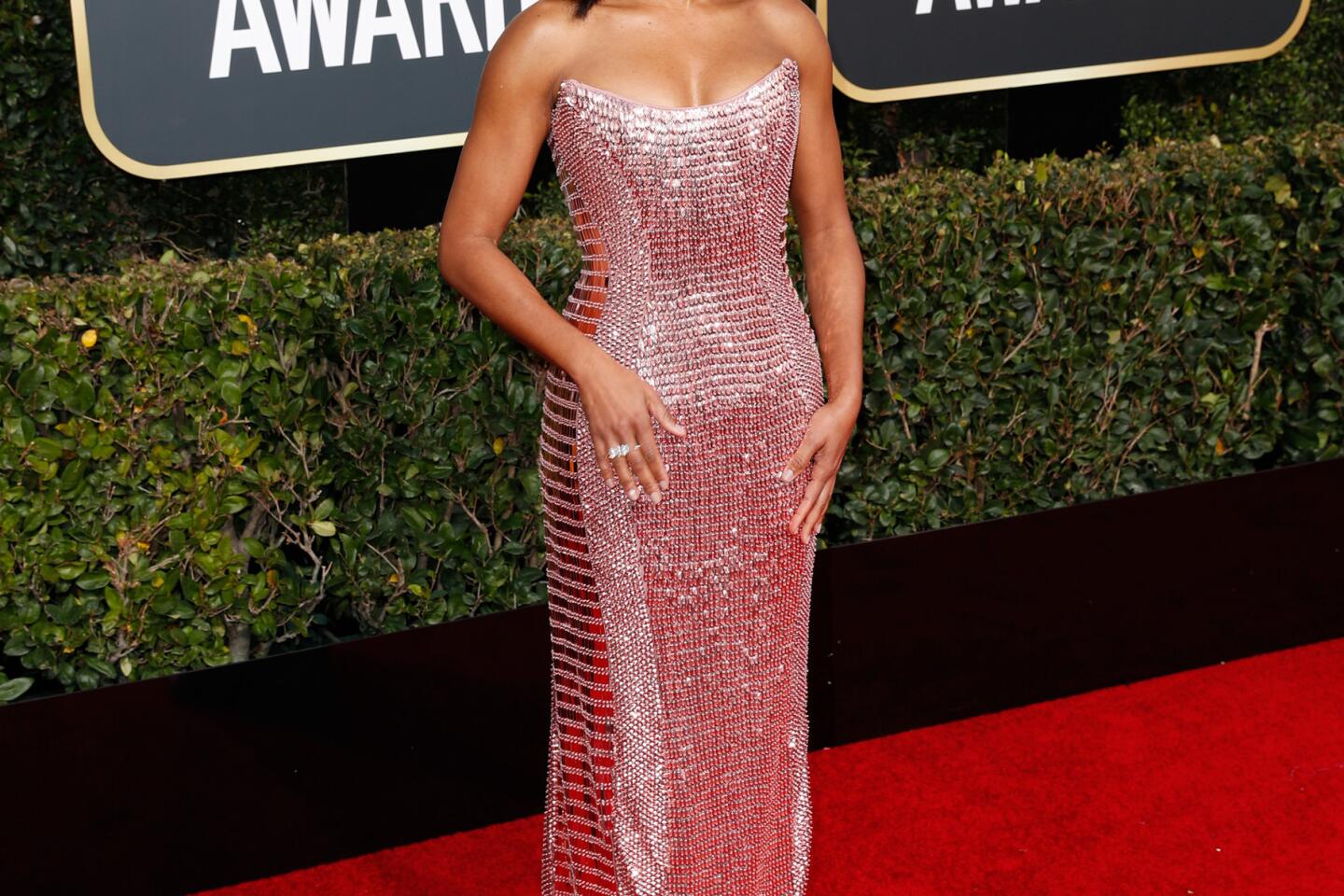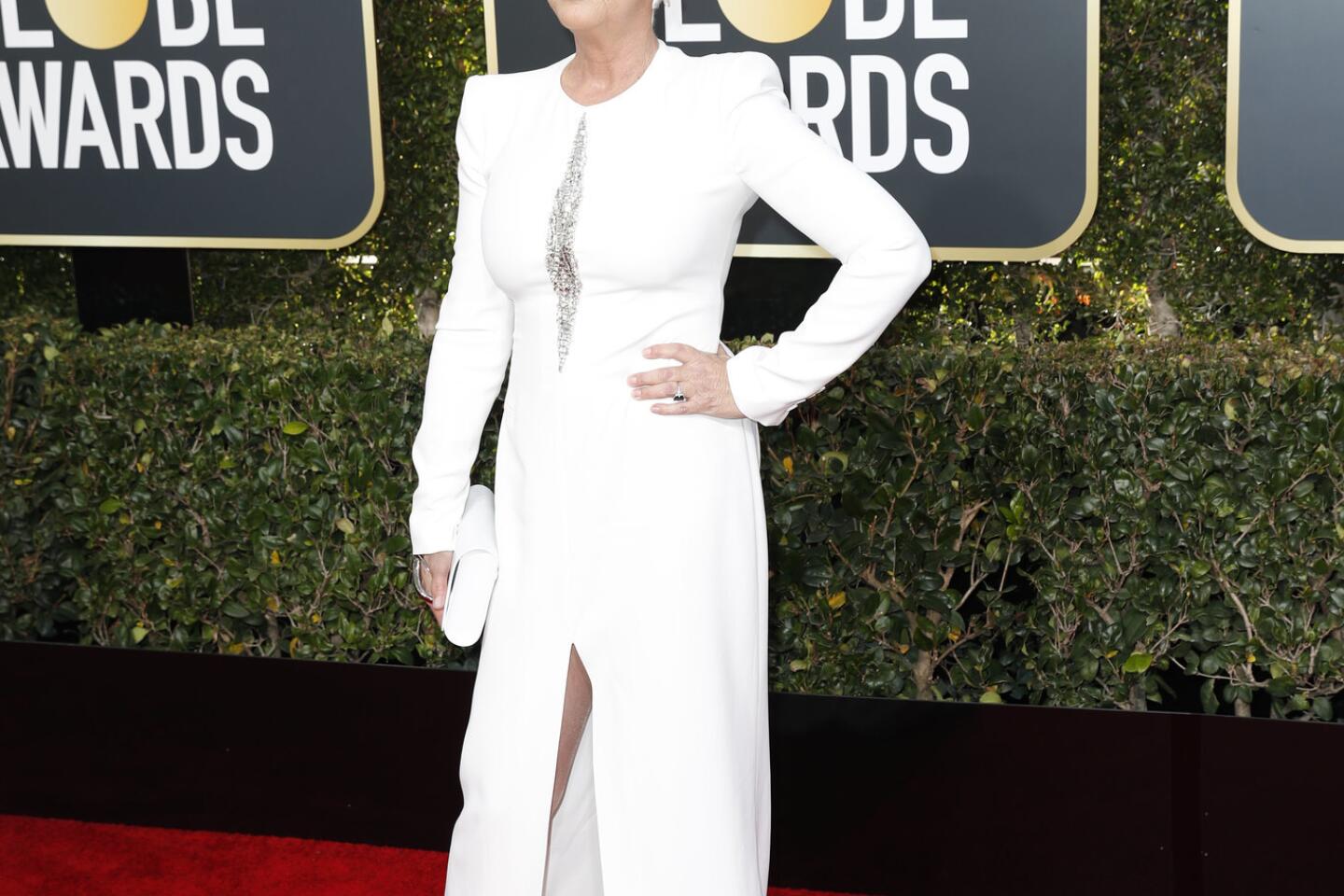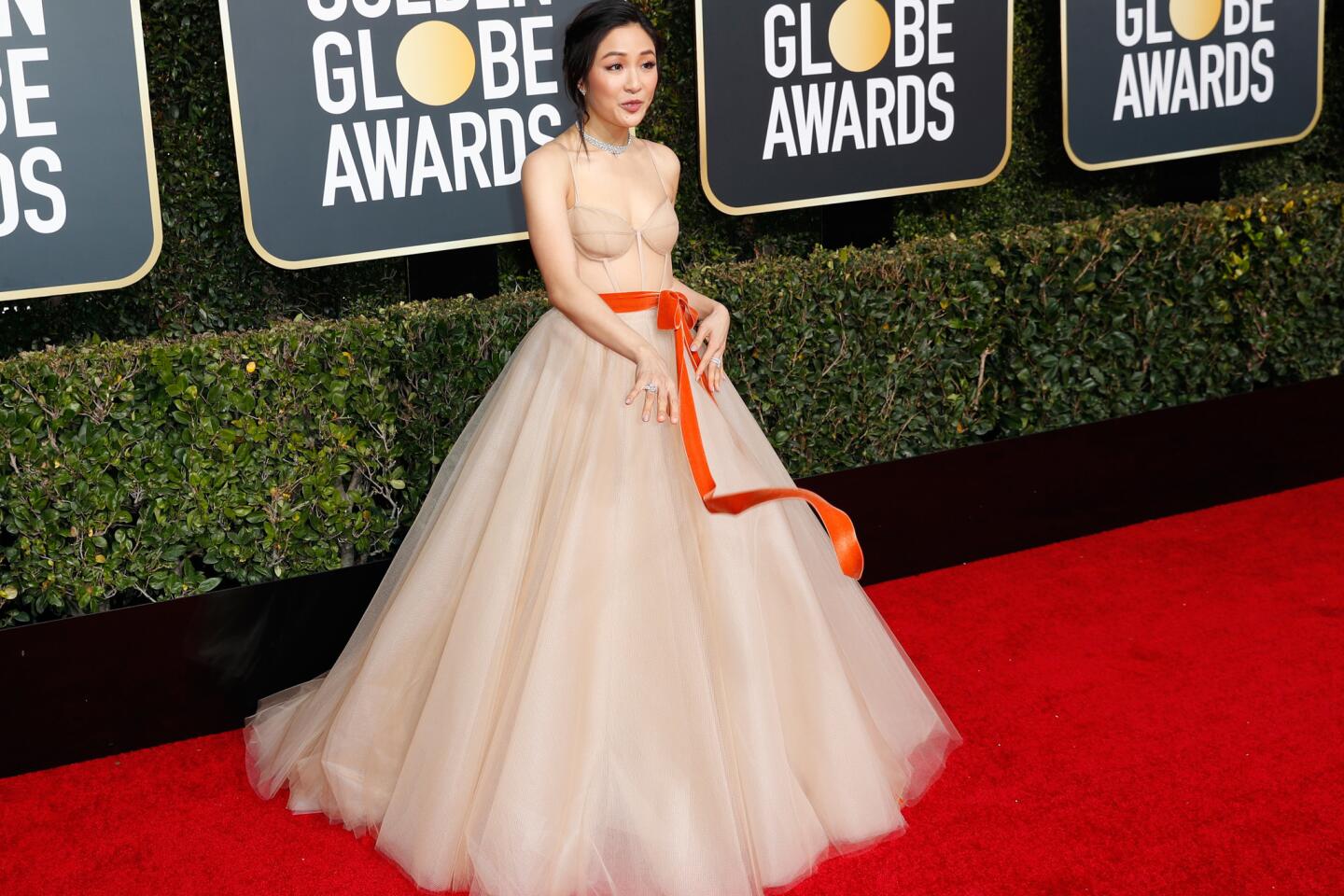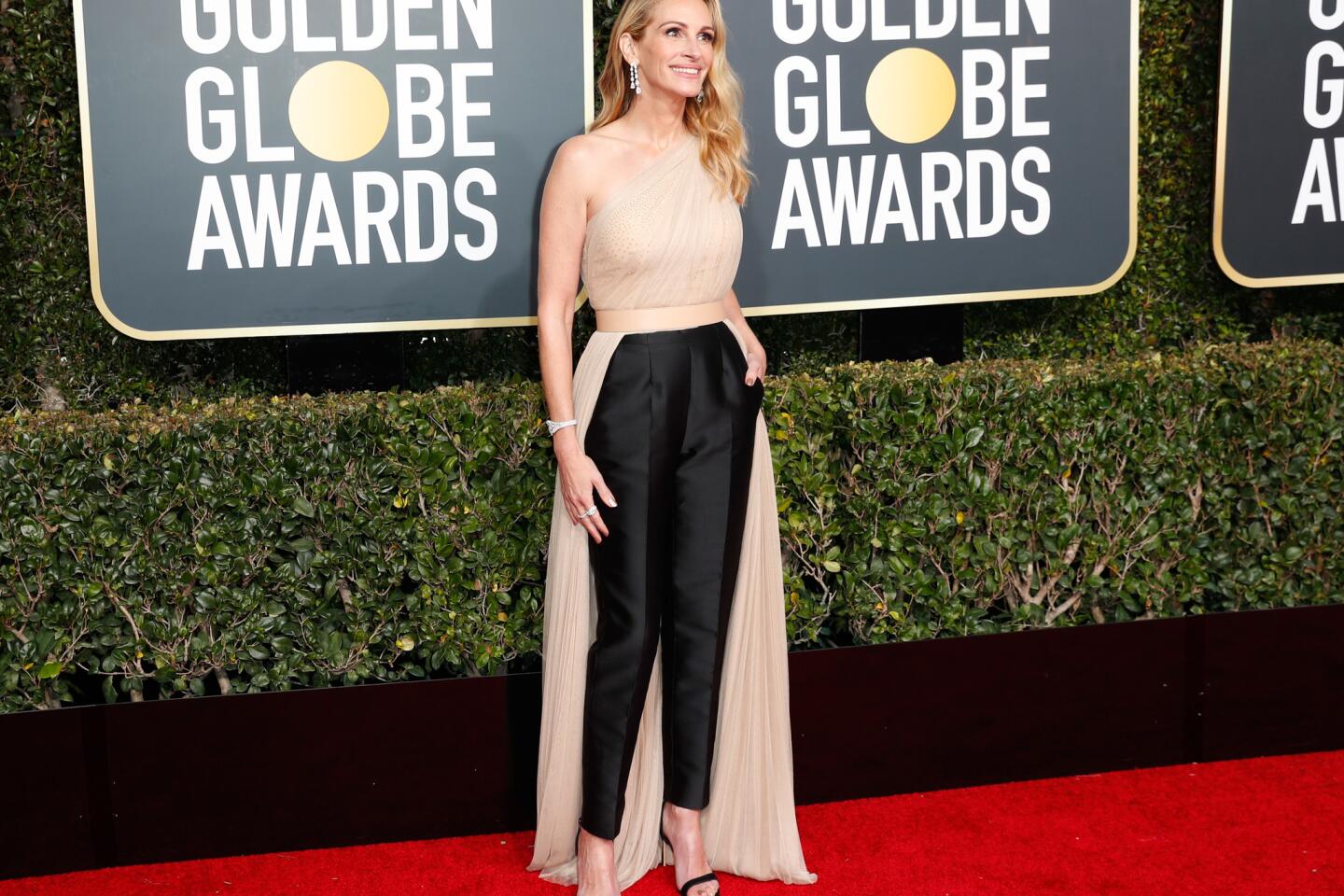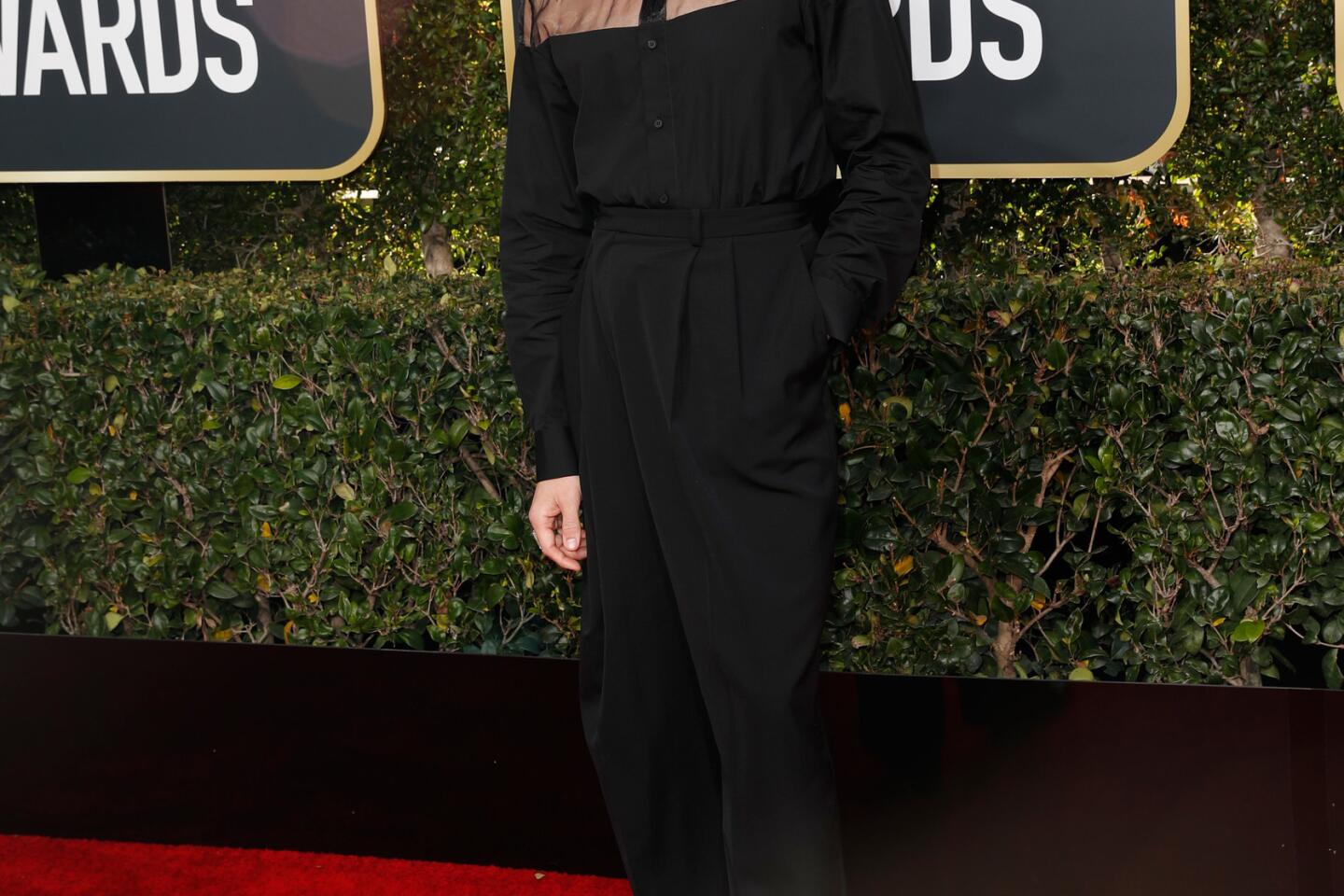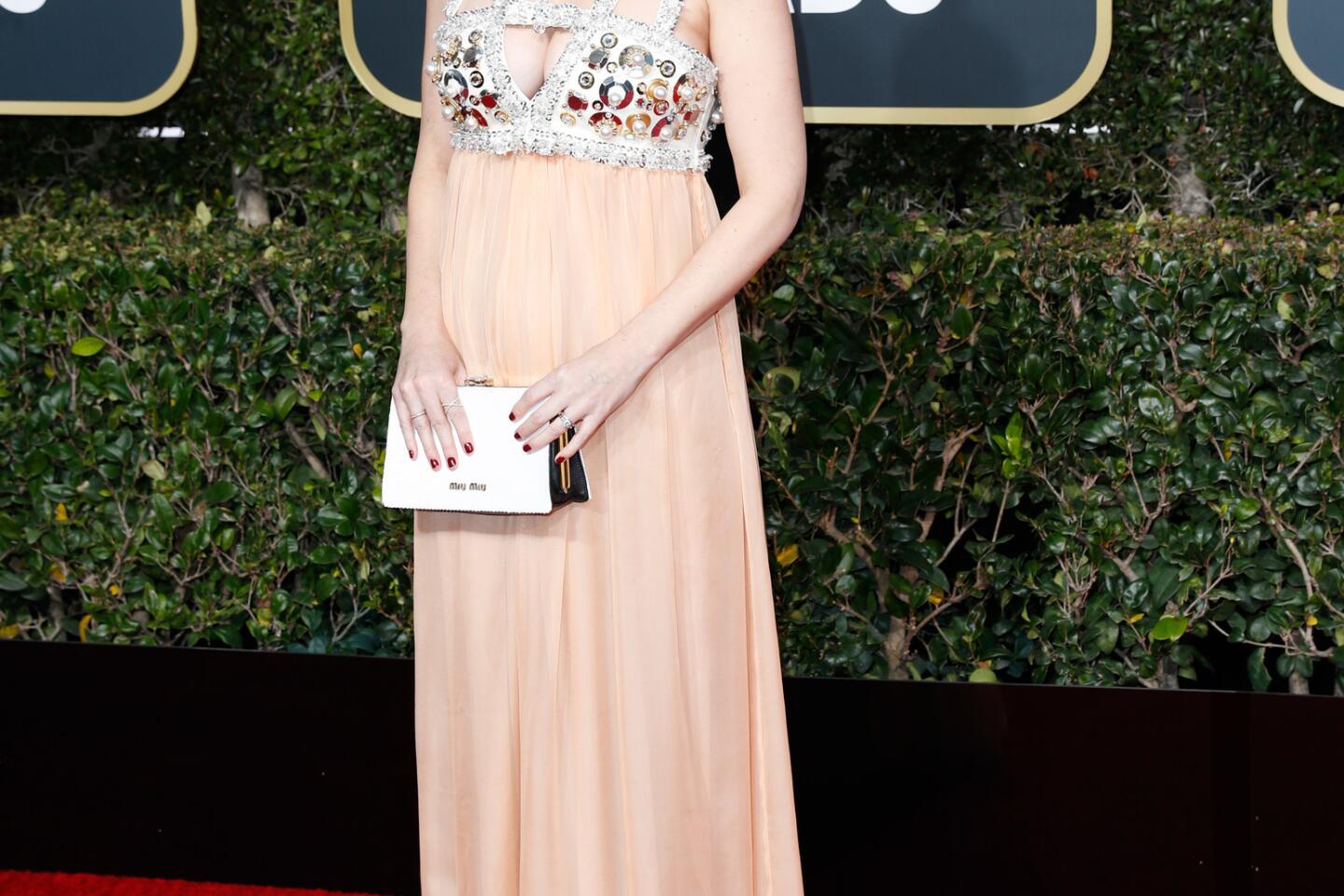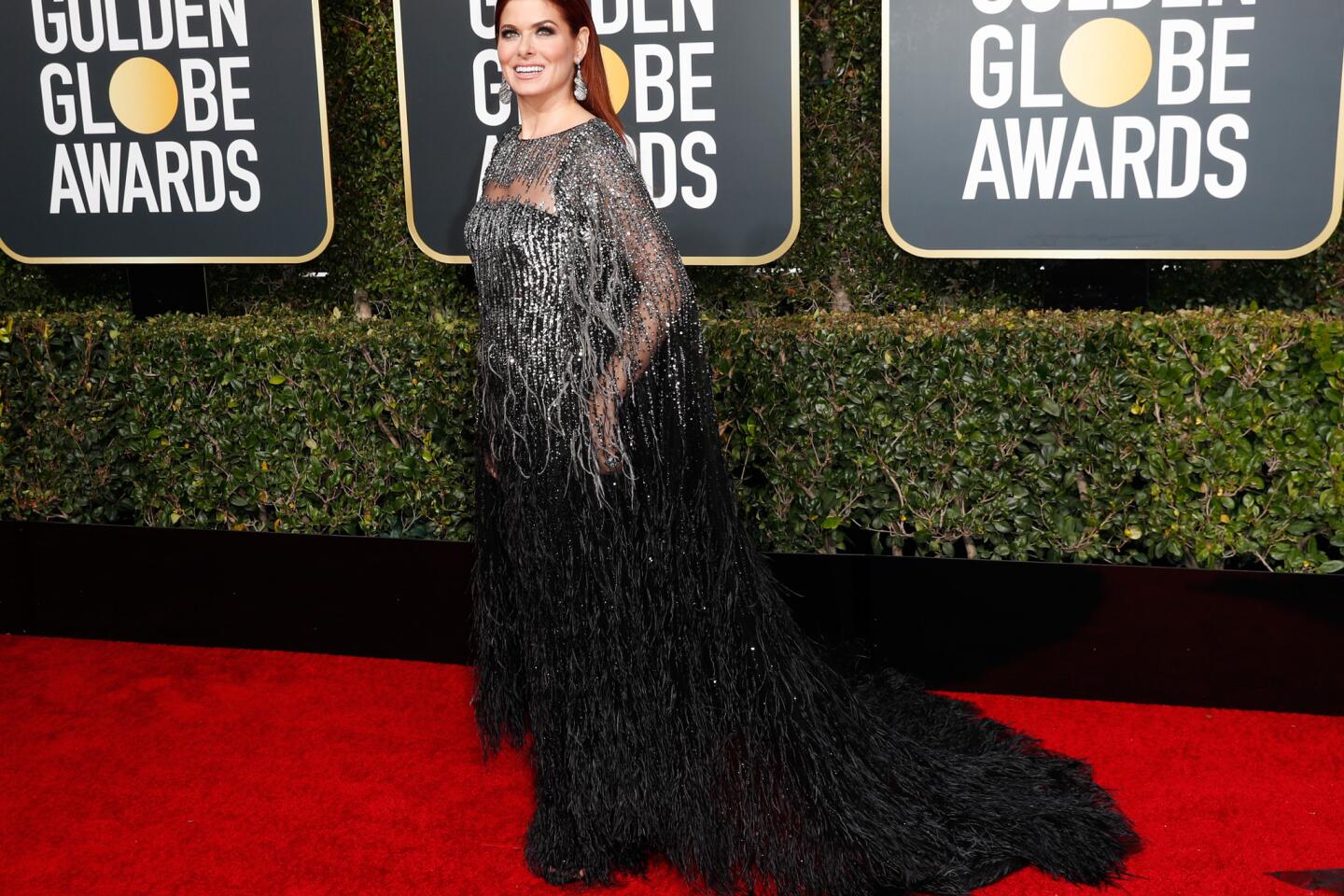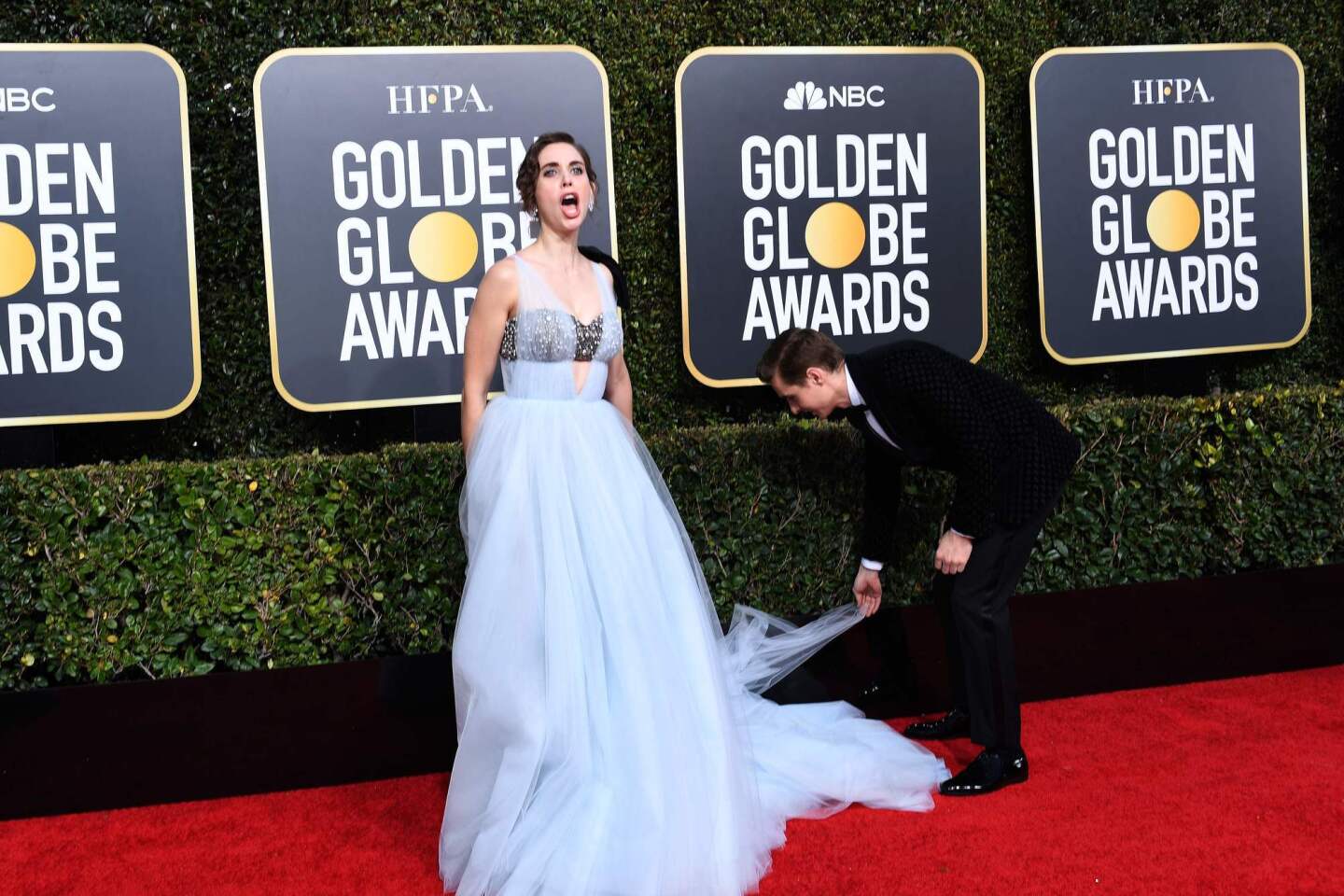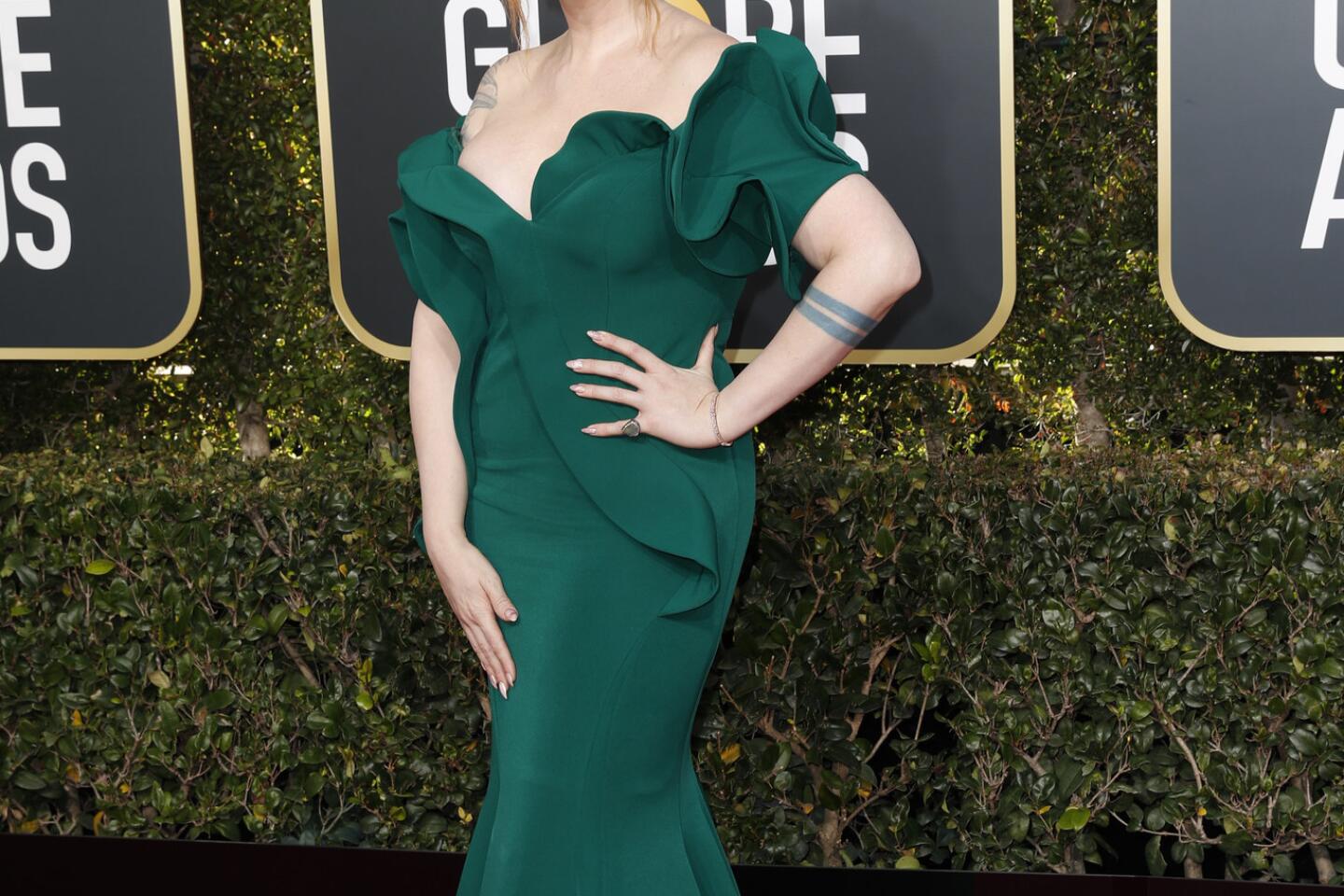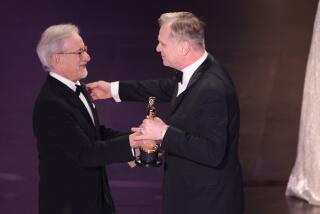Providing the latest set of potentially confusing data points in what has already been an unpredictable awards season, the 76th Golden Globes gave major boosts to the racially inflected period road movie “Green Book” and, more surprising, the Freddie Mercury biopic “Bohemian Rhapsody” in their pursuit of Oscar glory.
“Bohemian Rhapsody” — a film that had a troubled production, including the firing of credited director Bryan Singer, and was largely dismissed as a major awards contender early on — took home the prize for best picture in the drama category, beating out a field that included presumptive favorite “A Star Is Born,” “Black Panther,” “BlacKkKlansman” and “If Beale Street Could Talk.”
Though the Globes has a long history of delivering occasional head-scratchers, “Bohemian Rhapsody” producer Graham King seemed to speak for many in the crowd when, accepting the award, he said simply, “Wow, now that was unexpected.” Rami Malek also earned the prize for actor in a drama for his turn in the film as the lead singer of Queen.
Neither Malek nor King mentioned Singer in their acceptance speeches. Asked backstage about Singer’s departure from the film, King said, “It’s not something I really wish to talk about tonight.”
Malek added, “There’s only one thing we needed to do and that was to celebrate Freddie Mercury … Nothing was going to compromise us giving him the love, celebration, adulation he deserves.”
1/38
Jeff Bridges, who won the Cecil B. DeMille Award, in the Trophy Room at the 76th Golden Globes at the Beverly Hilton hotel on Sunday.
(Allen J. Schaben / Los Angeles Times) 2/38
“The Marvelous Mrs. Maisel’s” Rachel Brosnahan.
(Allen J. Schaben / Los Angeles Times) 3/38
Alfonso Cuaron, holds his two statuettes for best director - motion picture and foreign language film for “Roma.”
(Allen J. Schaben / Los Angeles Times) 4/38
“Escape at Dannemora’s” Patricia Arquette.
(Allen J. Schaben / Los Angeles Times) 5/38
“The Americans” cast and crew in the Trophy Room at the 76th Golden Globes.
(Allen J. Schaben / Los Angeles Times) 6/38
“Bodyguard’s” Richard Madden.
(Allen J. Schaben / Los Angeles Times) 7/38
The team behind “Spiderman - Into the Spider Verse.”
(Allen J. Schaben / Los Angeles Times) 8/38
Carol Burnett receives the inaugural Carol Burnett Award at the 76th Golden Globes.
(Allen J. Schaben / Los Angeles Times) 9/38
Justin Hurwitz for “First Man.”
(Allen J. Schaben / Los Angeles Times) 10/38
Tyler Perry in the Trophy Room at the 76th Golden Globes at the Beverly Hilton Hotel.
(Allen J. Schaben / Los Angeles Times) 11/38
Anthony Rossomando, Andrew Wyatt, Lady Gaga and Mark Ronson celebrate their “Shallow” victory in the Trophy Room at the 76th Golden Globes.
(Allen J. Schaben / Los Angeles Times) 12/38
Lady Gaga in the Trophy Room at the 76th Golden Globes.
(Allen J. Schaben / Los Angeles Times) 13/38
“A Very English Scandal’s” Ben Whishaw.
(Allen J. Schaben / Los Angeles Times) 14/38
“Sharp Object’s” Patricia Clarkson.
(Allen J. Schaben / Los Angeles Times) 15/38
“The Kominsky Method’s” Michael Douglas.
(Allen J. Schaben / Los Angeles Times) 16/38
“Green Book’s” Mahershala Ali.
(Allen J. Schaben / Los Angeles Times) 17/38
Saoirse Ronan in the Trophy Room.
(Allen J. Schaben / Los Angeles Times) 18/38
“Sharp Object’s” Patricia Clarkson.
(Allen J. Schaben / Los Angeles Times) 19/38
Michael Douglas, left, Al Higgins, Alan Arkin and Chuck Lorre of “The Kominsky Method” in the Trophy Room at the 76th Golden Globes at the Beverly Hilton.
(Allen J. Schaben / Los Angeles Times) 20/38
Ryan Murpphy (“The Assassination of Gianni Versace”) in the Trophy Room at the 76th Golden Globes at the Beverly Hilton.
(Allen J. Schaben / Los Angeles Times) 21/38
“The Assassination of Gianni Versace’s” team in the Trophy Room at the 76th Golden Globes at the Beverly Hilton.
(Allen J. Schaben / Los Angeles Times) 22/38
Darren Criss (“The Assassination of Gianni Versace”) in the Trophy Room at the 76th Golden Globes at the Beverly Hilton.
(Allen J. Schaben / Los Angeles Times) 23/38
Michael Douglas, left, and Alan Arkin of “The Kominsky Methold” in the Trophy Room at the 76th Golden Globes at the Beverly Hilton.
(Allen J. Schaben / Los Angeles Times) 24/38
Octavia Spencer, executive producer of “Green Book,” in the Trophy Room at the 76th Golden Globes at the Beverly Hilton.
(Allen J. Schaben / Los Angeles Times) 25/38
“Green Book’s” team in the Trophy Room at the 76th Golden Globes at the Beverly Hilton.
(Allen J. Schaben / Los Angeles Times) 26/38
Viggo Mortensen, left, Peter Farrelly, Linda Cardellini and Mahershala Ali in the Trophy Room at the 76th Golden Globes at the Beverly Hilton.
(Allen J. Schaben / Los Angeles Times) 27/38
Mahershala Ali (“Green Book”) with his wife, Amatus Sami-Karim, in the Trophy Room at the 76th Golden Globes at the Beverly Hilton.
(Allen J. Schaben / Los Angeles Times) 28/38
Olivia Colman from “The Favourite” in the Trophy Room at the 76th Golden Globes at the Beverly Hilton.
(Allen J. Schaben / Los Angeles Times) 29/38
Glenn Close (“The Wife”) in the Trophy Room at the 76th Golden Globes at the Beverly Hilton.
(Allen J. Schaben / Los Angeles Times) 30/38
Glenn Close (“The Wife”) in the Trophy Room at the 76th Golden Globes at the Beverly Hilton.
(Allen J. Schaben / Los Angeles Times) 31/38
Sandra Oh of “Killing Eve” in the Trophy Room at the 76th Golden Globes at the Beverly Hilton.
(Allen J. Schaben / Los Angeles Times) 32/38
Sandra Oh of “Killing Eve” in the Trophy Room at the 76th Golden Globes at the Beverly Hilton Hotel.
(Allen J. Schaben / Los Angeles Times) 33/38
Rami Malek and Brian May in the Trophy Room at the 76th Golden Globes at the Beverly Hilton Hotel.
(Allen J. Schaben / Los Angeles Times) 34/38
Queen guitarist Brian May, Rami Malek (who played late Queen frontman Freddie Mercury in “Bohemian Rhapsody”) and Queen drummer Roger Taylor in the Trophy Room at the 76th Golden Globes at the Beverly Hilton Hotel.
(Allen J. Schaben / Los Angeles Times) 35/38
Graham King in the Trophy Room at the 76th Golden Globes at the Beverly Hilton Hotel.
(Allen J. Schaben / Los Angeles Times) 36/38
Rami Malek in the Trophy Room at the 76th Golden Globes at the Beverly Hilton Hotel.
(Allen J. Schaben / Los Angeles Times) 37/38
Jim Beach, left, Roger Taylor, Brian May, motion picture drama actor winner Rami Malek, Graham King and Mike Myers in the Trophy Room at the 76th Golden Globes at the Beverly Hilton Hotel.
(Allen J. Schaben / Los Angeles Times) 38/38
“Bohemain Rhapsody” producer and longtime Queen manager Jim Beach, left, with Queen members Roger Taylor and Brian May and producer Graham King, celebrate the film’s victory.
(Allen J. Schaben / Los Angeles Times) FULL GOLDEN GLOBES COVERAGE: Live updates | Winners list | Show highlights
“Green Book” earned the award for best comedy or musical over “Crazy Rich Asians,” “The Favourite,” “Mary Poppins Returns” and “Vice,” and won prizes for screenplay and supporting actor Mahershala Ali.
But the Hollywood Foreign Press Assn. also spread its love wide, handing out significant prizes to other contenders, even as it left the comic-book juggernaut “Black Panther” and Spike Lee’s “BlacKkKlansman” empty-handed.
Alfonso Cuarón’s deeply personal, black-and-white “Roma” — which many expect to earn Netflix its first best picture nomination later this month — earned Cuarón the director award as well as the prize for best foreign language film, the first Globes ever earned by the streaming giant for a motion picture. (Due to the HFPA’s rules, the film was ineligible for best picture in the drama category.)
Taking place against the backdrop of a government shutdown and bitter political debate over immigration, the ceremony at the Beverly Hilton was threaded with references to issues of diversity. Accepting the foreign language award, Cuarón said that films like “Roma” have the potential to help boost people’s capacity for empathy.
“We begin to realize that while [the characters onscreen] may be strange, they are not unfamiliar,” Cuarón said. “We need to realize how very much we have in common.”
Indeed, while the Globes are generally considered the loosest (and booziest) stop on the awards season circuit, this year’s show — like last year’s telecast, which came in the wake of a wave of sexual harassment scandals — showed Hollywood in a reflective mood, addressing thorny questions of gender and racial inclusiveness that have dogged the industry for decades.
Establishing the unofficial theme of the night in the opening monologue, Sandra Oh — who co-hosted the show with Andy Samberg — sharply riffed off the title of Damien Chazelle’s Neil Armstrong biopic “First Man.” “First Man is also how the studios look for directors,” Oh cracked. “First man, then if man is not available, pair of man, then team of man — then maybe eventually woman.”
Acknowledging the diversity represented by such films as “Black Panther,” “Roma,” “BlacKkKlansman” and “Crazy Rich Asians,” Oh dropped the jokes to express her sincere hope that Hollywood has finally reached some kind of tipping point.
“I said yes to the fear of being on this stage tonight because I wanted to be here to look out onto this audience and witness this moment of change,” she said. “I’m not fooling myself. Next year could be different; it probably will be. But right now this moment is real. … Because I see you, and I see you – all of these faces of change. And now so will everyone else.”
Regina King of ‘If Beale Street Could’ brings an emotional high point to the Globes with gender parity pledge »
Accepting the award for her supporting turn in Barry Jenkins’ “If Beale Street Could Talk,” Regina King acknowledged the Time’s Up movement and laid down a marker for the industry, much as Frances McDormand did at last year’s Oscars when she raised the issue of inclusion riders.
“In the next two years, I am making a vow — and it’s going to be tough – to make sure that everything that I produce is 50% women,” said King, who was nominated alongside Claire Foy (“First Man”), Amy Adams (“Vice”) and two stars of “The Favourite,” Emma Stone and Rachel Weisz. “And I challenge everyone out there in a position of power, not just in our industry but in all industries — I challenge you to challenge yourselves to stand in solidarity and do the same.”
When it comes to Oscar prognostication, of course, one needs to be cautious not to read too much into the Globes, which are voted on by fewer than 100 members of the HFPA rather than film industry professionals. (The big winners at last year’s Globes, “Three Billboards Outside Ebbing, Missouri” and “Lady Bird,” were ultimately overtaken in the Oscar race for best picture by “The Shape of Water.”)
But, in an unpredictable awards season like this one, the awards can provide some sense of which films and performances have the wind at their backs and which may be losing momentum.
“A Star Is Born” had been seen as a favorite in multiple categories heading into the night but wound up with a single win for the original song “Shallow.”
Glenn Close topped “Star” lead Lady Gaga among others to win the award for actress in a drama for her performance in “The Wife,” potentially bringing her a step closer to winning her first Oscar. Olivia Colman earned the prize for actress in a comedy or musical for her turn as Queen Anne in “The Favourite.”
Ali won the supporting actor award for his turn in “Green Book,” beating out a field that included Timothée Chalamet (“Beautiful Boy”), Adam Driver (BlacKkKlansman”), Richard E. Grant (“Can You Ever Forgive Me?”) and Sam Rockwell (“Vice”).
1/25
Danai Gurira was on fire in our style book at the 76th Golden Globes in Beverly Hills. For the awards show, she wore an orange and red gown with an orange statement bow by Rodarte coupled with a bejeweled hairpiece.
(Allen J. Schaben / Los Angeles Times) 2/25
Could we expect anything less from uber-statement maker Lady Gaga? She arrived on the carpet at the 76th Golden Globes in Beverly Hills wearing an ice blue Valentino Couture gown with an extra long train that was said to evoke Judy Garland in the previous version of “A Star Is Born.” Gaga even added the color to her hair.
(Jordan Strauss / Invision/AP) 3/25
Lupita Nyong’o is a regular on the best-dressed lists. On the 76th Golden Globes red carpet, she was resplendent in a Calvin Klein by Appointment cobalt-blue chain fringed dress with silver drop beads and a Calvin Klein 205W39NYC Collection metallic silver box clutch.
(Jay L. Clendenin / Los Angeles Times) 4/25
Mahershala Ali, a winner for “Green Book,” was living la dolce vita in Etro on the 76th Golden Globes red carpet in Beverly Hills. We couldn’t agree more, which is why he’s on our best dressed list.
(Jay L. Clendenin / Los Angeles Times) 5/25
The legendary Carol Burnett wore a long gold-sequined jacket paired with a floor-length black slit skirt by the equally iconic Bob Mackie, making her one of our top picks at the 76th Golden Globes in Beverly Hills.
(Jay L. Clendenin / Los Angeles Times) 6/25
Instead of going with Queen-style flash or the colorful styles that many male stars have worn on red carpets of late, Rami Malek, the star of “Bohemian Rhapsody,” went classic Hollywood by wearing a dark fall/winter 2018 Givenchy tuxedo by designer Clare Waight Keller.
(Jay L. Clendenin / Los Angeles Times) 7/25
Stephan James knows that the devil is truly in the details. That’s why he earned his place among our favorites with his velvet Ralph Lauren Purple Label tuxedo, Christian Louboutin shoes and a stunning lapel pin by Chopard at the 76th Golden Globe Awards in Beverly Hills.
(Jay L. Clendenin / Los Angeles Times) 8/25
With his fresh dark hairdo, Troye Sivan looks regal in a shawl-collar, Prussian blue Calvin Klein tuxedo at the 76th Golden Globes in Beverly Hills.
(Frazer Harrison / Getty Images) 9/25
Taraji P. Henson brings classic elegance to the 76th Golden Globes red carpet in a green velvet Vera Wang gown with a plunging neckline and a simple long choker of diamonds. Because she brought sexy back to the red carpet is why she’s on our best-dressed list.
(Jon Kopaloff / Getty Images) 10/25
Idris Elba brings his best sexiest-man-alive vibes to the red carpet in a green velvet tuxedo jacket and vest combo by British fashion designer Ozwald Boateng at the 76th Golden Globes in Beverly Hills. James Bond would be jealous of his stylish look.
(Jay L. Clendenin / Los Angeles Times) 11/25
Golden Globes co-host Sandra Oh is white hot in her Atelier Versace gown with ruche detailing and an asymmetrical shoulder on the carpet at the 76th Golden Globes in Beverly Hills. Oh captures old Hollywood glamour that’s perfect for a host, a nominee or a winner.
(Jay L. Clendenin / Los Angeles Times) 12/25
Regina King, who often brings tons of style to awards season, is an early red-carpet favorite in a gorgeous dusty plum sequined gown by Alberta Ferretti at the 76th Golden Globes in Beverly Hills. She brings a dose of va va voom to the carpet.
(Jay L. Clendenin / Los Angeles Times) 13/25
Jamie Lee Curtis brings new meaning to “color-blocking” at the 76th Golden Globes in Beverly Hills in this stunning white gown with silver detailing down the center and a front slit, a look that not-so-subtly matches her hair.
(Jay L. Clendenin / Los Angeles Times) 14/25
We’re torn. At first glance, we loved the top of Amber Heard’s black-and-white Monique Lhuillier gown for the 76th Golden Globes, but the bottom – a full skirt -- was a real dud. It looked like two different dresses were combined into one at the last minute. It was too jarring for our eyes, and that’s why it’s on our worst list.
(Jordan Strauss / Invision/AP) 15/25
Constance Wu is typically a delight but misses the mark in this whipped-up gown by Vera Wang at the 76th Golden Globes. The fancy orange fashion bow can’t save the look, which puts her square on our miss list.
(Jay L. Clendenin / Los Angeles Times) 16/25
Anne Hathaway appears to have gotten lost on the way to a safari party instead of an awards show in this animal-print number by Elie Saab. It’s a look that unfortunately lands her on our worst list for the 76th Golden Globes.
(Jay L. Clendenin / Los Angeles Times) 17/25
What can we say about America’s sweetheart Julia Roberts, who usually inspires on the carpet? This time she misses the mark in this Stella McCartney look, which includes black pants that look fit for the office (with a tulle train?) and a fancier asymmetrical tan-colored top, at the 76th Golden Globes. Somebody need a Band-Aid?
(Jay L. Clendenin / Los Angeles Times) 18/25
We love a good gender-bending look, but Cody Fern seems lost somewhere between Aesop’s fables and a French perfume advertisement in this number complete with cloven hoof shoes by Maison Margiela at the 76th Golden Globes in Beverly Hills.
(Jay L. Clendenin / Los Angeles Times) 19/25
Kate Mara throws caution to the wind with a bedazzled brassiere at the top of the chiffon floor-length Miu Miu gown for the 76th Golden Globes. Unfortunately, it reminds us a little of a fancy shower curtain.
(Jay L. Clendenin / Los Angeles Times) 20/25
Timothée Chalamet looks as if he’s auditioning for a trapeze troupe in a new Cirque du Soleil show. For the Golden Globes, he wore a black button-up shirt with a mandarin collar under a shiny embellished harness from Louis Vuitton by Virgil Abloh.
(Jay L. Clendenin / Los Angeles Times) 21/25
Usually a red-carpet standout, Debra Messing looks as if she’s glued to the 76th Golden Globes red carpet despite the light feathers worked into this overly heavy gown by Pamella Roland.
(Jay L. Clendenin / Los Angeles Times) 22/25
Erin Lim attempts to add a sweet note to this Easter egg-colored, trifle-inspired look at the 76th Golden Globe in Beverly Hills. However, trifle isn’t a dessert that’s on our menu this season.
(Jay L. Clendenin / Los Angeles Times) 23/25
Allison Brie is sending confusing sartorial messages in this embellished bra and too-busy gown by Vera Wang at the 76th Golden Globes in Beverly Hills. And who needs that on a red carpet when you can make a major fashion statement in front of the world?
(Valerie Macon / AFP/Getty Images) 24/25
Who doesn’t love Lucy Liu’s style? Often we do, but this time we don’t. If only someone had told her to lose the sheer pink cape over her pink and multicolor-detailed Galia Lahav gown before she left the house for the 76th Golden Globes in Beverly Hills. The lesson here: Not all superheroes or fashionable actresses should wear capes.
(Jay L. Clendenin / Los Angeles Times) 25/25
Although she’s on trend for the night wearing green, Our Lady J, a fan favorite from “Pose” and “Transparent,” is wearing one of our least favorite looks -- a busy mermaid gown -- at the 76th Golden Globes in Beverly Hills. A simpler green gown would have worked marvelously.
(Jay L. Clendenin / Los Angeles Times) A night of surprises at the Golden Globes adds twists to the Oscar race »
In a night that was surprisingly light on digs at President Trump, Christian Bale delivered one of the sharpest political barbs when he accepted the award for actor in a comedy or musical for his turn as former Vice President Dick Cheney in “Vice.” “Thank you to Satan for giving me inspiration on how to play this role,” Bale said, just moments after acknowledging that his wife had warned him he could easily torpedo his career by saying the wrong thing in a speech.
Indeed, in the wake of Kevin Hart stepping down as this year’s Academy Awards host after controversy over past homophobic jokes, some winners may have chosen their words more carefully than they otherwise might. (Samberg referenced the motion picture academy’s most recent headache in the opening monologue, joking, “We’re going to have some fun, give out some awards — and at the end, one lucky audience member will host the Oscars.”)
On the television side, the HFPA handed prizes to a mix of veteran shows and newcomers. Netflix’s “The Kominsky Method” earned the prize for best comedy series along with an actor award for its star, Michael Douglas. FX’s “The Assassination of Gianni Versace: American Crime Story” collected two prizes for limited series and lead actor Darren Criss. The cable network’s “The Americans,” which wrapped its run last year after six seasons, picked up the award for drama series off its first-ever nomination.
Carol Burnett received a new prize named in her honor for her storied TV comedy career, while Jeff Bridges was awarded this year’s Cecil B. DeMille award in recognition of his body of work in film. “We are alive; we can make a difference,” Bridges told the crowd. “We can turn this ship in the way we want to go, man — towards love, creating a healthy planet for all of us.”
But it was Close who delivered the night’s most emotional speech — and the one perhaps most in tune with Hollywood’s mood as it faces up to its history of entrenched inequality.
“I’m thinking of my mom, who really sublimated herself to my father her whole life, and in her 80s she said to me, ‘I feel I haven’t accomplished anything,’ ” Close said through tears. “I feel what I’ve learned through this whole experience is that women … we have to find personal fulfillment. We have to follow our dreams. We have to say, ‘I can do that — and I should be allowed to do that.’ ”
Times staff writer Yvonne Villarreal contributed to this report.
[email protected]
Twitter: @joshrottenberg
